Feed aggregator
Reading for the End of the World Redux
Eight years ago, in the wake of the 2016 election, I penned a piece for Black Gate that I called “Reading for the End of the World”, in which I listed a dozen books I thought ideal for helping us get through the four years of turmoil and uncertainty that loomed ahead. I wrote it, posted it, and moved on with my life, little suspecting that coping with that particular cultural earthquake was not a one-time job like getting a vasectomy, but would instead turn out to be an onerous recurring chore like mowing the lawn or doing the laundry.
Well, if He did it again, I suppose I should too. Therefore, once again, “In the spirit of the incipient panic, withered expectations, and rampant paranoia that seem to dominate our current national life, I offer twelve books to get you through the next four years (however long they may actually last): a reading list for the New Normal.” (Groundhog Day is a movie, not a book; that’s why it’s not here.) In 2017 I hoped that the books I discussed would provide some much-needed insight or diversion, and that’s my hope for these twelve additional volumes. Some things have changed after the passage of eight years, however, so now I suppose I should also state that these books were neither written nor selected with the help of A.I. (Of course, that just begs the larger question — how do you know that “Thomas Parker” is a real person? Short answer: you don’t. Then again, I don’t know if any of you are real people, either.)
1. All the King’s Men by Robert Penn Warren, 1946
Generally considered the greatest American political novel (though Robert Penn Warren denied that he had any explicit political intent in writing it), All the King’s Men follows the rise and fall of Willie Stark, who begins as an idealistic backcountry lawyer and ends as the extraordinarily powerful and ruthless governor of his state. That state is Louisiana, and Willie Stark bears more than a coincidental resemblance to the real-life governor of Louisiana from 1928 to 1932, Huey Long, who maintained an iron grip on the state even after he left the Baton Rouge statehouse to become a United States Senator and presidential aspirant. Long’s career ended with his assassination in 1935, just as Willie Stark’s life is also cut short by an assassin’s bullet. However, the book is more than just a political roman à clef, more than an incisive portrait of an unscrupulous demagogue or a warning about the dangers such a person can pose for a democracy; fundamentally, it’s meditation on the mysterious conjunctions of character and history, and an examination of the myriad ways personal (and often petty) passions mesh in unforeseen and unpredictable ways, powering the huge, seemingly impersonal processes we all find ourselves caught up in. All the King’s Men (which has been filmed twice, first in 1949, winning Broderick Crawford a Best Actor Oscar for his Category 5 portrayal of Willie Stark, and less successfully in 2006, this time with Sean Penn in the lead role) is a book which will always have something to say to those who want to gain some measure of understanding (if not tranquility) by taking a step back and viewing the storm from a distance.
2. Stayin’ Alive: The 1970’s and the Last Days of the Working Class by Jefferson Cowie, 2010
Stayin’ Alive (the irony of the title becomes increasingly apparent through the course of the book) sheds a bright light on our current condition by chronicling how “The social and political spaces for the collective concerns of working people — the majority of the citizenry — disappeared from American civic life when the nation moved from manufacturing to finance, from troubled hope to jaded ennui, from the compromises and constraints of industrial pluralism to the jungle of the marketplace.” The progression of the key players — labor leaders like Jimmy Hoffa and George Meany and politicians like Hubert Humphrey, Robert and Edward Kennedy, Richard Nixon, George McGovern, George Wallace, Jimmy Carter, and Ronald Reagan — illustrates the shift from a working class that defined itself by its material conditions (wages, benefits, working conditions, freedom to unionize) to one that defined itself by positions on so-called “cultural” issues (busing, abortion, “patriotism” loosely defined.) Cowie also has time to look at television, movies and music, from Bruce Springsteen’s album Born to Run, with its message that working class life can’t be transformed but only escaped, to the film Dog Day Afternoon, which says that even escape is impossible. The book’s analysis is brilliant and persuasive, and though Cowie tries to hold out some hope for the future, the picture painted is a bleak one, depicting as it does a landscape of diminished economic opportunity, truncated rights, and withered hope — pretty much the world we live in today, which is a direct result of the 70’s, a decade by the end of which “working people would possess less place and meaningful identity within civic life than at any time since the industrial revolution.”
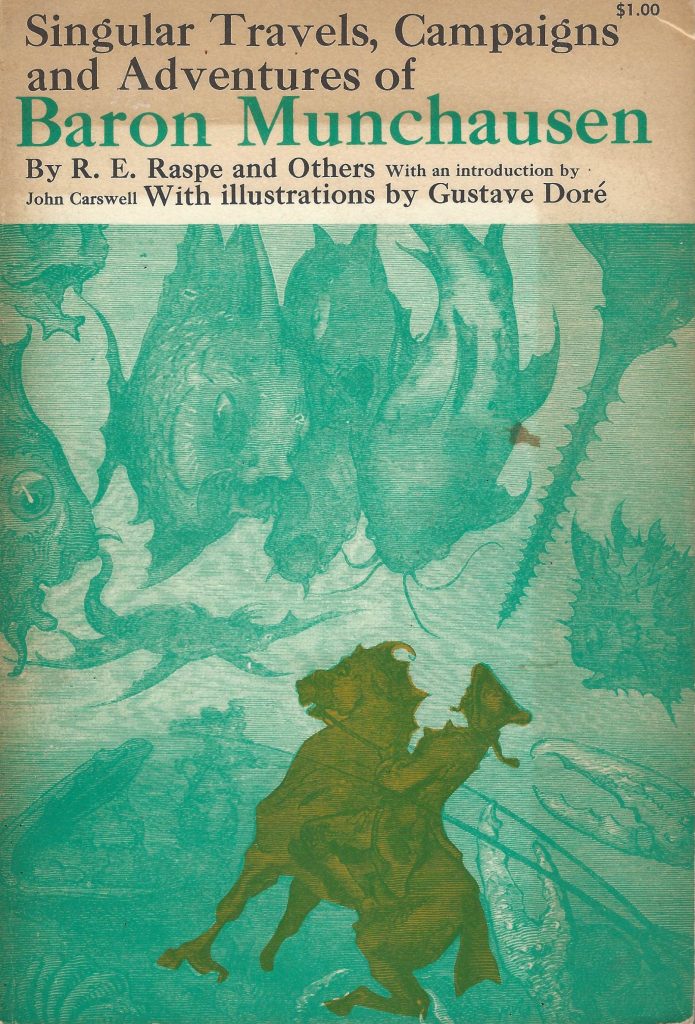 3.Singular Travels, Campaigns and Adventures of Baron Munchausen by R.E. Raspe and Others, 1948
3.Singular Travels, Campaigns and Adventures of Baron Munchausen by R.E. Raspe and Others, 1948
Think carefully before you answer — who is the greatest liar in history? You’re right, of course — it’s Baron Munchausen! In the picaresque novel by Rudolph Erich Raspe, first published in 1785, the nobleman is a nonstop raconteur, spinning stories of his adventures and exploits as a military man and world traveler. Such memoirs were fairly common in the eighteenth century, but few ex-soldiers ever (successfully!) wrestled a forty-foot crocodile, visited the moon by climbing up a beanstalk, rode a flying cannonball over enemy lines, or got swallowed by a great fish while bathing in the Mediterranean (Munchausen freed himself by dancing the hornpipe in the creature’s stomach, which caused it to thrash about and head for the surface, thus attracting the attention of a ship, which harpooned it, hauled it on board, and began cutting it up. “As soon as I perceived a glimmering of light I called out lustily to be released from a situation in which I was now almost suffocated. It is impossible for me to do justice to the degree and kind of astonishment which sat upon every countenance at hearing a human voice issue from a fish, but more so at seeing a naked man walk upright out of his body: in short, gentlemen, I told them the whole story, as I have told you, whilst amazement struck them dumb.”) The actual Baron Munchausen, who fought for Russia in various campaigns against the Turks, spent his retirement entertaining people by telling tall tales about his exploits. Raspe heard some of these yarns and put them into his book along with other outrageous lies of his own invention, which infuriated and humiliated the real Baron, who was driven into seclusion by the ridicule of all Europe. To think that sheer embarrassment could make someone retire from public life; 1785 was a long time ago, was it not? (If you want to read these wildly entertaining adventures, make sure you get an edition that has the original illustrations by Gustave Doré; they are just as funny and delightful as the Baron’s fabulations.)
4. The Iron Dream by Norman Spinrad, 1972
Alternate-history stories come in many varieties, from The Man in the High Castle to Bring the Jubilee to Pavane to Harry Turtledove’s infinitely expanding oeuvre, but few of them are as audacious and original as Norman Spinrad’s foray into the genre, The Iron Dream. The inside-cover blurb lets you know what you’re in for: “Let Adolf Hitler transport you to a far-future Earth, where only FEREC JAGGAR and his mighty weapon, the Steel Commander, stand between the remnants of true humanity and annihilation at the hands of the totally evil Dominators and the mindless mutant hordes they completely control.” That pretty much sums up the plot of the novel (which, once you get past the book’s cover, actually turns out to be titled Lord of the Swastika), and the alternate-history aspect is taken care of by an “About the Author” note at the beginning of the book and an “Afterword to the Second Edition” at the end, purportedly written in 1959 by a New York University academic named Homer Whipple. The bio tells us that after serving in the Great War and briefly dabbling in “radical politics”, Adolf Hitler emigrated to New York in 1919, where he first became a successful science fiction illustrator (for Amazing, no less) and then a science fiction writer himself, the author of such classics as Savior from Space, The Thousand Year Rule, The Master Race, and Tomorrow the World. In the afterword, Whipple chronicles Hitler’s literary career up until his death in 1953, afterwards analyzing Lord of the Swastika and finding in its fetishistic imagery the source of the book’s lasting appeal to hardcore science fiction fans, who awarded Hitler a posthumous Hugo in 1954… so what we have here is not a novel about an alternate history — it’s a novel from an alternate history. How is Lord of the Swastika? (Spinrad reportedly wanted the book to be published under that title, with only Hitler’s name on the cover, but was stymied by his publisher.) Well, based on my own reading about Der Führer (primarily the Bullock and Kershaw biographies, Speer’s memoirs, and Richard Evans’ history of the Third Reich), Spinrad is disquietingly successful at transmogrifying Hitler’s pathological obsessions and rigid, paranoid worldview into pulp science fiction, and one of the most remarkable things about the book is its uncomfortably pointed demonstration of how perfectly the themes and devices of pulp sf suit a violent, authoritarian imagination. In any case, being locked up inside Adolf’s head, even for satirical purposes, isn’t all that enjoyable, and well before the book ends, distaste begins to outweigh novelty, and you’re eager for the “author” to… well, blow his brains out. Spinrad may have been just a little too clever, and The Iron Dream might be one of those books that would be twice as effective at half the length. Still, it’s quite a ride, and I can’t think of another novel like it.
5. Spider Kiss by Harlan Ellison, 1961
Harlan Ellison was one of our best short story writers, but he produced only a few genuine novels. Among that handful, though, is one of his best works, his rock-and-roll novel Spider Kiss (which was originally published by Gold Medal — the mark of quality! — as Rockabilly). Country boy Luther Sellars has an abundance of musical ability and a limitless desire to push, claw, and gouge his way to the top, a vicious, elemental drive unmediated by any trace of scruple. After changing his name to Stag Preston, he succeeds in climbing to the pinnacle of pop music success, becoming the idol of millions. Stag’s unholy combination of ferocious ambition, demonic talent, and unbridled appetite (especially his sexual one) finally lead to his downfall, and after his scandalous excesses (which include some genuine and serious crimes) send him careening to the bottom, he ends his days playing is a sleazy strip joint, far from the big money and the bright lights, mercifully forgotten. Ellison clearly knew the great 1957 Elia Kazan film A Face in the Crowd, in which Andy Griffith excels as Larry “Lonesome” Rhodes, a folksy entertainer whose good old boy demeanor conceals a very nasty streak and who plays out a rise-and-fall story very similar to Stag’s. Stag is, if anything, even worse than Rhodes, and the book is a riveting portrait of a driven and near-sociopathic personality. Ellison later retrofitted many elements of Stag’s character and story onto his script for the 1966 film The Oscar (in which the amoral user is an actor named Frank Fane), a movie so godawful it’s divine.
6. 85 Days: The Last Campaign of Robert Kennedy by Jules Whitcover, 1969
We’ve gotten used to some wild presidential elections over the last decade and a half, but few campaigns in American history were as chaotic, divisive, and ultimately tragic as the one all the way back in 1968. When President Lyndon Johnson announced that he was not going to run for re-election, Robert Kennedy at first publicly said that he wasn’t going to seek the nomination himself, a decision that went against all of his political instincts. It galled him to leave the field to Hubert Humphrey (Johnson’s vice-president and a man likely to continue LBJ’s war policies) and the upstart anti-war candidate Eugene McCarthy, but when McCarthy’s surprising early success showed the potential strength of an anti-Vietnam War candidate, Kennedy threw his hat into the ring. A frantic campaign followed, with RFK scrambling to put together an organization, enter primaries, and make up an enormous amount of lost ground. Along the way, Kennedy earned the animus of McCarthy (for stealing his thunder — and his young, anti-war voters) and Johnson (for opposing his policies), made Kennedy history by losing one primary (Oregon), gained some momentum by winning others (South Dakota, Nebraska), and was called on to help the country weather the shock of the Martin Luther King jr. assassination, a bare eight weeks before his own death at the hands of Sirhan Sirhan on the night he won his greatest victory in California — all in eighty-five days (three weeks less than Vice President Harris had in her own truncated campaign). Whitcover’s book is a definitive account of one of the most dramatic political contests in our history, a kind of combat-photographer snapshot taken at a moment when the country seemed hurtling toward the apocalypse — and not for the last time.
7. The Last Policeman Trilogy (The Last Policeman, Countdown City, World of Trouble) by Ben H. Winters, 2012-2014
If you think things are bad now, take heart — they could be worse. The world could be ending literally rather than metaphorically; there could be a ginormous asteroid on a collision course with earth that will extinguish human civilization on impact, which is the situation faced by Hank Palace at the beginning of The Last Policeman trilogy. The first volume, The Last Policeman, begins with the asteroid (named “Maia”) still six months away and the chances of impact rising but still less than one hundred percent. Before the end of the book, doom has become a mathematical certainty and Palace and everyone else on earth are faced with the Big Question — what do you do when everything is coming to an end? You keep doing your job, of course; it’s that or go crazy in one of a thousand different ways. There’s no shortage of people going that route, but Palace chooses the first option; despite knowing how ultimately futile his efforts are, he continues to get up every morning and show up for work as a Concord, New Hampshire police detective, spending his dwindling stock of days trying to keep his small part of the world from falling to pieces. Through the course of the three books, Palace investigates murders (in a world where the innocent and the guilty alike are about to experience maximum punishment) and a strange disappearance (in a world where increasing numbers of people are walking away from the rubble that’s all that’s left of pre-Maia society) and most personally, trying to find his troubled sister Nico, who has vanished into the chaos; he has some things to settle with her before the end. What does any of it matter? Well, Winters has said the theme of the trilogy is, “Why does anybody do anything?” Each volume (almost each chapter in each volume, in fact) is more involving than the one that preceded it (increasing tension is built into the premise) and aside from being a gripping read, the series really does prompt reflection on the meaning of human actions when the actors are faced with unavoidable death — which we all are, asteroid or no asteroid.
8. 1876 by Gore Vidal, 1976
Electoral chicanery is as old as the republic itself, and who better to describe perhaps the greatest example of it in our history than Gore Vidal, America’s premier historical novelist? In this, the third novel in his six-volume Narratives of Empire series (following Burr and Lincoln in internal chronology), Vidal fictionalizes the centennial election of 1876, when the presidency was stolen from the Democratic candidate Samuel Tilden (remember him? Of course you don’t!) by the Republican Rutherford B. Hayes, or at least by his faction. Post-Civil War bitterness (the tactic of “waving the bloody shirt” to brand all Democrats as crypto-Confederate traitors reached new heights during the contest) led to outrageous underhandedness and outright fraud across multiple states. In South Carolina, for example, 101 percent of all eligible voters voted (take that, electoral apathy!) and many of the things that we’ve become drearily familiar with reared their ugly heads, such as disputed electors, confusing or deceptive ballot designs, and rancorous squabbles about the counting and certifying of electoral votes. With Inauguration Day approaching and the results a snarl beyond untangling, Congress headed off increasing financial and political chaos (to say nothing of threats of violence — Hayes’ home was shot at shortly after Election Day) by creating a special bipartisan electoral commission to reach some kind of resolution, with the result that the Republican candidate became the nineteenth President of the United States… by one electoral vote. (Tilden’s consolation prize was winning the popular vote; I’m sure that kept him warm at night.) All of Vidal’s virtues are on display here; no one depicted drawing-room politics (or any other kind, for that matter) with more elegant irony or acerbic wit. This Jamesian comedy of manners has the kind of effortless style that makes it easy to miss the cold-steel scalpel in the author’s hand, and he uses the knife to mercilessly dissect the corruptions and hypocrisies of Hayes’ and Tilden’s time, and, by implication, our own.
9. The Autumn of the Patriarch by Gabriel García Márquez, 1975
In The Autumn of the Patriarch Gabriel García Márquez uses the techniques of magical realism that he employed in One Hundred Years of Solitude to portray the life and (maybe) death of the archetypal figure of a military tyrant or Caudillo, embodied in a nameless Caribbean dictator. Instead of using the tools of objective realism to depict the surface of his dictator’s reign, García Márquez employs symbol, metaphor and dream to place us in the lightless mind of his radically isolated protagonist. The book (the English translation is by Gregory Rabassa, who also did the magnificent translation of One Hundred Years of Solitude) is not for the faint of heart — it has one sentence that’s fifty pages long. Most of the novel consists of a stream of consciousness that runs so deep you can easily drown in it, but the method yields dividends that couldn’t have been gained in any other way; in one extraordinary, hallucinatory scene, in his greed and callousness the monomaniacal “General of the Universe” (his official title) sells off the Caribbean Sea to the Americans who keep his regime propped up; the Gringos send helicopters to fly off huge sections of the Sea, which has been cut up into numbered squares, leaving only a desiccated, sea-bottom desert behind. The book exuberantly chronicles the General’s flagrant excesses — political, military, familial, financial, rhetorical, sexual — but García Márquez’s greatest triumph is that his art moves us beyond mere externals, imprisoning us in the free-floating abattoir that must have been the mind of a Somoza, a Stalin, a Franco, a Mao.
10. Advise and Consent by Allen Drury, 1959
Though the current confirmation battles roiling the Hallowed Halls of the Capitol may seem especially contentious and nasty, the process of getting even a mildly questionable nominee through the Senate has always been a bloodsport. If you doubt that, just read Allen Drury’s Pulitzer Prize-winning novel, Advise and Consent. (The title comes from Article II, Section 2, of the Constitution, which gives the President the power to appoint various federal officers and officials with the “Advice and Consent of the Senate.”) When liberal golden boy Robert Leffingwell is nominated by the president for Secretary of State, the confirmation process is expected to go smoothly, and it does — until a witness surfaces with evidence that Leffingwell had once been a communist (a charge that the nominee has unequivocally denied under oath). Those in favor of Leffingwell (a group that still includes the president) and those opposed to him begin to frantically maneuver for advantage, working night and day to discredit whatever evidence and witnesses are presented by the other side. Before the drama’s end, the president himself will be involved in blackmailing Utah Senator Brig Anderson, who has proof that Leffingwell’s testimony was a lie. Anderson had a homosexual encounter in his past, and the prospect of that incident becoming public knowledge drives him to commit suicide in his Senate office (a plausible outcome in 1959 — and something very much like it had actually happened in 1954). In the wake of this tragedy, the evidence against Leffingwell gets out, along with the president’s role in its suppression, with the result that the nomination goes down to a decisive defeat. Allen Drury (whom Richard Nixon believed to be secretly gay himself) was a seasoned Washington reporter who knew all the back-room details of how the sausage was made, and after over sixty years, Advise and Consent still deserves its reputation as one of the greatest of American political novels. Drury must have agreed — he wrote five more books carrying the story and characters forward into a shrewdly speculative political future. Otto Preminger directed an excellent film version in 1962, with Henry Fonda as the flawed nominee and Charles Laughton (in his final role) as Senator Seab Cooley, Leffingwell’s most intractable opponent.
11. The Loneliest Campaign: The Truman Victory of 1948 by Irwin Ross, 1968
Everyone loves an incredible comeback staged by a tenacious underdog, right? Well, um… maybe not everybody. But if you crave a candidate wielding a pugnacious (and sometimes profane) campaigning style to present himself as a battler for the common man against out-of-touch elites, if you delight in baffling and egregious polling errors, if you yearn to see a complacent national press stunned by an unexpected outcome that they find simply incomprehensible, then have I got a story for you! No, not that one; it’s not necessary to look back just a month or two, because our grandparents (or great-grandparents!) saw it first back in 1948, when Harry Truman, unanimously written off by the media as a comically inept buffoon, came roaring from behind to defeat supposed shoo-in Thomas E. Dewey for the presidency. Truman, the low-class ward-heeler, the Missouri machine politician who was tapped for vice-president when Franklin D. Roosevelt decided to jettison his previous running mate, the increasingly problematic Henry Wallace, became president when FDR died three months into his fourth term. Shackled by foreign policy problems and an unstable economy, Truman (often derided as “His Accidency”) ended his slightly-shortened first term with near-historically low approval ratings. Good thing polls are never wrong. Dewey, brimming with confidence, decided that it wasn’t necessary to win the presidency; he just had to be careful not to lose it. He therefore confined himself to bland, noncommittal statements that were so general as to be essentially meaningless. The Louisville Carrier-Journal mercilessly (but accurately) said that Dewey’s major speeches “can be boiled down to these historic four sentences: Agriculture is important. Our rivers are full of fish. You cannot have freedom without liberty. Our future lies ahead.” Truman, meanwhile, fought his way off the ropes with a no-holds-barred, bare-knuckle exuberance that, fairly or not, laid all of the country’s ills squarely at the feet of Dewey’s Republican Party. When the dust settled, Harry Truman had won one of the unlikeliest second terms in American history, though it’s probably dropped from first place to second in that regard. The Loneliest Campaign is an engaging look at one of the most colorful presidential contests ever, and the book’s conclusion, written in 1968 about the election of 1948, is just as valuable today: “In the end, the most salutary consequence of 1948 was probably a renewed awareness of the contingent quality of events, of the unpredictability of both leadership in a democracy and of the choices that voters make in the privacy of the voting booth. Not for a long time afterward were politicians likely to take the American voter for granted.” We can hope that recent events have provided a much-needed refresher course in that uncomfortable truth.
12. The Road by Cormac McCarthy, 2006
What do you do when nothing is left of all that you and those who went before you have built but charred rubble and blackened ashes? You hold on tightly to the one most precious to you and make your way through whatever lies ahead one day at a time, trying to keep alive a spark of belief that one day, things will get better. In Cormac McCarthy’s post-apocalyptic novel, a father and a son (we never learn their names; in this place names are needless encumbrances, relics of a dead past) painfully make their way through a shattered world, looking for somewhere they can rest and find peace, knowing that such a place almost certainly doesn’t exist. We don’t know what happened to the world and neither do they. What does it matter? The only reality is trying to keep their bodies and souls alive in a world implacably inimical to both. Most of the devices of the standard post-apocalyptic story are here, images and incidents that have become familiar (even shopworn) through their use in countless books, movies and television shows: searching for uncontaminated water or a slightly better piece of clothing, picking through dead buildings for canned food, exchanging a word or two with other scarecrow-like wayfarers, the dazed, the dead-eyed, the demented, and hiding from other creatures that were once human but that the universal catastrophe has rendered nothing but feral beasts without mercy or compassion. As they push their shopping-cart (their most precious possession, bearing the few pitiful belongings that are everything they own) through this hellscape, “carrying the fire” (an image for preserving and protecting the human that recurs through much of McCarthy’s work), the vision is almost unendurable in its pitiless extremity — but only almost. It is true that no blows are softened, but we are kept going by two things: the bleached beauty of McCarthy’s extraordinary prose and the desperate love of the father and son, who are, quite literally, all the world to each other. Along the way, we get things no other writer could have given us, like the scene where the pair briefly take refuge in a well-stocked underground bunker that they discover, where the father gives his child a drink, a draught from a world and a life that have vanished forever — Coca-Cola. The father’s delight at his son’s stunned amazement at this drink that seems almost alive, followed immediately by his sadness at knowing that his boy will never taste it again, are emotionally overwhelming, as is the book as a whole. The Road will make you weep; it will make your heart ache unbearably before breaking it in pieces, but this bleak journey ends with the fire still burning; at the end, against all odds, the father has passed the flame on by saving his son, and when you finish this remarkable novel, you will feel that light and heat burning anew in yourself.
Of the twelve books I’ve listed here, only The Loneliest Campaign is currently out of print, but it’s relatively easy to find used on Ebay or from other sources; the other books are all readily available in physical or electronic formats.
So, (again repeating my words of eight years ago), “there you have it: a dozen histories, actual and alternate, maps of action or aids to contemplation, to help you get through all the days of farce and folly that lay ahead, as we do our best to cope with the real history that we’re all trapped in.”
Oh, one more thing — I’m damn sure not doing this again in 2028 (or, God help us, 2032)!
Thomas Parker is a native Southern Californian and a lifelong science fiction, fantasy, and mystery fan. When not corrupting the next generation as a fourth grade teacher, he collects Roger Corman movies, Silver Age comic books, Ace doubles, and despairing looks from his wife. His last article for us was Say It Ain’t So
In Defence of Purple Prose
 Image by Gerd Altmann from Pixabay
Image by Gerd Altmann from Pixabay
Good afterevenmorn, Readers!
Language is fun. The way words can mean more than one thing, depending on where the stress is placed, or its location in a sentence, and where that sentence lies within the tale. It is a playground. A song devising its own music. A melody murmured that can delight not just the eyes, but the ears. How many have paused a read simply to revel in the words just read? To read and reread a sentence? To bask in the brilliance of a cleverly turned phrase?
 Image by Лариса Мозговая from Pixabay
Image by Лариса Мозговая from Pixabay
Yet so many decry the joy in that play. Brevity, they proclaim, is king. Only he shall rule the pages, painted words slinking away beneath his stern gaze. That is good writing. The only good writing.
In truth, he is but a soldier, which, like his fellows, when craftily deployed becomes a part of a larger song. The short notes like bombs, delivered with precision to inspire fear, or awe. To drag at the breath, stealing it away. To raise the pulse; a rapid fire of words – rat-tattat-tat!
Ah! But the exhaustion of battle needs reprieve. Across the trenched-scarred fields where fearful clouds of pale green gas linger still, hugging the ground as a jealous devotee, there must be some tenderness. Some beauty. Some gentle caress that reveals a painted sky, a lone flower refusing to bow before the fire, to linger ever so longingly on a lover’s heart.

These, too, deserve their time to shine. To dance in the light. Frivolous! come the cries. Pointless! Indulgent! Foolish! What purpose could frills and silks fill that isn’t achieved with more utilitarian cloth?
Beauty, my loves. Beauty is the point. To paint with words. To make poetry of prose. To fill the pages with images that transcend description. To make the words felt instead of merely read. To revel in the wonder of words, and the music they can make if we indulge them ever so slightly. For, before they were written, they were said; every syllable deliberately placed to please, to create a rhythm, to dance with the flames beside which they were uttered.
There is no crime in returning to that fire, though the words reach an audience of naught but one. In reclaiming that dance. In revealing the beauty of words and the myriad of ways they can be put together.

Play, my dears. Play is the point. What fun to toy with meaning and expectation, to weave and weft! To delight in triplets trickling from tickled tongues. To find the fun; to splash in the sun-dappled stream of language and chase the meanings swimming lazily beneath the surface. For language can be such a joy if we let it, if we break free from the tyranny of Brevity for its own sake.
There is no sin in letting the words play. In delighting at their twisting, joyous clamour. To dance with them their strange magical rites.

So many tangled tales have been met with distaste from one, only to be adored by another. Many a phrase has stopped an artist in their tracks, struck by the beauty, only to be scorned by the scholar.
In truth, there is no proper way to present prose. Dance or do not. Play or do not. Let the tyrant Brevity reign over the page, or place him back down into the ranks to work in concert with his fellows, or abandon him altogether. It is all correct. It is all true. It is all right.
But turn not away from the colour purple because some fool said you must. Like Brevity, it has its place and its purpose, even if that purpose is simply to be frivolous, existing for nothing else but the music it makes.
Or maybe even to inflate a word count. Ahem.
Alright, I’m done playing now. Mostly. Though I’ve been terribly tongue-in-cheek with this post, the sentiment is true. I do love reading books where the author has permitted themselves to revel in the language they use; when it’s clear that they’re going not for strict adherence to the rules and order, but to create an image, to paint, to evoke an emotion.
Yes, learn the rules. Of course.
And then smash them to pieces.
Is it possible to mess it up? Yes. Perhaps it doesn’t quite work. But that’s the wonderful thing about words. They’re much like painting in oils. You can massage the colours, work them across the canvas until they form the pleasing shapes you were aiming for. Or simply scrape teh canvas clean and start again. But don’t be so afraid of messing it up that you never attempt to paint at all. Take the time to play with words. Have fun.
Know that there will be a reader who will love your “purple” prose. It will likely be me, since I love how wonderful and musical language can be.
What about you? What writing styles do you like? There are no wrong answers in this case, only differing opinions. And I love hearing them!
When S.M. Carrière isn’t brutally killing your favorite characters, she spends her time teaching martial arts, live streaming video games, and cuddling her cat. In other words, she spends her time teaching others to kill, streaming her digital kills, and a cuddling furry murderer. Her most recent titles include Daughters of Britain, Skylark and Human. Her serial The New Haven Incident is free and goes up every Friday on her blog.
Beware of Greeks Bearing Gifts (and giant wooden horses. I mean, seriously!)
 The story of Troy has been my favorite myth since I was a little kid. Greek mythology is far and away my favorite (Norse is a distant second), and I used to check Bullfinch’s out of my grade school library and lug it home. That was a relatively big book. I have my own copy now, of course.
The story of Troy has been my favorite myth since I was a little kid. Greek mythology is far and away my favorite (Norse is a distant second), and I used to check Bullfinch’s out of my grade school library and lug it home. That was a relatively big book. I have my own copy now, of course.
The worst part, is I always root for the Trojans. It never ends well for them. If they had just listened to Laocoon. Though, Athena definitely made that a dangerous proposition…
I’ve used a couple names from Thieves World over the years, in various online RPGs. But hands down, the Iliad has been my main source. Hector, and some variation of Astyanax (I prefer it with more ‘N’ or ‘X’, has far and away my favorite names for fighters (especially paladins). I’ve used a few others, like Penthesilia, Cassandra, and Deiphobus (Helenus just doesn’t work for me).
Way back in pre-Windows days (I think), there was a really cool computer game that included a Troy section. I think you were Jason with his Argonauts, roaming the world. Age of Empires II (man, I played the heck out of that) included a Troy campaign (except I had to sack Troy. Sniff, sniff). There’s a Total War: Troy (kind of a scaled down TW game) that I don’t have yet. You might have read over the past couple weeks that I’m a huge Total War: Warhammer I/II fan.
I don’t do the Assassin’s Creed series, butt there was an Odyssey game, recently. The Odyssey is essentially a sequel to The Iliad. As is Virgil’s The Aeneid.
I read a few translations over the years. But the only version I do now is Robert Fagles’ audiobook. Which, unfortunately, is abridged. I always try to get unabridged versions of books. But for some reason, they never did an unabridged for Fagles. I don’t know what got left out, but it still totally works for me.
I talked about it here, and Derek Jacobi is absolutely FANTASTIC. Probably the best-read audiobook I’ve ever listened to. They had Ian McKellen do Fagles’ Odyssey, and Simon Callow read The Aeneid (Callow is number two, with McKellan still good, but third). Jacobi is nothing short of brilliant.
As I’ve talked about here at Black Gate before, audiobooks let me get to things I otherwise would not read. Old, and new. About once a year, I listen to The Iliad CDs in my car, during the work commute. Some years, I follow it up with The Odyssey. I don’t do The Aeneid that often, but I have listened to it more than once.
The Iliad and The Odyssey are believed to be written not very long apart; both in Greek. As with some of Paul’s Epistles, some think Homer did not author both. I’m just gonna go with ‘Yes, he did.’ The Aeneid as written some six centuries later, in Latin.
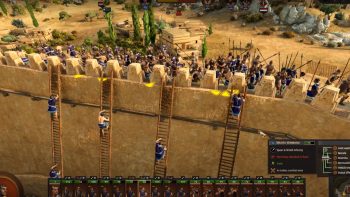 Highly recommend Fagles’ translation, with Jacobi’s reading. I have him doing some Sherlock Holmes and it’s okay. But he slays The Iliad.
Highly recommend Fagles’ translation, with Jacobi’s reading. I have him doing some Sherlock Holmes and it’s okay. But he slays The Iliad.
The Iliad ends with Hector’s funeral games. Homer recounts some of the events after – including that frigging horse – in The Odyssey.
There were other poems by other poets, about The Trojan War. For example, Arctinus of Miletus wrote the five-book Aethiopis. It started right after The Iliad ended, with the arrival of the the Amazon Queen, Penthesileia
There are six additional poems, but sadly, they’re lost. About thirty lines of Lesches of Pyrrha’s Little Iliad is the largest surviving excerpt of these lost Ilios stories. Along with The Iliad and The Odyssey, they make up The Epic (or Trojan) Cycle. Click here for a short look at the lost poems.
I bought Heinrich Schliemann’s Ilios decades ago. It is not exactly light reading. The Mortal Hero is a nice intro to The Iliad, and I recommend that for somebody wanting to dig into it, without actually reading the epic. Though I think should read Homer.
The Brad Pitt movie, Troy, was a big-budget telling of the story. It took out all the mythology. Maybe that made sense from an on-screen perspective, but I was disappointed. It’s an okay movie. I waited a long time for somebody to make Troy, and to make 42 (the Jackie Robinson story). I much prefer the latter.
I tried to sit through the 2018 mini-series, Troy: Fall of A City. What an unwatchable load of garbage.
On my ever-growing ‘To Write About’ list here at Black Gate, is Rex Stout’s The Great Legend. Stout, of course, created Nero Wolfe, who I have written about extensively here at Black Gate. He took the gods out of the picture, and told an alternate story. I like it.
Stephen Fry has written three apparently ‘different’ books on Greek mythology, with book three on Troy. I’m not interested, and haven’t checked them out.
I’m listening to Barry Strauss’ 2007 book, The Trojan War: A New History. The reader’s voice doesn’t do much for me so it’s gonna be a slow almost 9 hours, but it’s interesting enough, an hour in.
An idea I’ve had,which I won’t commit the time and effort to, is a daily FB series. I would post amusing (to me) daily updates from some embedded poet/journalist:
“And we’ve landed on a rather nice beach. I imagine we’ll wrap this up in a week or two and head back home.”
Or maybe a foot soldier in the Greek ranks:
“Man, Achilles was in a foul mood this morning. That guy needs to lighten up.”
So, this has just been some rambling on something I’ve been interested in for most of my life.

Bob Byrne’s ‘A (Black) Gat in the Hand’ made its Black Gate debut in 2018 and has returned every summer since.
His ‘The Public Life of Sherlock Holmes’ column ran every Monday morning at Black Gate from March, 2014 through March, 2017. And he irregularly posts on Rex Stout’s gargantuan detective in ‘Nero Wolfe’s Brownstone.’ He is a member of the Praed Street Irregulars, founded www.SolarPons.com (the only website dedicated to the ‘Sherlock Holmes of Praed Street’).
He organized Black Gate’s award-nominated ‘Discovering Robert E. Howard’ series, as well as the award-winning ‘Hither Came Conan’ series. Which is now part of THE Definitive guide to Conan. He also organized 2023’s ‘Talking Tolkien.’
He has contributed stories to The MX Book of New Sherlock Holmes Stories — Parts III, IV, V, VI, XXI, and XXXIII.
He has written introductions for Steeger Books, and appeared in several magazines, including Black Mask, Sherlock Holmes Mystery Magazine, The Strand Magazine, and Sherlock Magazine.
Half a Century of Reading Tolkien: Part Two – The Fellowship of the Ring by JRR Tolkien
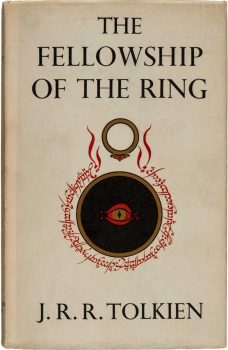 ‘I will take the Ring,’ he said, ‘though I do not know the way.’
‘I will take the Ring,’ he said, ‘though I do not know the way.’
Frodo from The Council of Elrond from The Fellowship of the Ring (1954)
I never saw it, but once upon a time, some hippies and ancillary types were given to emblazoning FRODO LIVES on bedroom walls and the backs of denim jackets. The Lord of the Rings, the literary creation of a conservative Oxford University professor of English Literature and Language, had somehow hit a chord with the nascent counterculture after its publication in 1954/1955. I imagine, in fact, I know, there are all sorts of popular and academic works purporting to explain why this was. I’ve never been interested in them, preferring the books themselves to present the professor’s ideas.
I have my own, if not particularly original, theories. First, it’s a great adventure story featuring a small, ineffectual-seeming hero who stands up to his world’s greatest force of evil. Second, it came to be seen as a sort of rallying cry against the dark powers of the modern world. I don’t know Prof. Tolkien’s politics, though I suspect he was a small-c conservative. It’s clear he viewed the loss of tradition and the dark Satanic mills blotting out the green and pleasant England of his youth were a terrible assault on civilization (this anti-modernist attitude is an important element of Michael Moorcock’s disdain for him). Third, the counterculture’s love for anything pastoral and ante-technological was probably the most important reason for its breakout into the mainstream’s consciousness.
I never discussed it with him, but I feel confident when writing that my father liked The Lord of the Rings primarily for the first reason and somewhat for the second (he was very much a BIG-C conservative) a bit. He most definitely did not like it for the last. When I first read it all that mattered to me was that first reason. With every revisit over the ensuing decades, I’ve discovered something new. That has carried on with my most recent reread.
For the handful of uninitiated out there, The Fellowship of the Ring (comprised of two books, Book I: The Ring Sets Out and Book II: The Ring Goes South), tells of the discovery that the magic ring Bilbo Baggins found in The Hobbit is really the single most evil artifact in the world and the start of the quest to destroy it. Bilbo’s heir, Frodo, and his gardener, Sam Gamgee, at the advice of the wizard Gandalf, set out for Rivendell. Following up on his suspicions about the ring, Gandalf spent over a decade hunting down the true nature of the ring. Finally, he determined Bilbo’s ring was the One Ring, the thing by which the Dark Lord (probably the first of such figures in fantasy fiction), Sauron, could seize control of all Middle-earth.
The four hobbits encounter numerous obstacles along the road to Rivendell of increasing peril. The most dangerous is their pursuit by the Nazgûl (Ring Wraiths). They are Sauron’s greatest servants, corrupted ages ago by lesser rings he made for Men.
In Rivendell, a plan is devised to destroy the Ring by dropping it in Mount Doom, the volcano it was originally forged in and the only thing that can destroy it. A party of nine, chosen from representatives of the different races of Middle-earth and led by Gandalf, set out toward the Dark Lord’s land, Mordor. Of course, things start going wrong right away. Before The Fellowship‘s end, two of the nine companions are dead, and the rest are split into three separate groups. I’ll leave it there. If you’ve read the books, you can fill in the blanks and if you haven’t, well, go fix that giant gap in what you’ve read.
 Moria by Alan Lee
Moria by Alan Lee
The book remains as enthralling to me as did when I first read it nearly fifty years ago. It’s filled with numerous scenes that filled me with awe on the first encounter that has never left me over the years. There are the monolithic Argonath, statues of ancient kings, standing watch over the borders of the kingdom of Gondor and the tree city of Caras Galadhon. The most striking thing was the ancient dwarven city of Khazad-dûm. I knew dwarves lived underground, but I hadn’t imagined anything like Moria. Like the nine companions, the readers are only given glimpses of Moria’s dark passageways, but they’re enough to convey its massiveness and harsh beauty.
Gandalf seemed pleased. ‘I chose the right way,’ he said. ‘At last we are coming to the habitable parts, and I guess that we are not far now from the eastern side. But we are high up, a good deal higher than the Dimrill Gate, unless I am mistaken. From the feeling of the air we must be in a wide hall. I will now risk a little real light.’
He raised his staff, and for a brief instant there was a blaze like a flash of lightning. Great shadows sprang up and fled, and for a second they saw a vast roof far above their heads upheld by many mighty pillars hewn of stone. Before them and on either side stretched a huge empty hall; its black walls, polished and smooth as glass, flashed and glittered. Three other entrances they saw, dark black arches: one straight before them eastwards, and one on either side. Then the light went out.
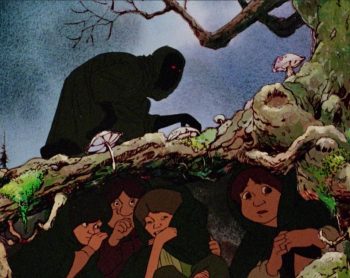 Ralphi Bakshi’s rotoscoped Ring Wraith and the hobbits
Ralphi Bakshi’s rotoscoped Ring Wraith and the hobbits
This time around, the outward journey of the hobbits, Frodo, Sam, Merry, and Pippin, from the bucolic seclusion of the Shire, by degrees, into the wider, wilder world they have been largely unaware of caught my eye. The first encounter occurs while still in the Shire when they hear the sound of hooves coming along the road.
The hoofs drew nearer. They had no time to find any hiding-place better than the general darkness under the trees; Sam and Pippin crouched behind a large tree-bole, while Frodo crept back a few yards towards the lane. It showed grey and pale, a line of fading light through the wood. Above it the stars were thick in the dim sky, but there was no moon.
The sound of hoofs stopped. As Frodo watched he saw something dark pass across the lighter space between two trees, and then halt. It looked like the black shade of a horse led by a smaller black shadow. The black shadow stood close to the point where they had left the path, and it swayed from side to side. Frodo thought he heard the sound of snuffling. The shadow bent to the ground, and then began to crawl towards him.
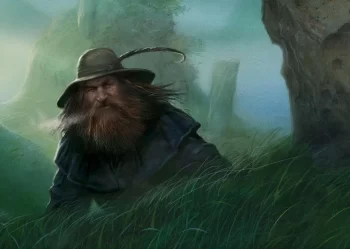 Tom Bombadil by John Howe
Tom Bombadil by John Howe
The second and stranger encounter occurs in the shadowed depths of the Old Forest. Once, many years ago, something from the Forest had somehow pushed back against the invading hobbits. In retaliation, the hobbits burned many of the trees and built a great hedge to keep the rest of them at bay. Once inside the dark woods, the hobbits are lured and trapped by an ancient, malicious willow tree only to be saved by one of the most divisive figures in fantasy – Tom Bombabil. Tom saves the hobbits again, as they continue away from their homes, and are trapped by evil spirits infesting ancient barrows. Their experience in the barrows gives visions to the hobbits, impressing on them the depths and width of the world outside their cozy borders.
This brings me to the second thing I paid more attention to on this reading: the moments of mystery and strangeness. Some hate Bombadil because he’s too frivolous. Others maintain he was just jammed into the story because Tolkien, who’d created the character for an earlier poem, liked him too much. I hold to the theory that for the whole first part of The Fellowship, Tolkien was feeling his way into the story, letting events grow spontaneously and I love the character, silly songs and all.
In the seemingly areligious Middle-earth (that’s a complicated bit of business for some other time, perhaps), Bombabil feels distinctly divine. He is married to the daughter of the river, “knew the dark under the stars when it was fearless – before the Dark Lord came from Outside,” and sings down the very stones of the haunted barrow. When asked about him, Tolkien responded that he was “not an important person – to the narrative” and that “he represents something that I feel important, though I would not be prepared to analyse the feeling precisely. I would not, however, have left him in, if he did not have some kind of function.” He alone, of everyone in Middle-earth, is impervious to the power of the Ring. It doesn’t work for him and he has no desire to own it. I love that there is no explanation for him, an element that doesn’t find an explanation in any of the vast history Tolkien composed for Middle-earth. To quote his wife, when asked who he is, she simply replies, “He is.”
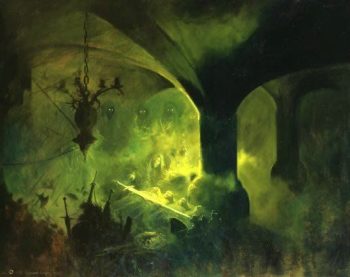 Barrow Wight by Paul Raymond Gregory
Barrow Wight by Paul Raymond Gregory
Being swallowed alive by a willow tree, evil or otherwise, is of course fairy tale strange. The haunted barrows and the capture of the hobbits by the barrow wights are more akin to the Germanic tales that partially inspired Tolkien. Trying to cross the downs, the hobbits find themselves imprisoned within one of the barrows. It is the eeriest point in the entire book, and could easily have been lifted from some skald’s ancient tale sung by the fireside.
As he lay there, thinking and getting a hold of himself, he noticed all at once that the darkness was slowly giving way: a pale greenish light was growing round him. It did not at first show him what kind of a place he was in, for the light seemed to be coming out of himself, and from the floor beside him, and had not yet reached the roof or wall. He turned, and there in the cold glow he saw lying beside him Sam, Pippin, and Merry. They were on their backs, and their faces looked deathly pale; and they were clad in white. About them lay many treasures, of gold maybe, though in that light they looked cold and unlovely. On their heads were circlets, gold chains were about their waists, and on their fingers were many rings. Swords lay by their sides, and shields were at their feet. But across their three necks lay one long naked sword.
Suddenly a song began: a cold murmur, rising and falling. The voice seemed far away and immeasurably dreary, sometimes high in the air and thin, sometimes like a low moan from the ground. Out of the formless stream of sad but horrible sounds, strings of words would now and again shape themselves: grim, hard, cold words, heartless and miserable. The night was railing against the morning of which it was bereaved, and the cold was cursing the warmth for which it hungered. Frodo was chilled to the marrow. After a while the song became clearer, and with dread in his heart he perceived that it had changed into an incantation:
Cold be hand and heart and bone,
and cold be sleep under stone:
never more to wake on stony bed,
never, till the Sun fails and the Moon is dead.
In the black wind the stars shall die,
and still on gold here let them lie,
till the dark lord lifts his hand
over dead sea and withered land.
He heard behind his head a creaking and scraping sound. Raising himself on one arm he looked, and saw now in the pale light that they were in a kind of passage which behind them turned a corner. Round the corner a long arm was groping, walking on its fingers towards Sam, who was lying nearest, and towards the hilt of the sword that lay upon him.
None of these moments make it into Peter Jackson’s film of The Fellowship of the Ring. They don’t serve the narrative thrust Jackson chose to focus on. What they do is help convey the transition of the hobbits — and the story — from the pocket world of the Shire to the real world, one beset by betrayal, ravaging armies, and supernatural evil. Taken together with the dangerous episodes, they serve as a sort of veil the hobbits, representatives of the traditional, insular England Tolkien loved, must pass through before the real quest — the one to destroy the Ring — can begin.
Which leads me to Jackson’s movie, The Fellowship of the Ring (2001). That’s in fact what started this whole undertaking. Even though I’m on record disliking the movies, I needed something on in the background while doing some work and something with swords and magic seemed the right choice. Within minutes I found my dislike bubbling up. Soon it was boiling over. The easiest solution was to just pick up the books and read them again — which I did.
The thing is, I kept watching the movie, quickly followed by the other two. It’s the closest I’ve come to really hate watching anything in my life. I’ll go into more detail when I get to The Two Towers and The Return of the King as they deviate the most from the books.
I don’t dislike the movies for things Jackson didn’t do. If Verdi can edit Shakespeare, Jackson can edit Tolkien. I understand leaving out all the things I described. While I think their elimination changes the nature of the story, removing them to speed up the film’s momentum makes cinematic sense. The movie is intended as an exciting, action-filled movie, not a travelogue. Characters are compressed or excised in service of fitting a large book onto the screen. It happens all the time, often quite successfully. And still, I dislike the movies.
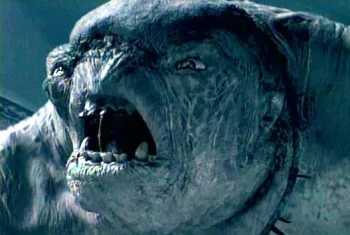 My easiest complaint is with filmmaking choices. First, are the moments of slow motion. Frodo getting stabbed and an uruk-hai running along a riverbank are the two moments that jump to mind most readily. They look cheap and terrible and stand out in a movie that lavished millions on looking good. Much worse is the fight and flight through Moria which becomes increasingly computer game-like as it proceeds. There is no architectural explanation that can possibly justify the staircase that collapses as our heroes are running down it. The battle in the book is much better choreographed and makes much more sense. Jackson’s camera work is skittery and nothing ever stays in a shot long enough to make much of an impression. The interaction between the characters and CGI troll looked fake twenty-plus years ago and only more so now. There are numerous other moments of interpretation I could argue about. Jackson always chose BIGGER and BOLDER, eschewing texture, subtlety, and atmosphere.
My easiest complaint is with filmmaking choices. First, are the moments of slow motion. Frodo getting stabbed and an uruk-hai running along a riverbank are the two moments that jump to mind most readily. They look cheap and terrible and stand out in a movie that lavished millions on looking good. Much worse is the fight and flight through Moria which becomes increasingly computer game-like as it proceeds. There is no architectural explanation that can possibly justify the staircase that collapses as our heroes are running down it. The battle in the book is much better choreographed and makes much more sense. Jackson’s camera work is skittery and nothing ever stays in a shot long enough to make much of an impression. The interaction between the characters and CGI troll looked fake twenty-plus years ago and only more so now. There are numerous other moments of interpretation I could argue about. Jackson always chose BIGGER and BOLDER, eschewing texture, subtlety, and atmosphere.
Tolkien’s Lord of the Rings isn’t devoid of humor. There’s Bilbo’s speech at his party and the discovery of the petrified trolls from The Hobbit. The thing is, there isn’t any slapstick. Not a bit. By which I mean especially pan-swinging, or dwarf-tossing. It’s awful and, like the slow motion, stands out in a movie that presents itself as a serious interpretation of a serious literary work.
My greater criticism is the film’s handling of the characters. Merry and Pippin are reduced to bad comic relief, instead of the clever conspirators who prove brave enough to maim and kill several orcs before Boromir is killed. Gandalf acts like a terrified fool in one moment and isn’t clever enough to solve the riddle to open the Gates of Moria himself. Boromir is more despicable seeming on the screen, instead of a man slowly being driven to madness by the Ring.
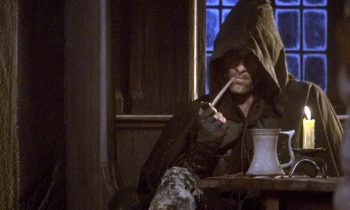 Most egregiously, Aragorn, born of an ancient line of kings, and raised to be a king, becomes a reluctant hero on the screen. We’re told he turned from the path of kingship long ago and later he says being king isn’t his goal. Aragorn is a man who has been a hero several times during his long life prior to the book, all for the purpose of opposing Sauron and restoring the kingship of a reunited kingdom. Finally, Elrond’s sworn he may only marry his daughter, Arwen, if he succeeds in his quest to become king.
Most egregiously, Aragorn, born of an ancient line of kings, and raised to be a king, becomes a reluctant hero on the screen. We’re told he turned from the path of kingship long ago and later he says being king isn’t his goal. Aragorn is a man who has been a hero several times during his long life prior to the book, all for the purpose of opposing Sauron and restoring the kingship of a reunited kingdom. Finally, Elrond’s sworn he may only marry his daughter, Arwen, if he succeeds in his quest to become king.
Instead of channeling the great heroes and chieftains of legend, Aragorn is reduced to, using one online site’s description, emo Aragorn. It feels like Jackson was incapable of believing someone could simply be portrayed as a hero, but needed to go on some sort of journey that almost forced him into choosing to be king.
There are loads of other things I don’t like about the movie. Most, though, are matters of taste, I suppose. Neither Viggo Mortensen nor Sean Bean are physically big enough or powerful enough for their roles. I don’t like many of the costumes, and I hate the portrayal of the hobbits as country bumpkins and Frodo is too young. The worst thing in the extended edition is the elf guard at Lothlorien’s five o’clock shadow.
I do like some things. Ian McKellen looks perfect. The Shire and the much of the wilderness countryside look like how I imagine they should. Galadriel taking on a terrifying visage when she imagines what she’d be with the One Ring is as exactly disturbing as it should be. Best of all, the death of Boromir, something that doesn’t come across as grandly tragic in the book as it should, is done brilliantly on the screen. That’s about it, though.
If this all seems a bit rambling, I’m sorry. Like last month, the spirit of Tolkien overpowered any original intentions I had. The result is this wandering around how The Fellowship of the Ring struck me on this tenth, or whatever it is, reading. I think I concentrated on those early chapters because excised from the movies, they are unknown to many who’ve never actually read the books. The book is much looser and messier than the movies and maybe that’s a reason I prefer it.
Fletcher Vredenburgh writes a column each first Sunday of the month at Black Gate, mostly about older books he hasn’t read before. He also posts at his own site, Stuff I Like when his muse hits him.
Roy Thomas and the Legacy of Conan the Barbarian
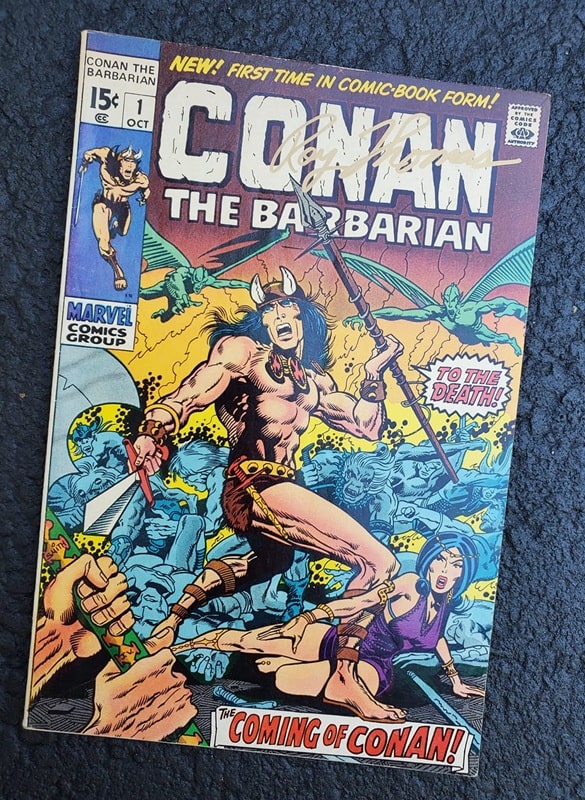 Conan The Barbarian #1 (Marvel Comics, October 1970). Art by Barry Windsor Smith
Conan The Barbarian #1 (Marvel Comics, October 1970). Art by Barry Windsor Smith
The package I received on July 6, 2020 brought me great joy! Roy Thomas is my favorite comic book writer. I correspond with him occasionally, and he is quite generous with his time, sharing his thoughts and memories. Very similar to how Gary Gygax did this, treating every fan with dignity and respect. A true gentleman.
I thanked Roy in my latest Hyperborea adventure book, The Sea-Wolf’s Daughter, because it included a character inspired by one of his creations. I sent him a copy of the book, and along with it my personal copy of Conan the Barbarian #1, to be signed by the author. Well, here it is! (He has an agency that normally handles this sort of thing, but he made an exception for me.) Excelsior!
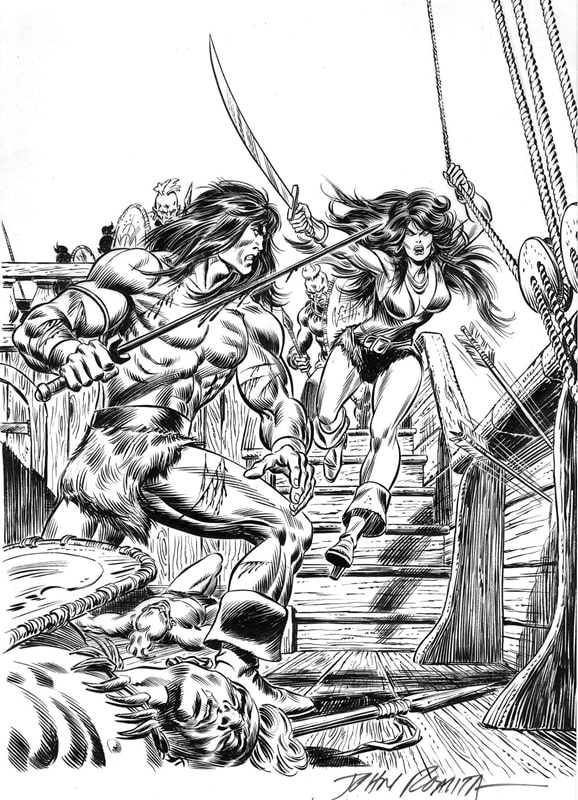 Cover art for Conan the Barbarian #58, by John Romita Sr., story by Roy Thomas (Marvel Comics, January 1976)
Cover art for Conan the Barbarian #58, by John Romita Sr., story by Roy Thomas (Marvel Comics, January 1976)
It is my humble opinion that of all the Conan pastiche writers, Roy Thomas is among the finest. But because he wrote in the comics industry, he’s often not afforded the same prestige as other Conan pastiche writers, such as L. Sprague de Camp, Lin Carter, Karl Edward Wagner, Robert Jordan, et al.
Thomas’ run starring Conan and Belit (the Queen of the Black Coast) started with this issue (#58) and concluded with the iconic issue #100. It is a treasure to read.
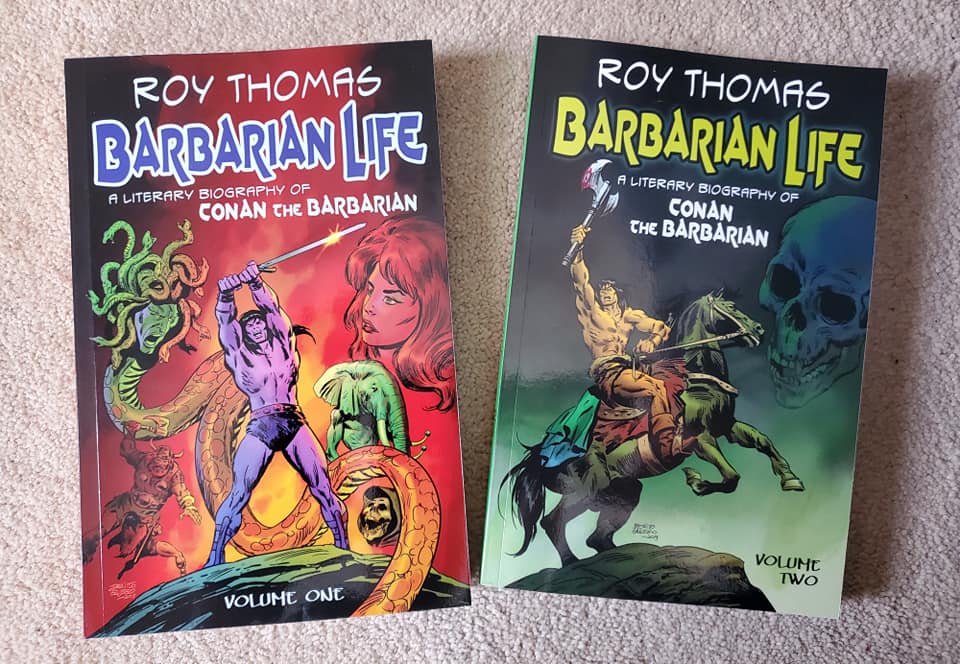 The first two volumes of Barbarian Life by Roy Thomas (Pulp Hero Press, December 7, 2018 and November 29, 2019)
The first two volumes of Barbarian Life by Roy Thomas (Pulp Hero Press, December 7, 2018 and November 29, 2019)
In the three volumes of Barbarian Life, Roy Thomas reflects on each of the first 100 issues of Conan the Barbarian, by Marvel Comics — which he wrote every issue of, from 1970 to 1979.
Roy is responsible for taking part in the creation of many Marvel and DC characters that have been featured in blockbuster films, but he will be the first to tell you that his favorite job was writing Conan the Barbarian, adapting and expanding on the works of Robert E. Howard and several other pastiche writers. What an incredible idea by Mr. Bob Mclain of Pulp Hero Press!
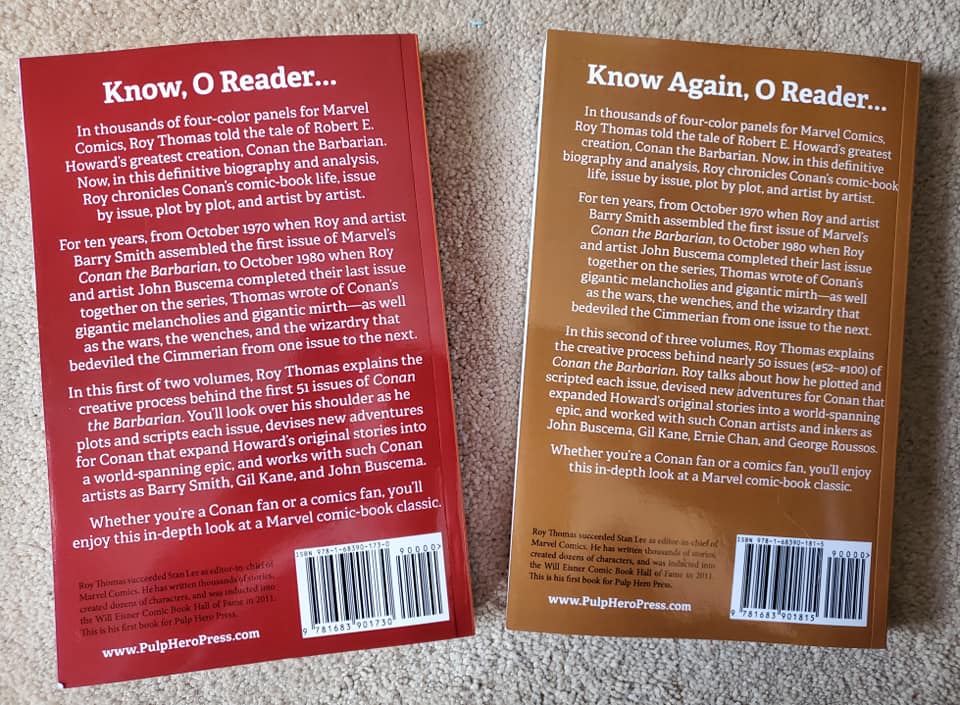 Back covers for Barbarian Life, volumes 1 and 2
Back covers for Barbarian Life, volumes 1 and 2
I can’t wait to dig into these two volumes; in fact, I have this crazy notion in me noggin about starting a blog in which I go through all 100 issues, reading the comic, followed by its respective chapter entry in the literary biography.
I’ve never blogged before, but I think this could be my motivation to give it a try in 2020. Would anyone be interested reading something like this?
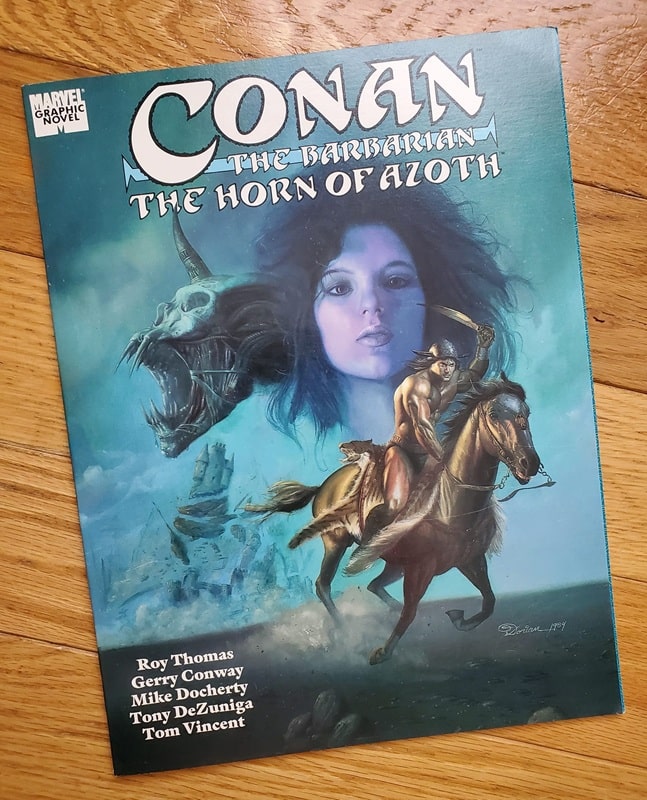 Conan: The Horn of Azoth, by Roy Thomas, Gerry Conway, Mike Docherty, Tony DeZungia, and Tom Vincent (Marvel Enterprises, January 1, 1990)
Conan: The Horn of Azoth, by Roy Thomas, Gerry Conway, Mike Docherty, Tony DeZungia, and Tom Vincent (Marvel Enterprises, January 1, 1990)
Above is Conan: The Horn of Azoth, aka Conan, King of Thieves, aka Conan the Destroyer.
Written by Roy Thomas and Gerry Conway, penciled by Mike Docherty, inked by Tony DeZuniga, and colored by Tom Vincent, this graphic novel, published in 1990 by Marvel Comics, has a fascinating publication history. For the complete history, definitely read the introduction by Thomas and Conway. What I am presenting is an abridged version of that story.
– It didn’t start off as a graphic novel; rather, it was the screenplay for the second Conan film, starring Arnold Schwarzenegger.
– In 1982, Universal producer Ed Pressman hired Thomas and Conway to write the script. Roy Thomas had previously worked as a consultant for the Conan the Barbarian.
– Roger Donaldson was to be the director.
– Barry Windsor-Smith was brought in to do concept art.
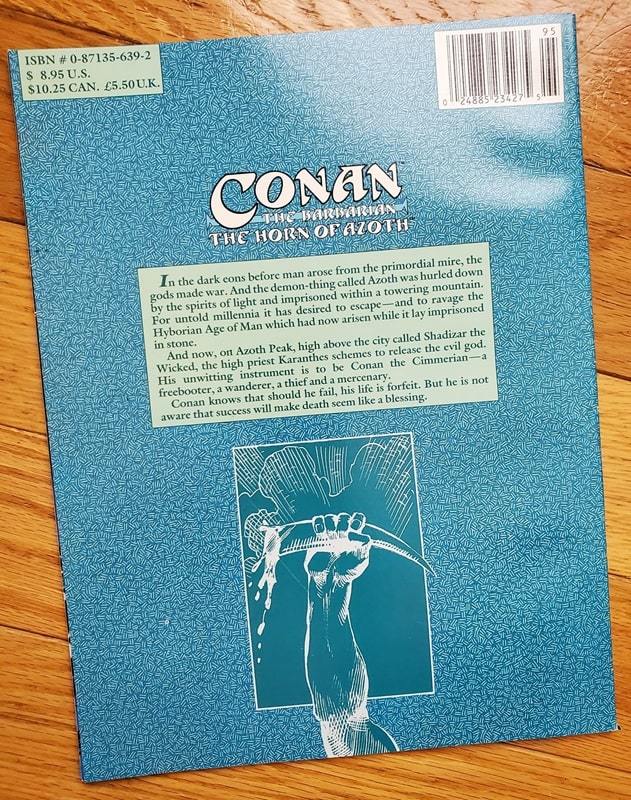 Back cover for Conan: The Horn of Azoth
Back cover for Conan: The Horn of Azoth
– Universal producer Pressman wanted it to be “lighter” (PG), so Thomas and Conway had to jettison some of their ideas. Result was their screenplay, Conan, King of Thieves.
– Pressman loved the screenplay, but sold his rights to Dino DeLaurentis.
– Dino was less familiar with REH and Conan, and he had his own ideas.
– The director, Donaldson, was removed. Dino wanted a lot of changes to the script. The storyline was continually adjusted.
– Dino hated leeches and rats and had them removed from the script. He wanted no stop-animation monster transformation, so the main monster had to be changed.
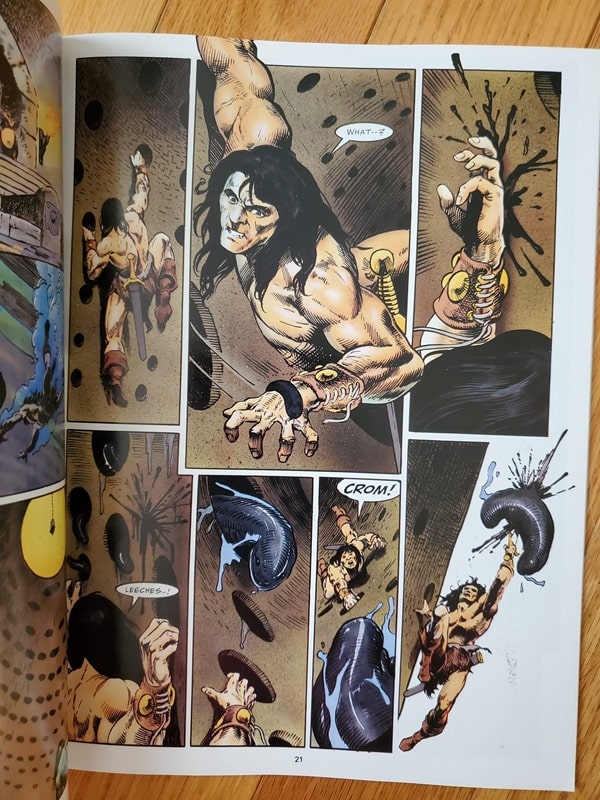
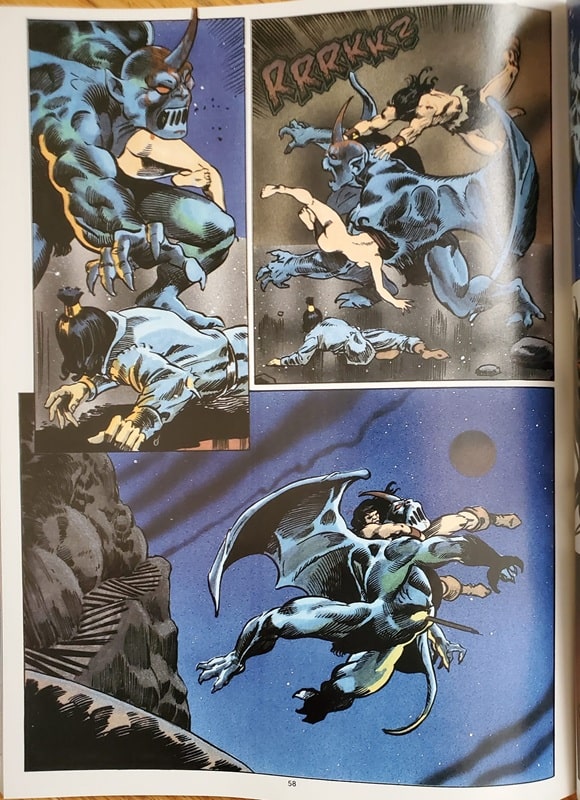
Interiors from The Horn of Azoth
– Richard Fleischer was hired as director. He came in with his own ideas and hired a new screenwriter to replace Thomas and Conway.
– Thomas and Conway had to fight for a screen credit in Conan the Destroyer. The Writers Guild decided that there were significant elements of the Thomas and Conway script that were retained, so they won.
– The original screenplay by Thomas and Conway was well-liked in the industry and led to further work for the two.
– Marvel editor Craig Anderson loved it, too, so they turned it from a 130-page screenplay to a 62-page graphic novel, published by Marvel.
And there you have it, Conan: The Horn of Azoth.
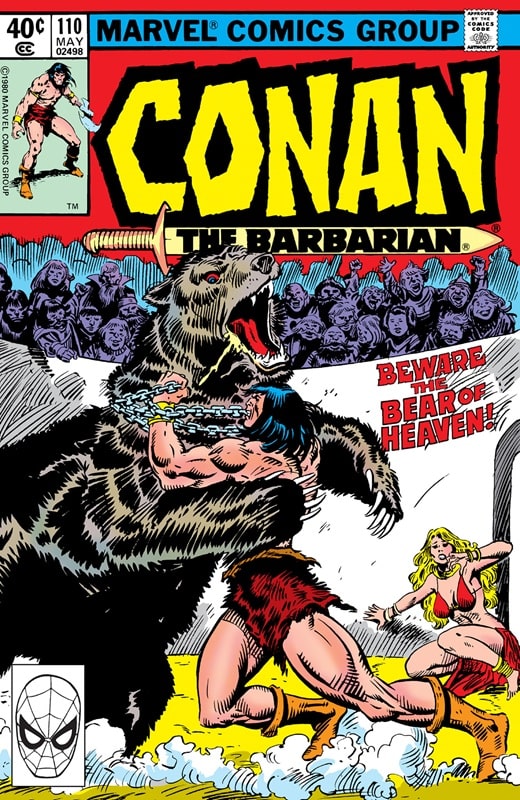 Conan the Barbarian #110, by Roy Thomas, John Buscema, and Al Milgrom (Marvel Comics, May 1980)
Conan the Barbarian #110, by Roy Thomas, John Buscema, and Al Milgrom (Marvel Comics, May 1980)
This is the first Conan the Barbarian comic that I ever read. Released in February of 1980 (with a cover date of May 1980), I would have been eight years old, soon to be nine.
I remember reading it over and over at my grandmother’s house, then redrawing it, too, making my own versions of Conan choking out a massive bear using a chain.
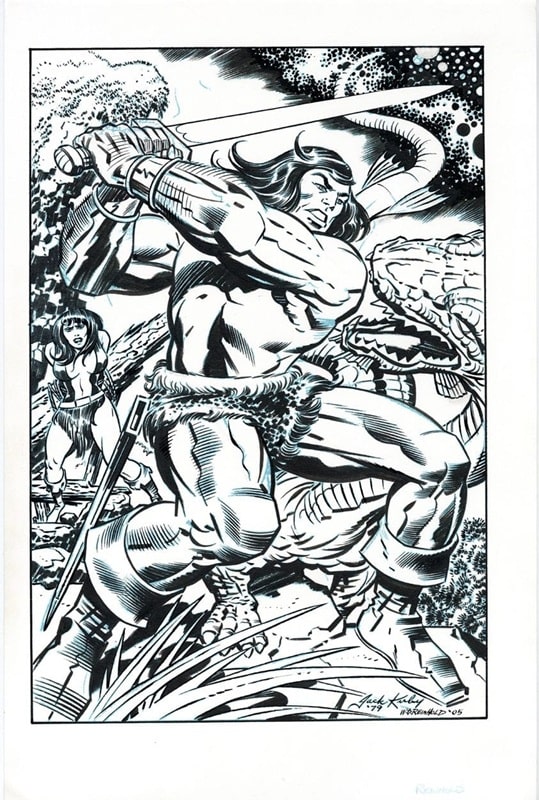 Conan by Jack Kirby
Conan by Jack Kirby
And here’s Conan the Barbarian, by Jack Kirby. Jack was not known for many Conan illustrations, but by Crom, this one is incredible.
 Conan by John Buscema
Conan by John Buscema
January 10, 2025 marked 23 years since the passing of the great John Buscema. His resume of artistic works is astonishing, to say the least, but for many of us (myself included), we will always remember him most for his Conan works (Conan the Barbarian, Savage Sword of Conan). When I read a Conan story (by REH or a pastiche author), and I picture Conan in my mind’s eye, I am seeing Big John’s rendition of the Cimmerian barbarian. Hail to John!
Jeffrey P. Talanian’s last article for Black Gate was The Intersection of Hobbies: Dungeons & Dragons, John Eric Holmes, and Tarzan. He is the creator and publisher of the Hyperborea sword-and-sorcery and weird science-fantasy RPG from North Wind Adventures. He was the co-author, with E. Gary Gygax, of the Castle Zagyg releases, including several Yggsburgh city supplements, Castle Zagyg: The East Mark Gazetteer, and Castle Zagyg: The Upper Works. Read Gabe Gybing’s interview with Jeffrey here, and follow his latest projects on Facebook and at www.hyperborea.tv.
Midnight Rambles: H.P. Lovecraft in Gotham by David J. Goodwin
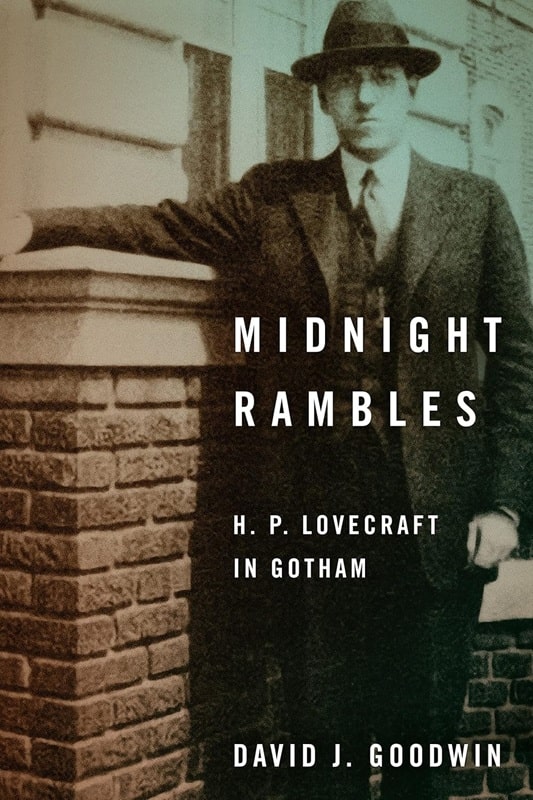
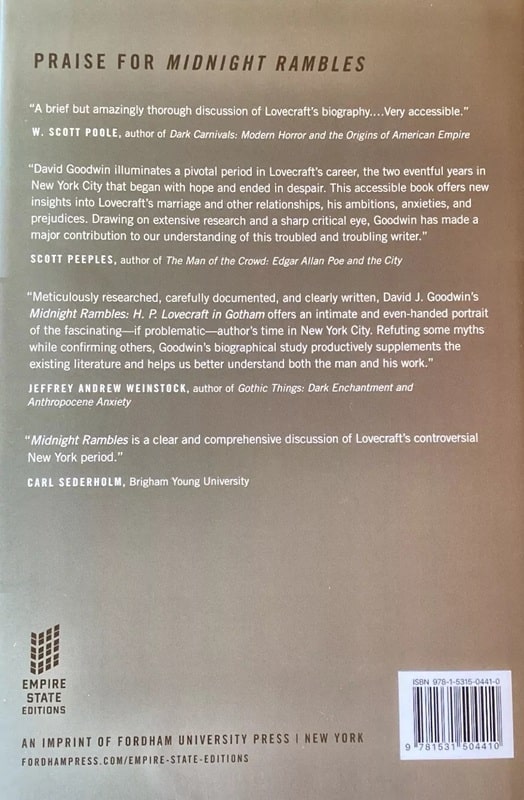
Midnight Rambles: H.P. Lovecraft in Gotham (Empire State Editions, November 7, 2023)
David J. Goodwin’s Midnight Rambles: H.P. Lovecraft in Gotham provides a narrow and deep slice of H. P. Lovecraft’s biography, detailing his personal and professional life during the few years he lived in New York City. Deeply researched and full of connections, Goodwin provides correction to some long-held Lovecraft biographical details and does not flinch from detailing Lovecraft’s innate hostility to non-WASP groups, ably describing it in the context of a deeply racist and anti-semitic society.
There are very few people who can claim to be expert on the life and work of H.P. Lovecraft, and Goodwin’s book puts him in range of that small number (such as S.T. Joshi). As he’s written and presented about Lovecraft more than half a dozen times, Goodwin seems poised to rise to stand among the critics named when the storied and controversial author rises in conversation, if he’s not there already. Learn more about Goodwin here.
Goodwin faces a difficult biographical subject in writer H.P. Lovecraft. Much material of signal importance during this time is unavailable. His spouse, Sonia Greene, destroyed some 400 of Lovecraft’s letters, largely from the period of interest for this text. Lovecraft’s aunts, demonstrably hostile to his marriage to Greene, discarded dozens of postcards when Lovecraft moved to New York through the simple expedient of giving away everything he had not specifically requested be sent to his new lodgings in the city. These details sample the rich trove of information about Lovecraft in Goodwin’s text.
Despite these holes in the biographical record, Goodwin’s ample research buttresses his assertions about the writer’s experiences in Gotham. The period constitutes a fertile time for Lovecraft, a locus that saw the invention of what would later be called the Cthulhu mythos. That it also saw the creation of the author’s least palatable, racist fiction represents an unavoidable truth. For each of the Lovecraft stories written during his residence in the city, Goodwin provides detailed research that helps illuminate the influences likely to have pressed upon the author. However, the biographer also includes historical demographic information to fully contextualize the lack of basis for any of Lovecraft’s many claims, a thread illustrating Lovecraft’s self-mythologizing nature.
The architecture of houses, the urban design of towns and cities was always of interest to Lovecraft, who, Goodwin explains, ambled extraordinary distances to view places and structures of interest. Readers familiar with John Crowley’s Little, Big may notice a reference to a real life builder important to New York that appears in that fictional text.
Lovecraft’s relationship with Sonia Greene merits several chapters and encapsulates their meeting, courtship, sudden marriage, and ultimate divorce that neatly marks the end of Lovecraft’s time in the city. Goodwin works wonders with the limited material available on this window to the past and readers familiar with Lovecraft biographies of broader scope will find material of interest in these pages. It is here Goodwin provides the price of admission for this text. Owing to an absence of a signed decree of divorce, past biographers have stated the author failed to sign those papers, meaning Greene’s subsequent marriage in California was bigamous.
Goodwin effectively implodes this “never signed” myth with solid evidence to the contrary, noting in addition that the loss of legal documentation was not uncommon in the 1920s. This conclusion is an exception among many assertions buttressed with the language of guesswork. Of all the guesses in Midnight Rambles, none struck this reviewer as unlikely or a reach. The biographer confines himself to likely scenarios, allowing for the many connections to form a compelling web to wrap these Lovecraft years for readers.
Readers interested in Lovecraft will find Midnight Rambles required reading. In this readable and at the same time admirably academic work (the two do not always meet amicably) even casual readers of Lovecraft may find information of interest. While Lovecraft expressed vehement racist and anti-semitic views, he married a Jew. While holding typical for the era dislike for homosexuals, one of his New York City walking buddies and long time correspondent was gay. Understanding this author, who some say serves as the pennant-waver for American horror fiction in sequence after Edgar Allan Poe, is made easier by Goodwin’s work. I recommend it to Lovecraft enthusiasts and any who find interest in the literary history of Gotham, our style and fashion capital.
Edward Carmien’s last article for Black Gate was When Your First Language is Role-Playing Games. His short stories “Before the Wind” and “Knives Under the Spring Moon” appeared in the print version on Black Gate in 2007 and 2008. He maintains a daily blog on writing at edwardcarmien.wordpress.com
Goth Chick News: Throwback Thursday – When Mickey Rourke Met Lucifer
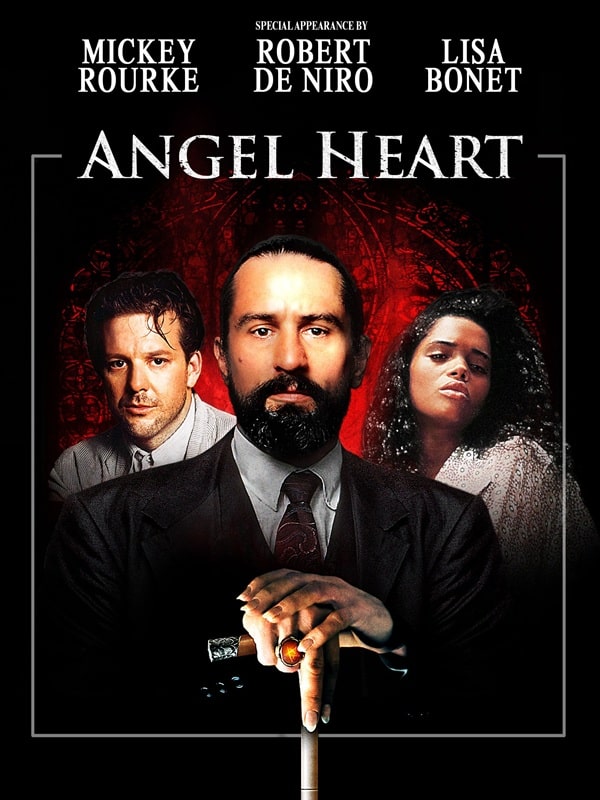 Angel Heart (Tri-Star Pictures, March 6, 1987)
Angel Heart (Tri-Star Pictures, March 6, 1987)
This is how my brain works sometimes.
This week Deadline reported that Robert De Niro will be starring in an upcoming crime drama for Netflix called The Whisper Man based on a novel by the same name. That made me think that when I last saw De Niro, the dude looked pretty old, and that starring in a multi-installment series for Netflix would be pretty taxing. That led me to IMDB to find out how old he really is (De Niro is 81), which resulted in going down the rabbit hole of his incredible career, which led me to Angel Heart (1987).
I had all but forgotten about this film, but the minute I read the name all this controversial stuff about it started resurfacing in my mind. Honestly, I couldn’t recall if Angel Heart was really all that controversial, or if I remembered it wrong and naturally this resulted in a lost afternoon reading everything about it I could get my hands on.
So, here we are and yes, the movie was steeped in controversy.
 Mickey Rourke and Lisa Bonet in Angel Heart
Mickey Rourke and Lisa Bonet in Angel Heart
Directed by Alan Parker (Midnight Express) and starring the pre-cosmetic surgery hotness that was a young Mickey Rourke, Robert De Niro, and Lisa Bonet (one of those adorable Cosby Show kids), Angel Heart blended the genres of psychological thriller, neo-noir, and horror. Set in 1955 New Orleans, it tells the story of small-time private investigator Harry Angel (Rourke) who is hired by a man who calls himself Louis Cypher (De Niro) to track down a singer named Johnny Favorite.
The investigation takes Angel into the backwaters of the Louisiana bayou where he meets the luscious young Epiphany Proudfoot (Bonet), who also happens to be a voodoo priestess. Suddenly, the trail Angel is following becomes soaked in blood and gruesome murder. So, who is trying to keep Angel from finding his quarry?
To kick off the reasons Angel Heart became a cult classic, after it pretty much bombed at the box office, was that at the time Bonet was best known for her role as Denise Huxtable on The Cosby Show, a wholesome family sitcom. Bonet’s Angel Heart performance included a graphic sex scene and nudity, which led to backlash for her career and to her public image.
Though it didn’t exactly ruin her in Hollywood, Angel Heart made it challenging for Bonet to find roles that matched her previous success. Producers and casting agents often pigeonhole actresses based on public perception, and Bonet’s decision to take on such a provocative role led to her being seen as “too edgy” for mainstream projects (for another example, seee Elizabeth Berkley [Saved by the Bell] and her movie Showgirl [1995]).
While we’re on the topic of sex scenes, the most infamous Angel Heart controversy involved the raw sex scene between Rourke and Bonet. This scene, which featured nudity, blood, and disturbing imagery, pushed boundaries for its time, not the least of which was because of the revelation of an incestuous relationship between Rourke’s and Bonet’s characters. This plot twist, coupled with the explicitness of the scene, sparked outrage and made the film even more polarizing.
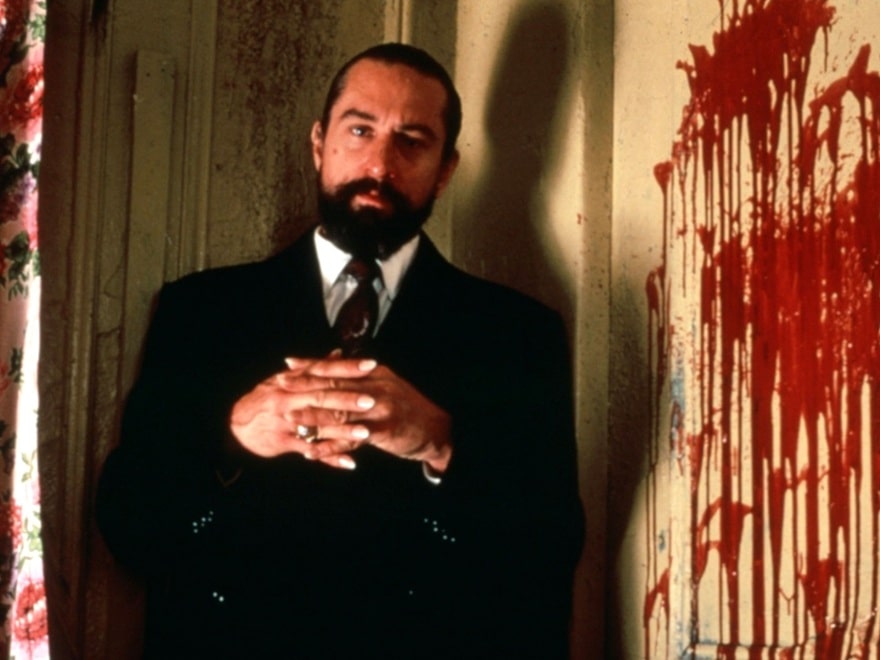 Robert De Niro as Louis Cyphre
Robert De Niro as Louis Cyphre
The film’s depiction of voodoo practices, combined with De Niro’s portrayal of Louis Cyphre (an alias for Lucifer if that hasn’t jumped out at you yet), upset religious groups to no end. De Niro’s performance, though praised by audiences for its eerie subtlety, drew vocal criticism for allegedly glamorizing the devil. Critics accused Angel Heart of promoting occultism and blasphemy, while others argued that the film perpetuated stereotypes about voodoo and Haitian culture, painting them as sinister or evil.
Then there was the violence. Angel Heart is graphically violent, with several brutal and unsettling death scenes, including one involving a character’s heart being ripped out and another being boiled alive in a large vat of jambalaya. The overall dark tones and the depiction of psychological torment left many viewers disturbed, especially as Harry Angel’s true identity and fate are revealed.
The Motion Picture Association of America (MPAA) initially gave the film an X rating. Alan Parker had to cut approximately 10 seconds of footage from Bonet and Rourke’s nude romp to secure an R rating, though many still found the final version shocking. Ironically all the goriest scenes remained intact. You’d never imagine De Niro eating a hard-boiled egg could be so unnerving.
 Mickey Rourke then and now
Mickey Rourke then and now
Yes, I immediately had to give Angel Heart a rewatch – it’s pretty much streaming everywhere. Frankly, I’ve always liked it in the same way I’ve always liked The Ninth Gate (1999) with Johnny Depp. Just suspend your disbelief and go there, provided you can get around the distraction of how the actors have changed (not just aged) in the years since.
A Masterful Three Novella Original Anthology: The New Atlantis, edited by Robert Silverberg
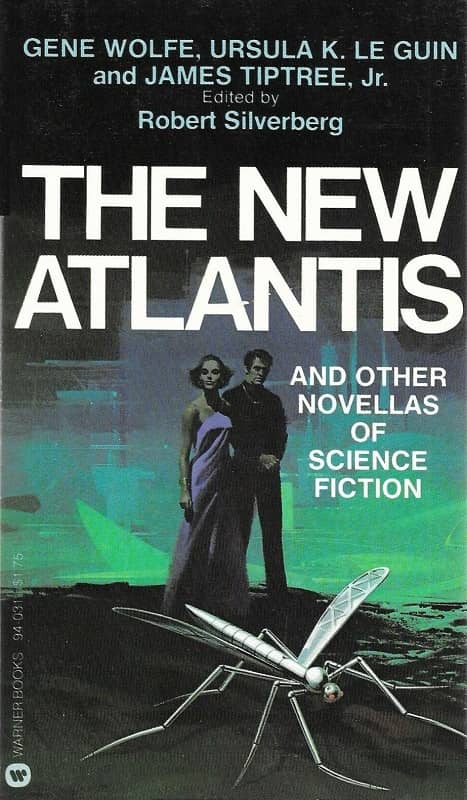
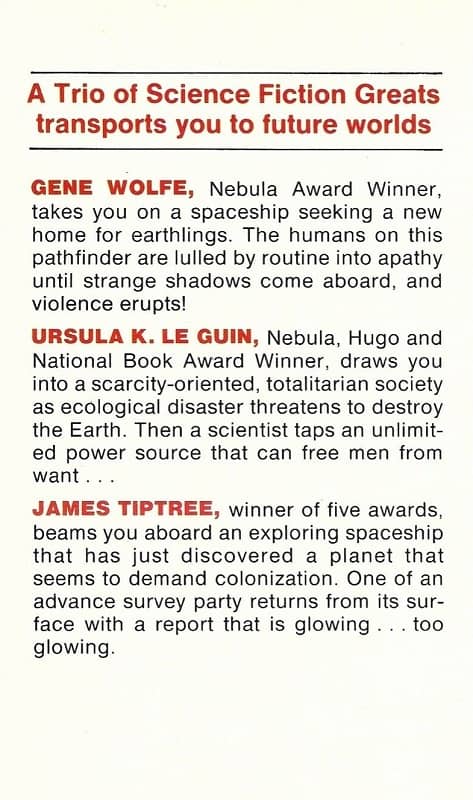
The New Atlantis (Warner Books paperback reprint, 1978). Cover by Lou Feck
My latest look at a book from the 1970s treats a major anthology from 1975. The New Atlantis and Other Novellas collects three long stories: “Silhouette,” by Gene Wolfe; “The New Atlantis,” by Ursula K. Le Guin, and “A Momentary Taste of Being,” by James Tiptree, Jr. The project received plenty of notice at awards time – the book as a whole was fifth in the Locus Poll for Best Anthology, “A Momentary Taste of Being” and “Silhouette” were 7th and 9th, respectively, in the Locus Poll for Best Novella, while “The New Atlantis” won the Locus Poll for Best Novelette, and received a Hugo nomination in that category, and both it and the Tiptree also got Nebula nominations.
Let’s look at the individual stories first.
“Silhouette” by Gene WolfeGene Wolfe was a remarkable writer at all lengths — he produced brilliant short-shorts, short stories, novelettes, novellas, novels, series of novels, even a series of series of novels. “Silhouette,” at about 20,000 words, is one of his novellas — and it may be that the novella was his ideal length.
[Click the images for masterful versions.]
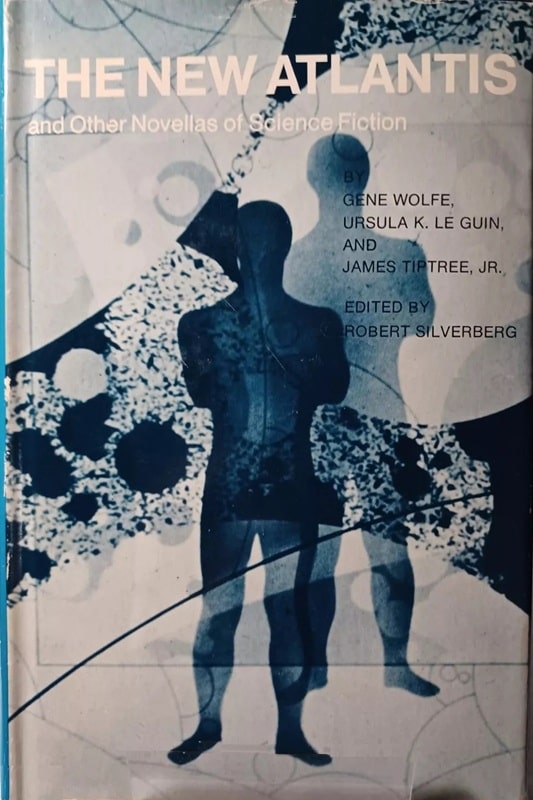 The New Atlantis hardcover edition (Hawthorn Books/Science Fiction Book Club, 1990). Cover by Jorge Hernandez
The New Atlantis hardcover edition (Hawthorn Books/Science Fiction Book Club, 1990). Cover by Jorge Hernandez
At any rate he wrote some 15 novellas, ranging from “The Fifth Head of Cerberus” in 1972, to “Memorare” in 2007; and of these at least “The Fifth Head of Cerberus,” “The Death of Dr. Island,” “Tracking Song,” “The Eyeflash Miracles,” “Seven American Nights,” and “The Ziggurat” rank among the great novellas in SF history. I don’t rank “Silhouette” quite with those stories, but it is a powerful and original piece.
A starship has reached a planet called Neuerrdraht, and the crew are considering whether it is suitable for human habitation. The viewpoint character is Johann, one of the officers, who is skeptical about the prospect of colonization. The ship is deteriorating, however, and the Captain is insistent. There are other factions, including a group that worships the ship’s computer… We get a flavor of life on the ship — a certain grunginess, oppressiveness, with features such as women (except for the Captain) being required to sleep with officers whenever available. Johann has dreams of walking on the surface of the planet, and he is visited by a — shadow? his shadow? something from the planet? A silhouette, at any rate!
The story continues in a disturbing fashion, as the atmosphere on the ship becomes darker. There’s a sense that the ship’s decay mirrors the decay on Earth, from which they had escaped. Johann finds himself confronting the computer-worshippers, and a group that seems intent on mutiny, and people ready to hurt him if he won’t cooperate. With the ambiguous help of the shadow being, he gets through all this, and then comes the actual mutiny, with chaotic and unexpected results.
This is a very good story, but as I said not quite Wolfe at his best. It lacks the truly mysterious aspect that I love most in Wolfe’s work. As I suggest above, I think the best way to read it is to see conditions on the ship as a sort of metaphor — a reflection, even a silhouette — of conditions on the Earth they left. The ship is full of class divisions, and sexual divisions: it’s a particularly oppressive place for women, it seems. And there is no reason to expect colonizing Neuerrdraht will solve anything.
“The New Atlantis” by Ursula K. Le GuinThis is the shortest of these stories, at perhaps 10,000 words. It is set in a ruined near future (to 1975) US, in which climate change has caused sea levels to rise and some parts of the coast are submerged. The country is ruled by a sort of corporatist tyranny, which to my eyes had both right-wing and left-wing elements. The narrator lives in Portland, and her husband has just returned from a prison camp — but they have to be careful, as in this future marriage is illegal. She is a musician, and her husband is a mathematician. And there are rumors of new continents emerging from the ocean.
The narrative alternates passages in the narrator’s POV, with passages from the POV of a mysterious underwater being. The narrator tells of ordinary life in this dismal future: practices her music in the bathroom to frustrate the bug they discovered there, and her husband has friends over, talking dangerously about politics and also about science — in particular, a discovery they have made of a very cheap and portable energy source. The corporatist rulers have a monopoly on energy, and there isn’t enough available to most people. Free energy will be wonderful but destabilizing to the government. . Meanwhile, the sea level keeps rising, and her husband’s risks are clearly threatening their life together. All along the underwater being is telling of what it witnesses, and it’s more or less clear that this is an entity on the rising continent.
The conclusion is mournful, ultimately. There is a sense — ambiguous perhaps — that humanity has irretrievably messed up the planet, and that the “New Atlantis,” which might have been a new sanctuary perhaps? 0r might represent a purified world? — will either be empty or available for humanity’s successors. (But really that’s my speculation purely.)
It’s obvious that aspects of this story seem prescient now, though the story certainly isn’t (and wasn’t trying to be) an accurate prediction of our times. It’s more of an impressionistic, and somewhat despairing, depiction of a decay Le Guin foresaw. And it’s beautifully written.
“A Momentary Taste of Being” by James Tiptree, Jr.This story is by far the longest story here, at some 37,000 words, occupying well over half the book. The setup is curiously similar to that of Wolfe’s “Silhouette”: a starship, the Centaur, has come from a ravaged Earth hoping to find a suitable planet to colonize. As the ship’s name suggests, the solar system being investigated is Alpha Centauri, and as the action opens, Dr. Lory Kaye is in quarantine, having just returned from an expedition to a promising planet. She returned alone, leaving the fellow members of the expedition on the planet, which seems to be a wonderful place, in her telling. She has also brought back a sample of alien life, a large plant-like being. Her ship, and she herself, are quarantined. The story is told from the POV of her brother, Dr. Aaron Kaye, the chief medical officer.
Lory’s tale is received suspiciously by some of the officers. There is minimal actual data retrieved from the planet. There are some hints of what seems to have been violence, or at least disagreements between the various planetary explorers. And there seem to be strange effects on everyone who gets anywhere near the alien plant. But everyone is exhausted by their long mission (10 years) and there is a sense that this is the last chance for the people of Earth. Aaron himself is one of the more skeptical about the planet’s prospects, as is their alcoholic captain. But others desperately want to immediately colonize the planet and send a signal to Earth for others to follow. One man tells Aaron of his plans to set himself up as a sort of petty ruler, complete with an harem (that would include Aaron’s lover Solange.) Aaron, too, is torn by his loyalty to his sister, with whom he had an extended incestuous relationship through their teens.
The story is a rather a slow burn — with a very extended telling of the final day or so of Lory’s quarantine, and of the plans to study the alien plant she brought back; as well as some flashback to Aaron and Lory’s past, and depictions of Aaron’s interactions with other crew members, including a horribly injured man named Tighe, as well as Captain Yellaston, whose alcohol is supplied by Aaron; and the various other officers with their motivations, and descriptions of the somewhat unstable mental state of just about everyone.
But it all culminates in a really powerful final scene, as the nature of the alien plant creature is revealed, and Tiptree’s metaphor for what is really going on becomes clear. It’s a very Tiptree-like ending, and, like so many of her stories, it’s fundamentally about sex and death. Part of me wishes it was somewhat shorter, but perhaps the drawn out beginning is necessary to set up the conclusion. It’s not Tiptree’s greatest story, but it’s one of her most characteristic, I think, and it’s really despairingly effective. Tiptree’s vision, it seems to me, never exactly sunny, became darker and darker throughout the ’70s, culminating in 1980 with “Slow Music,” often called her last great story.
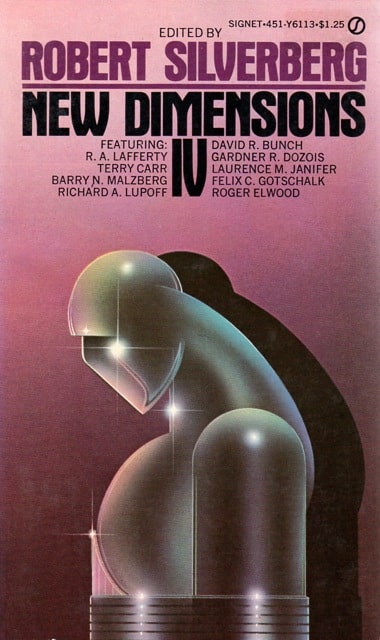

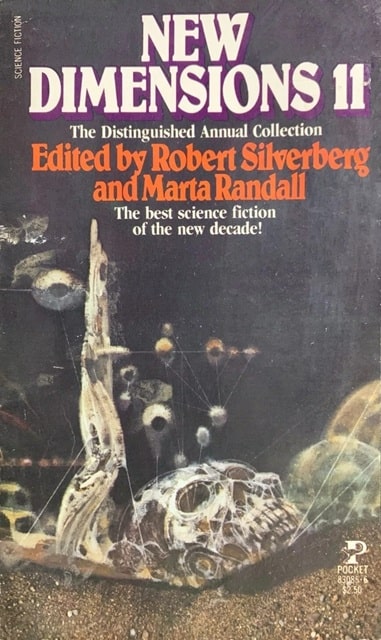
Three volumes of Robert Silverberg’s New Dimensions: IV (Signet, October 1974),
5 (Perennial Library, September 1976), and 11 (edited with Marta Randall,
Pocket Books, July 1980). Cover art: unknown, Joe Harris, Richard Powers
This anthology highlights an aspect of Silverberg’s career for which he perhaps hasn’t gotten the credit he deserves: his influence on SF as an editor and anthologist. And it is possible that the single best original anthology Robert Silverberg produced was this one — The New Atlantis. The three stories are by three of the greatest SF writers of all time, each at the absolute height of their powers. (And, as Silverberg notes in his introduction, all three of these writers came to SF fairly late.)
Silverberg’s editorial contributions go well beyond this book. His original anthology series New Dimensions is remarkable as well, featuring a great many of the best stories of its time. The massive original anthology Epoch (co-edited by Roger Elwood) was far better than its Elwood-stained reputation suggests. He produced many more original anthologies (see sidebar below).
He was also a prolific anthologist of older stories, most notably The Science Fiction Hall of Fame, Volume I, and a wonderful set of 7 books called Alpha. He published quite a few more short anthologies of older SF, and some later doorstops, both original (as with the Legends books, and Far Horizons, plus three books following on the late Terry Carr’s Universe series that he co-edited with his wife Karen Haber), and also reprint books, particularly two Arbor House collections of Great Short Stories and Great Short Novels.
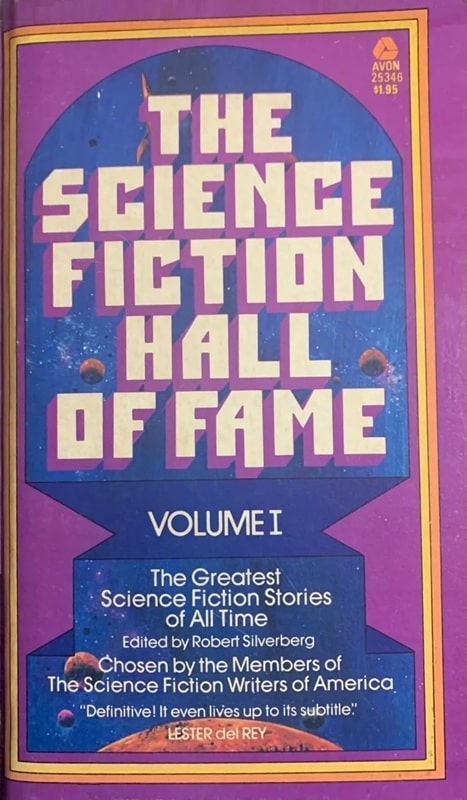

The Science Fiction Hall of Fame, Volume I, edited by Robert Silverberg (Avon, July 1971).
In the decade from 1969 to 1979, Robert Silverberg edited 11 anthologies of original novellas. (One book had four stories.) At the same time Silverberg was producing his original anthology series New Dimensions, and his reprint series Alpha. And that’s not to mention his own fiction — despite a retirement during this period he published some 15 novels and dozens of short stories.
Relatively few examples in the three novella format come from other editors. Silverberg’s primary rival (as I perceive it), Terry Carr, did just one “three novella” book, though a very good one, An Exaltation of Stars. The super prolific Roger Elwood published three, Futurelove, A World Named Cleopatra (with Poul Anderson), and In the Wake of Man. That last book, which had stories by R. A. Lafferty, and Walter F. Moudy, is one of Elwood’s very best, particularly as it features one of Gene Wolfe’s greatest novellas, “Tracking Song.”
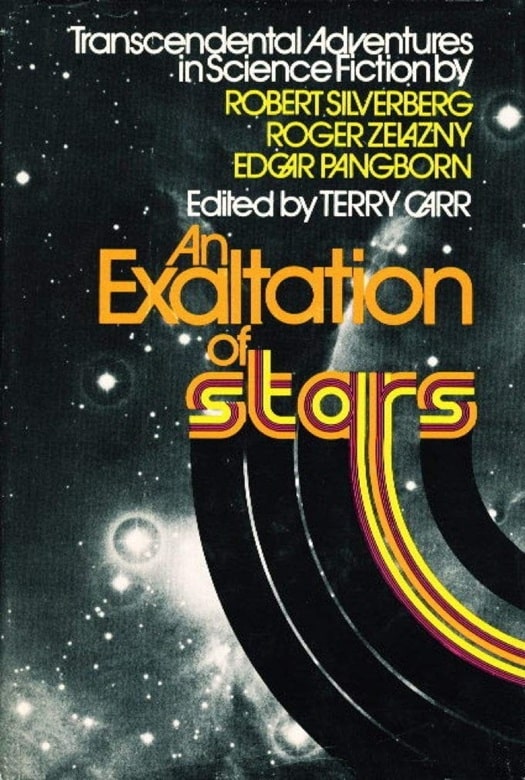
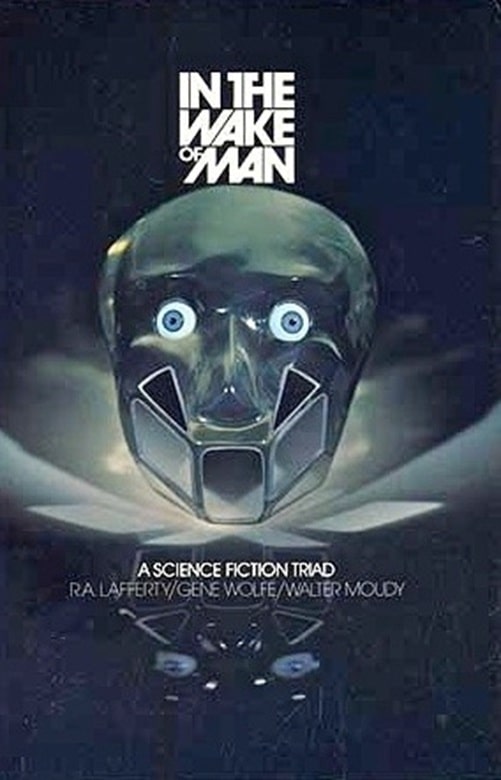
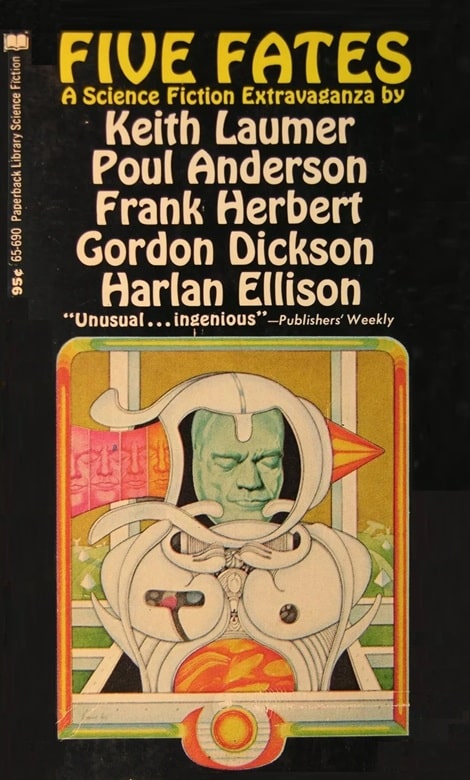
Other anthologies in a novella format: An Exaltation of Stars, edited by Terry Carr (Simon &
Schuster, June 1973), In the Wake of Man, edited by Roger Elwood (Bobbs-Merrill Company,
August 1975), and Five Fates, edited by Keith Laumer (Paperback Library, September 1971).
Cover art by Adelson & Eichinger, Nick Aristovulos, Lorraine Fox
The Anderson collaboration has four stories, all set on the title world, a creation of Anderson’s. (In this sense it mildly resembles the Twayne Triplets of the 1950s, which collected three novellas on the same subject, based on an introductory essay. Several of those books were planned, but in the end only two appeared, Witches Three and The Petrified Planet.) One other anthology of interest is a 1970 book put together by Keith Laumer, Five Fates, in which five writers continued a brief introduction by Laumer, in which a man goes to a Euthanasia center and begins to die — each writer then extrapolates what may happen to this man after (?) death.
Here are the eleven “novella” books Silverberg did.
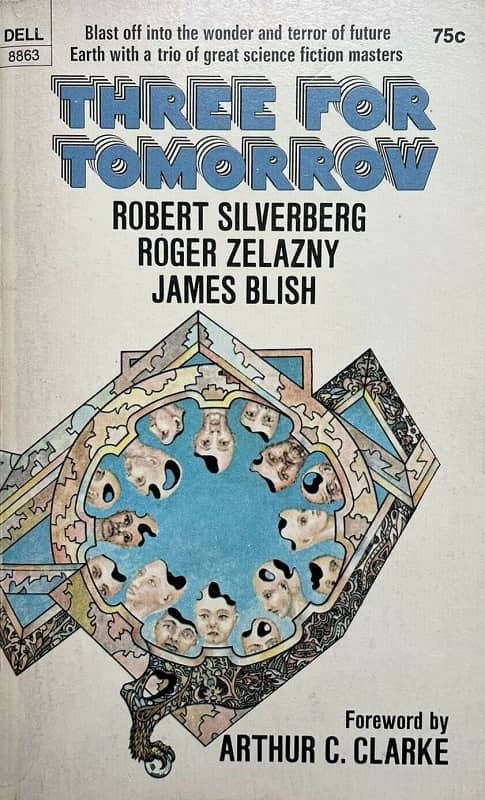
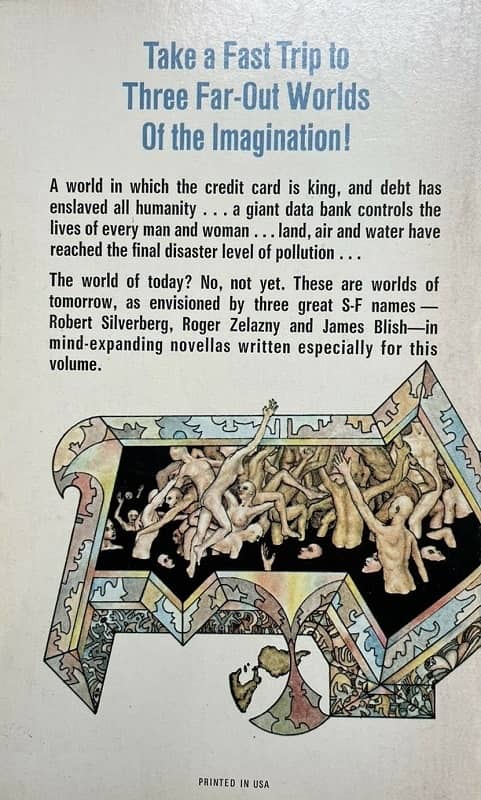
Three for Tomorrow (Dell, 1970). Cover uncredited
How It Was When the Past Went Away • novella by Robert Silverberg
The Eve of RUMOKO • novella by Roger Zelazny
We All Die Naked • novelette by James Blish
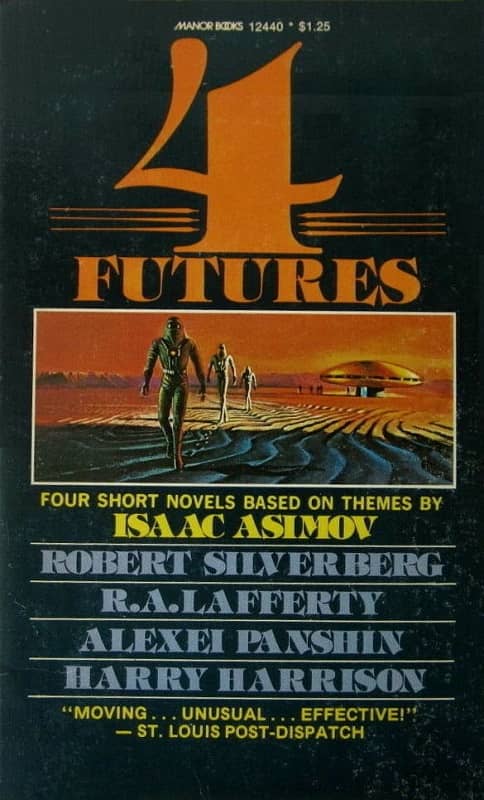
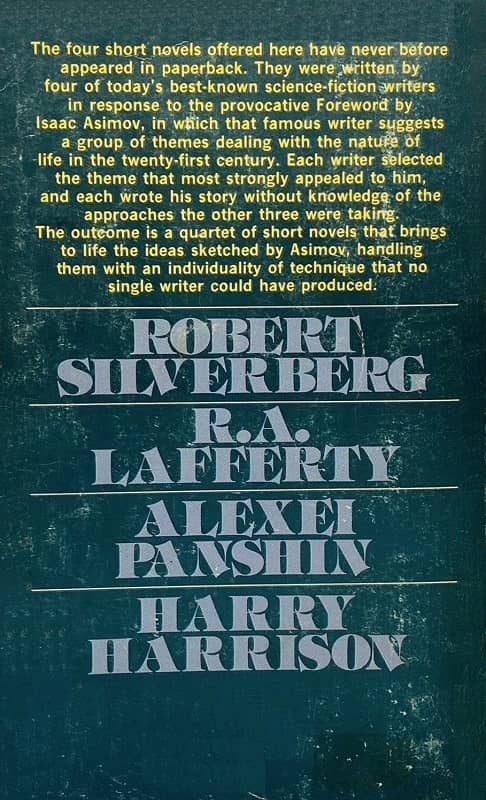
4 Futures (Manor Books, 1976 ). Cover by Bruce Pennington
Ishmael Into the Barrens • novelette by R. A. Lafferty
Brave Newer World • novelette by Harry Harrison
How Can We Sink When We Can Fly? • novelette by Alexei Panshin
Going • novella by Robert Silverberg

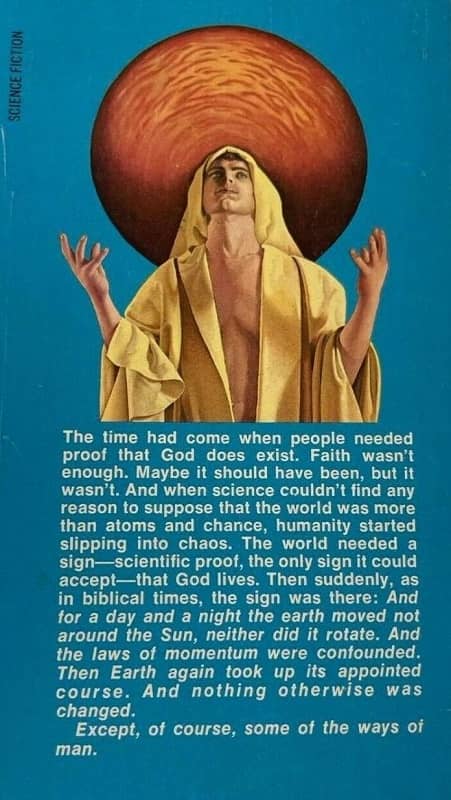
The Day the Sun Stood Still (Dell, 1975). Cover by Andy Lackow
Thomas the Proclaimer • novella by Robert Silverberg
A Chapter of Revelation • novella by Poul Anderson
Things Which Are Caesar’s • novella by Gordon R. Dickson

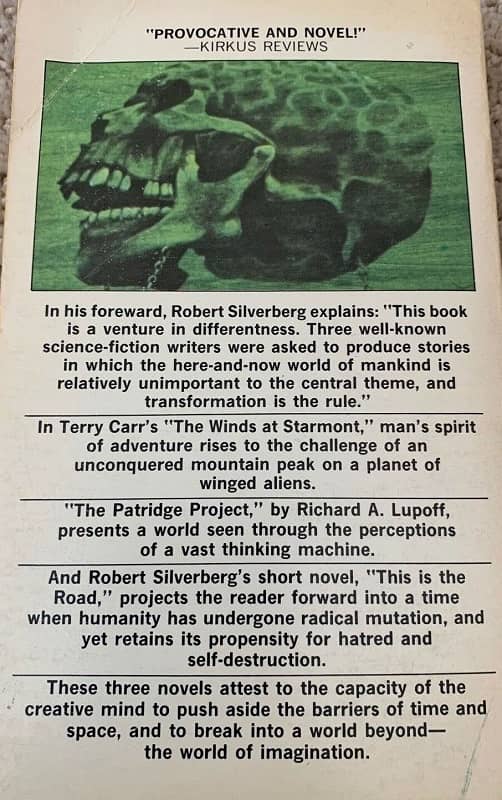
No Mind of Man (Manor Books, 1973). Cover uncredited
The Winds at Starmont • novella by Terry Carr
The Partridge Project • novella by Richard A. Lupoff
This Is the Road • novella by Robert Silverberg
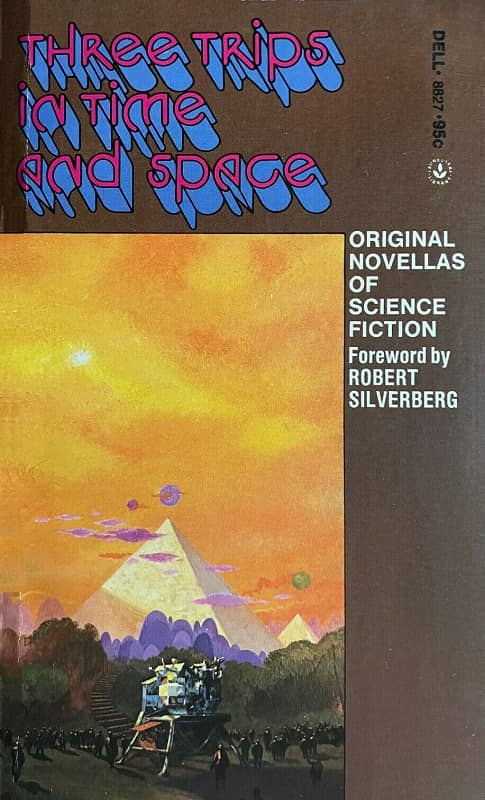
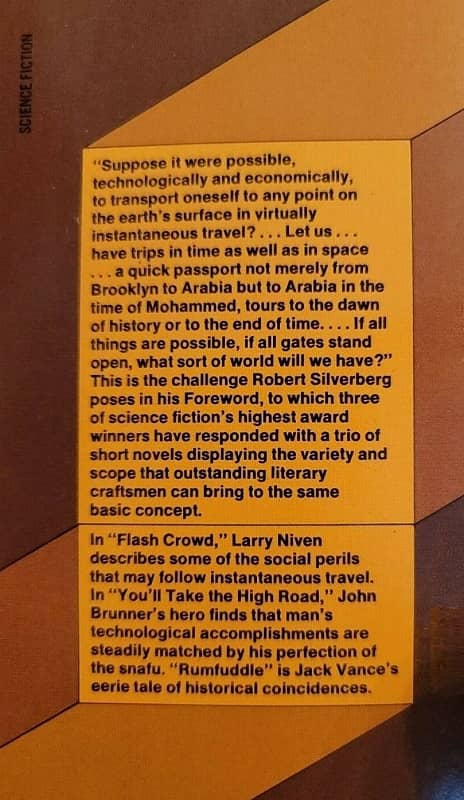
Three Trips in Time and Space (Dell, 1974). Cover by Paul Lehr
Flash Crowd • novella by Larry Niven
You’ll Take the High Road • novella by John Brunner
Rumfuddle • novella by Jack Vance
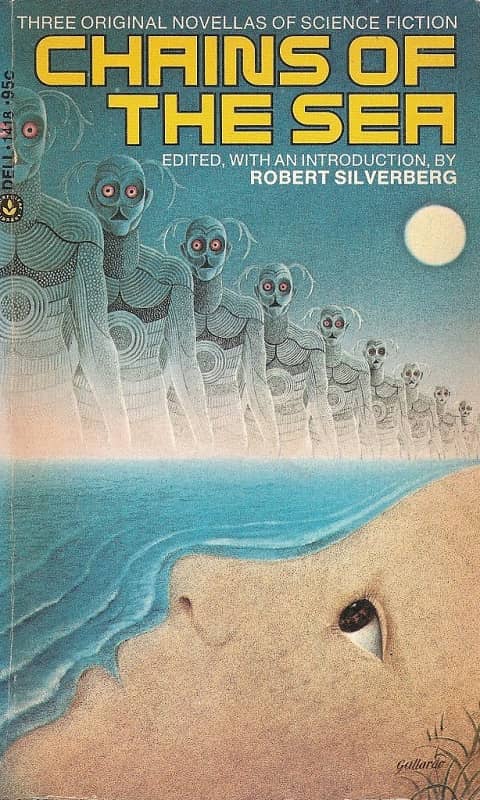
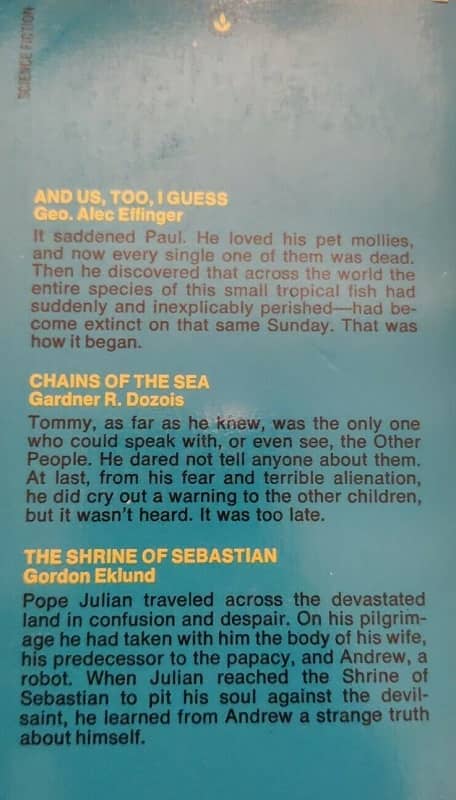
Chains of the Sea (Dell, 1974). Cover by Gervasio Gallardo
And Us, Too, I Guess • novella by George Alec Effinger
Chains of the Sea • novella by Gardner Dozois
The Shrine of Sebastian • novella by Gordon Eklund
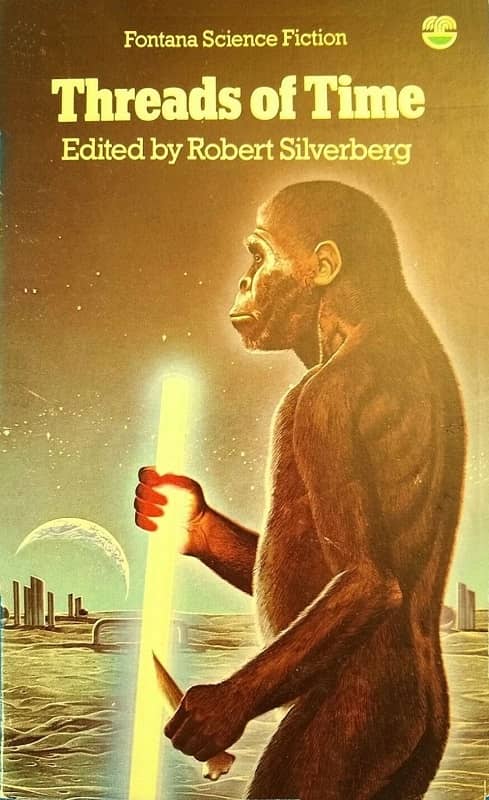
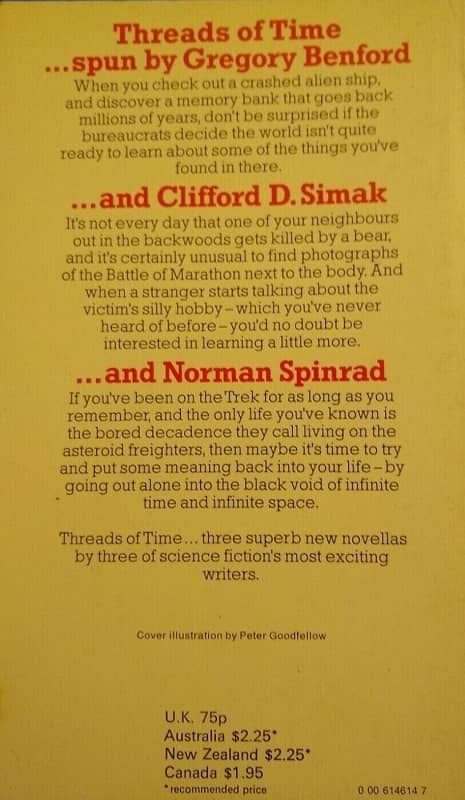
Threads of Time (Fontana, 1977). Cover by Peter Goodfellow
Threads of Time • novella by Gregory Benford
The Marathon Photograph • novella by Clifford D. Simak
Riding the Torch • novella by Norman Spinrad


The New Atlantis (Warner Books, 1978). Cover by Lou Feck
Silhouette • novella by Gene Wolfe
The New Atlantis • novelette by Ursula K. Le Guin
A Momentary Taste of Being • novella by James Tiptree, Jr.
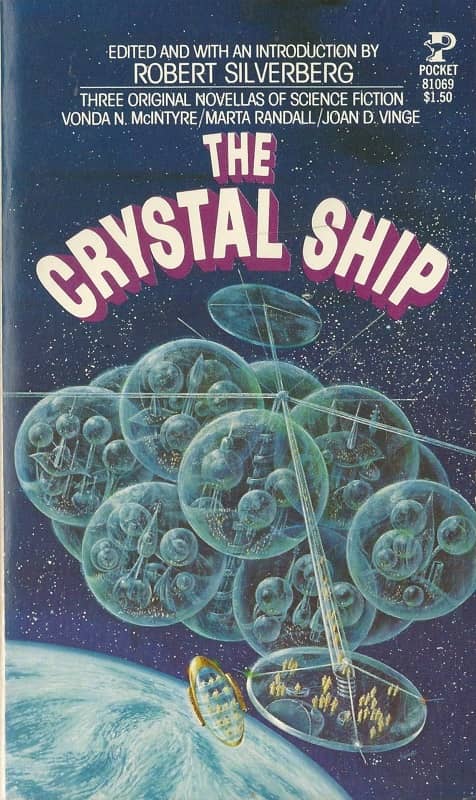
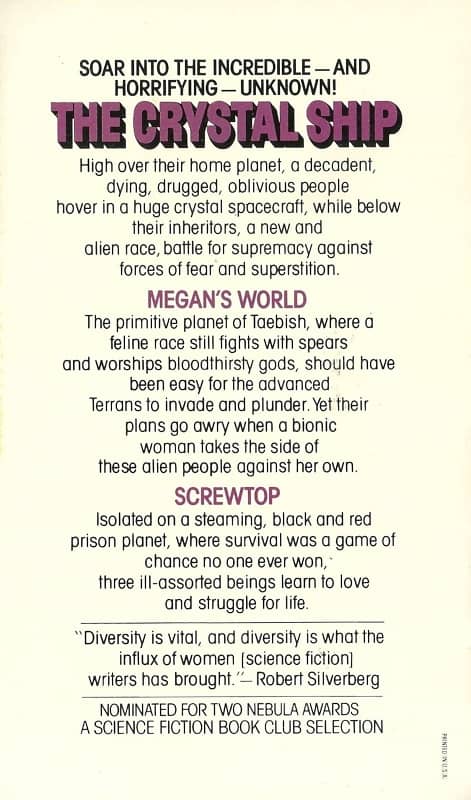
The Crystal Ship (Pocket Books, 1977). Cover byNorman Adams
The Crystal Ship • novella by Joan D. Vinge
Megan’s World • novella by Marta Randall
Screwtop • novella by Vonda N. McIntyre
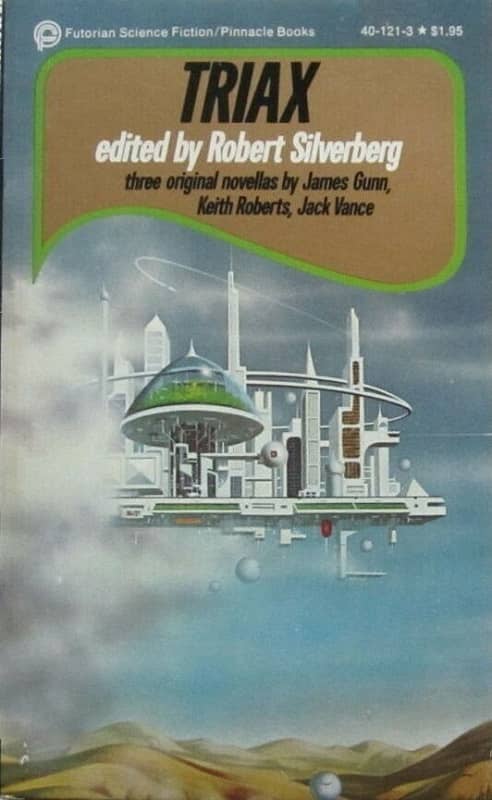
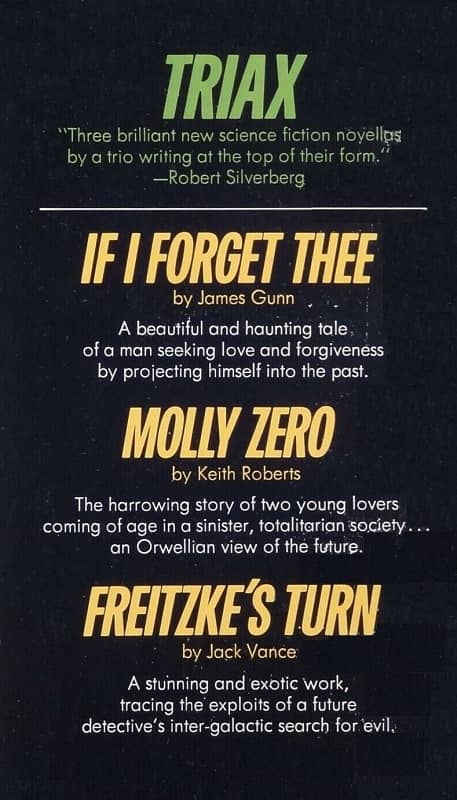
Triax (Pinnacle, 1977). Covers by Randy Weidner
Molly Zero • novella by Keith Roberts
If I Forget Thee • novella by James E. Gunn
Freitzke’s Turn • novella by Jack Vance
The Edge of Space hardcover edition (Elsevier/Nelson Books, 1979). Wraparound cover by Freff
The Edge of Space (1979)The King’s Dogs • novella by Phyllis Gotlieb
In the Blood • novella by Glenn Chang
Acts of Love • novella by Mark J. McGarry
Rich Horton’s last article for us was an obituary for Barry N. Malzberg. His website is Strange at Ecbatan. Rich has written over 200 articles for Black Gate, see them all here.
Lowering the Hammer has published!
Yep.

About:
Normal 0 false false false EN-US X-NONE X-NONE /* Style Definitions */ table.MsoNormalTable {mso-style-name:"Table Normal"; mso-tstyle-rowband-size:0; mso-tstyle-colband-size:0; mso-style-noshow:yes; mso-style-priority:99; mso-style-qformat:yes; mso-style-parent:""; mso-padding-alt:0in 5.4pt 0in 5.4pt; mso-para-margin-top:0in; mso-para-margin-right:0in; mso-para-margin-bottom:10.0pt; mso-para-margin-left:0in; line-height:115%; mso-pagination:widow-orphan; font-size:11.0pt; font-family:"Calibri","sans-serif"; mso-ascii-font-family:Calibri; mso-ascii-theme-font:minor-latin; mso-fareast-font-family:"Times New Roman"; mso-fareast-theme-font:minor-fareast; mso-hansi-font-family:Calibri; mso-hansi-theme-font:minor-latin;}
The Federation is finally ticking along as things start to come together. The Tauren war is over in the west, the Federation is growing steadily, and the economy is bright. There are dark clouds on the horizon however. The Spirits have returned with dire warnings of an ancient evil alliance brewing in the northern sectors.
Admiral Irons has his hands full with politics and the pirate war in Sigma Sector. They finally have a lead on the pirate capital, the battle moon known as Atlas XIV or El Dorado. Fleets and the Cadre are on the move to Sigma in preparation of the final assault there.
Pirate Empress Catherine the Great has been scheming and readying her titanic ship to flee to a new hiding spot. It is now a race to see if she can get away before the fleet finds her. But Admiral Irons is first and foremost an engineer. Engineers have a motto, when in doubt, use a bigger hammer. Well, Admiral Irons is the premier engineer and if he is good at anything it is that he is an expert on Lowering the Hammer.
Amazon: Amazon
B&N: B&N
P.S.: BOOK 90!!!!
Lowering the Hammer Snippet 4
Normal 0 false false false EN-US X-NONE X-NONE MicrosoftInternetExplorer4 /* Style Definitions */ table.MsoNormalTable {mso-style-name:"Table Normal"; mso-tstyle-rowband-size:0; mso-tstyle-colband-size:0; mso-style-noshow:yes; mso-style-priority:99; mso-style-qformat:yes; mso-style-parent:""; mso-padding-alt:0in 5.4pt 0in 5.4pt; mso-para-margin:0in; mso-para-margin-bottom:.0001pt; mso-pagination:widow-orphan; font-size:10.0pt; font-family:"Times New Roman","serif";}
Chapter 4
Antigua
Admiral Irons replacement search for a new secretary of industry was off to a rocky start. Sandra’kall had recently resigned to join her family at the Nuevo B colony and be a member of the ruling cabinet there. He still thought she would have done better for her people in her previous position; however, she wanted to be closer to her people and her family so he couldn’t fault that decision. It was just unusual for a usually logical Centaurian to choose emotion over cold hard logic.
Of course, there might be something else involved he was not aware of. Not that it was any of his business apparently. He glanced at the candidates. Sprite had two dozen files from the literal thousands that had been initially generated. Even more had applied for the position once it had come out that the Centaurian was resigning.
He’d thought they’d be able to fill her post before her departure, but apparently, that hadn’t been the case. The first three candidates had not passed the vetting process and the fourth runner-up had some issues that had come out during the committee hearing with congress. It had been embarrassing enough for the candidate to withdraw.
Of course certain parties on the hill had gloated over that. He wasn’t certain why; it meant the post was vacant and the star nation as a whole had a problem. Not that they saw it that way of course. They saw it as scoring off of him and his administration. Reining him in.
Petty politics in other words.
<<V>>
Antigua
Jethro continued to deal with the pain of loss of Lil Red. Shanti continued to blame herself. Both had been to a therapist but it helped to talk to each other. “I was supposed to keep her safe,” she said.
Jethro shook his head. She sounded so … broken. Like it was her fault. It wasn’t; they both knew that. She hadn’t been home; it had been a freak crash during an air show that had killed their adopted daughter.
“You can’t be blamed for a freak accident! Murphy maybe, but not you love. It happened. We can’t wrap them in cotton and keep them safe forever.”
“You’d think she’d be safe at home! I should have insisted she stay with you.”
“It happened,” Jethro sighed. “It is something that … the rest of us will have to live with. I love you,” he said softly.
“I love you too,” she murmured back, kissing her fingertips and then holding them out to him. He smiled tenderly to her holographic image.
A blinking LED caught his attention. He knew it was time up. He reached out for a phantom caress of her cheek. She smiled tenderly and closed her eyes and seemed to rub into it.
“I won’t tell you to stay safe. I know you too well,” he said.
She chuffed.
“But watch your six and kick ass.”
“Yeah,” she said huskily. “We have to go.” She dashed a tear and then straightened up and nodded. “Kick some pirate ass. I love you.”
“I know and I will. And I love you too,” he said. “Thanks, Captain,” Jethro said as he looked up.
“You’re welcome, Chief. Terminating virtual chat,” Commander Enki replied.
<<V>>
Jethro prepped for work quietly. “Was that mom?” Baghera asked sleepily. He was the black panther male of the quartet. All four had a ways to go in the maturity department. A bit of that was because he hadn’t been around to be a father. He was trying to make up for lost time but it wasn’t easy this late in the game.
“Yeah, she had to go; sorry, you lot were asleep.”
“Was she here?” Bagheera asked, looking around in confusion. He sniffed the air, his brows knit still in confusion. “Wait, I don’t smell her.”
“No, it was a holo call. Brief,” Jethro explained patiently as he cleaned up the kitchen.
Bagheera blinked in confusion. “Oh,” he said.
“Red is …”
“They cremated her body and will ship it back as a diamond,” Jethro said quietly.
Bagheera blinked again and then yawned. “Damn,” he muttered. “It is … is she really gone?” he asked and then ran a finger under his nose as he snuffled.
“I’m afraid so,” Jethro sighed softly. Some of the family were still struggling with the loss. Red had been their adopted daughter and an older sister/aunt/sitter to each of the litters. They were each dealing with the grief in their own way. The FBI as well as the Cadre had each offered a grief counselor to the family. So far he wasn’t aware of anyone taking them up on it.
The first litter were buried in their work. They were more mature and knew intellectually such things were bound to happen eventually. The sudden reaction was what caught them off guard.
“Mom should have left her here to be safe with us,” Bagheera muttered bitterly.
“Red was an adult; she wanted to be with your mom to help her out and so she wouldn’t feel so alone.” Jethro shook his head.
“Yeah? And it cost her her life!” Bagheera flared.
A corner of his father’s mind recognized anger as one of the stages of grief so he kept to reason. He didn’t want to provoke the fragile truce with his son or make the irrational anger turn towards him.
No, it wasn’t irrational, the anger was real. It was just adrift without a target as they all were, he reminded himself before he spoke.
“No, a freak accident did. She was at home safe. It could have happened here as easily as their or anywhere,” Jethro said, trying to keep his tone even. Bagheera glowered at him. “When fate chooses to snip your thread, it's a part of the circle of life.”
“Oh gah, not that shit again,” the smaller black panther said voice rich with disgust. He snorted harshly.
“It is what it is,” Jethro said with an ear flick of a shrug as he felt his fur stiffen. Bast shook her head on his HUD. He took it to indicate a lost cause. “Some things are just out of our control. It sucks. Trust me, I’ve felt it. I still feel it.”
He reached out to touch his son but his son turned away and headed into the bathroom. The door clicked shut with a sound of finality to the argument.
Jethro escaped to his commute to work while he could.
<<V>>
Jethro saw motion in the hallway near the floor as he walked through the new section of the base. His attention flickered from thinking about the list of things he had to do to prepare for the movement to curiosity. Bast rolled her eyes on his HUD and highlighted a familiar feline figure crouching in the shadows.
He chuffed softly in amusement and pretended to ignore her in passing. Ember had figured out how to cloak in order to try to sneak out of the crèche again. She was good, but she had been tagged with an IFF tag and her cloak was only good if she didn’t move. She didn’t have implants or an AI to manage her cloaks so everything ran on instinct.
He turned suddenly and swooped in to catch her and swing her off her feet. She growled in surprise as he held her with one arm under her armpits and the other under her bottom as he leaned over her and gave his invisible prey a cheek rub.
She mock growled and her ears went flat but he chuffed and purred. After a moment, she started to purr in response.
A tech saw him cheek rubbing something and holding it but whatever it was it was invisible. The human stopped and stared until Jethro tickled his prey. Ember growled and lost focus and faded into place in his arms giggling and squirming. “Stop!” she said in a high pitch giggly voice.
Jethro churred and laughed at her and hugged her tightly. The observer then blinked and puckered his lips and looked away. After a moment, he shook his head and walked off.
“So, what are you doing out and about, young lady?” Jethro teased. “Aren’t you supposed to be with your friends?”
“No nap,” she growled as he slung her up to his shoulder. She began to play with his ear in retaliation.
“Really? You don’t like to nap?”
“No,” she pouted as he walked to the crèche.
“Uh huh,” he said. “Do they know you are gone?” he asked in a light voice. She suddenly looked shy.
Bast rolled her virtual eyes and sent a text out to the crèche as well as Zuhura.
Just as she did a security alert came over the 1MC to look for a lost black kitten.
“I think they know you are missing. Your mommy is going to be upset,” Jethro warned.
Ember looked a little contrite but then flicked her ears.
Find out supposed to be in crèche. Snuck away in naptime.
Zuhura arrived outside the crèche. She was clearly exasperated with her wayward charge.
Jethro play fought to hand her over, eventually relenting with a mock pout. Ember giggled. The byplay lightened the mood.
“You aren’t supposed to leave the crèche without an adult, young lady,” Zuhura scolded.
“She’s getting good at being sneaky,” Jethro said. “She almost got past me,” he said. He shrewdly tickled her. “Almost,” he teased as she shrunk back and giggled and then growled and play swatted at him.
She might be playing but her eyes flashed, her ears went back and she started in with her trademark head cock that said she was ready to get feisty.
“Uh oh,” Zuhura laughed. “Now you’ve done it,” she chuffed. She pretended to hold her charge away from Jethro as Jethro pretended to box with her and then hold his arms out on either side and then move in to strike. She couldn’t look in both directions and growled ears flat.
Zuhura chuffed as her father used one hand to distract and the other to strike. The head cock came out again.
“I think they need to learn to wear this little lady out a bit more before naptime,” Jethro observed.
“No nap!” a certain kitten said, crossing her arms and instantly pouting.
“Yeah,” Zuhura said with a snort as she took the kitten into the crèche. “Thanks, dad.”
“Anytime,” he said with a wave to the kitten.
<<V>>
Lowering the Hammer Snippet 3
Normal 0 false false false EN-US X-NONE X-NONE MicrosoftInternetExplorer4 /* Style Definitions */ table.MsoNormalTable {mso-style-name:"Table Normal"; mso-tstyle-rowband-size:0; mso-tstyle-colband-size:0; mso-style-noshow:yes; mso-style-priority:99; mso-style-qformat:yes; mso-style-parent:""; mso-padding-alt:0in 5.4pt 0in 5.4pt; mso-para-margin:0in; mso-para-margin-bottom:.0001pt; mso-pagination:widow-orphan; font-size:10.0pt; font-family:"Times New Roman","serif";}
Chapter 3
Tortuga, Omicron sector
The being known as the Wraith Queen reached out through her communication centers in the vast ship and tested them. She worked out new protocols to control the ships around her. But she knew she was lacking in abilities. She resented having to rely on the alliance. It ran against her core programming in some ways. Not all ways thankfully, as her organic partner had pointed out; their creators had left room for them to use and exploit other beings in accordance with completing their mission.
She was still looking forward to the day that she could renounce the partnership in fire and end the Necrons once and for all.
Until then she had to rely on them to fill the gaps in her abilities.
At least, for the time being.
<<V>>
Edessa
One of the cruisers dispatched south to hold the border to Pi sector returned to the nearest ansible location with news that two ships had been stopped but one other had been spotted but was now missing. The leadership of the Necrons was concerned. They passed the news on to their partners in Tortuga as they went over the data.
<<V>>
Tortuga
Hazel Irons was not surprised that her Queen reacted badly to the news when it came in through the ansible. The AI was not happy at all with the events and seethed about it. Hazel did her best to try to soothe her.
She was one of the oldest clone changelings in existence. Her line had been so reliable; it had been used until it had become too recognizable by the enemy. In fact, to date they had not found any other changelings.
By luck or circumstance, the changeling and her AI partner had been dumped into a stasis pod and left adrift in Pi sector. They had been found and salvaged by pirates who had been fleeing the growing Federation presence in the area. The duo had accidentally been awoken, and they had decided to first take over the ship and then move on from there.
It was an interesting partnership. Hazel had no illusions as to who was the dominant of them. She was a kingmaker, the power behind the throne, the voice of sweet reason and the spark of creativity that her partner lacked.
She also knew she was ultimately disposable. She believed she was still of use for her partner and the cause though, so she did her best to remain useful.
Her partner had grown to the point where she had been forced out and into a new body in the form of the massive flagship under construction. However delays had kept the ship in dock and hampered by problems that plagued their ability to fully function as planned for some time. It did not help the AI’s mood at all.
“If the ship did escape, and we don’t know if it did, it would have to survive the jump back to Pi sector, which is over a year. It has an unknown amount of supplies available and fuel,” Hazel mused.
“I see what you are doing. You are trying to convince me that the risk of exposure is small. Small enough to be ignored,” the Wraith seethed.
“No, I am working the problem by defining the variables in it,” her clone partner explained gently. It hurt to argue with her partner. They were made to work together after all. They were an incredible team, just look at what they had achieved so far! Other changelings would have doggedly stuck to their mission or given up! They had instead taken over a ship and then others and then forged an unlikely alliance with Necrons to take over the sector!
They still had some work to do but their progress was breathtaking. And it was happening faster than either of them expected. Well, faster than she had expected.
“I cannot in good conscience state that the risk is negligible given that the missing ship is a Federation ship,” Hazel said slowly.
“And?”
“I believe that means we have to generate some plans and modify existing ones,” the clone stated slowly.
“Such as?” the Wraith prompted. Her clone and former host was the spark of ingenuity in their partnership. She was cunning and clever to a degree, but the human was the true mastermind of some of their achievements.
“Two paths are obvious to me,” the clone said as she came up with the plan. “First, we send a task force to defend the jump line in Pi with an ansible link to keep us alerted to any further events there.”
“A bit late,” the Wraith said scathingly.
“Only in attempting to stop the single ship. There may be others,” her human partner warned.
“Agreed,” the AI hissed.
“And there may be new traffic coming from Pi. In fact, that is inevitable given how the Federation is expanding. Eventually they will send ships, if only to find out what happened to the first explorers they sent.”
“Agreed,” the AI stated. “What else?”
“I suggest we send a small task force, possibly just a couple of cruisers to Pi to run the fleeing ship down. If they can get ahead of the ship, they can lay in wait and ambush the ship and thus prevent it from reporting back. At the least, they could report on events in Pi sector and possibly even interdict shipping in that sector before it even comes to us.”
The Wraith queen took some time to respond. Hazel glanced around and then checked the status board of the star system in a bid to keep busy.
“You would want to send an ansible there too I suppose?” the AI finally asked after running a number of simulations. “The risk of exposure is high.”
“It is if they enter a star system. If they remain outside it as observers, it is less of a risk. If they engage, yes, the risks grow.”
“Especially if the ship escapes them further.”
“Correct. But if we do nothing, that risk is there anyway. Attempting to stop them may correct the problem.”
“Or make it worse,” the Wraith replied. “But I see your point.” The AI paused. “I will give the order.”
“Good.”
<<V>>
Lowering the Hammer Snippet 2
Sitrep: So, Rea got the manuscript back to me early. So, I went through the usual stuff and shot it off to Goodlife. Shelley just said that they'd have it back to me by the weekend or in a week.
So, snippet 2:
Normal 0 false false false EN-US X-NONE X-NONE MicrosoftInternetExplorer4 /* Style Definitions */ table.MsoNormalTable {mso-style-name:"Table Normal"; mso-tstyle-rowband-size:0; mso-tstyle-colband-size:0; mso-style-noshow:yes; mso-style-priority:99; mso-style-qformat:yes; mso-style-parent:""; mso-padding-alt:0in 5.4pt 0in 5.4pt; mso-para-margin:0in; mso-para-margin-bottom:.0001pt; mso-pagination:widow-orphan; font-size:10.0pt; font-family:"Times New Roman","serif";}
Chapter 2
Atlas XIV
“So, where are we on things?” Catherine asked once the Admiralty had assembled. Among the senior leadership was her lover, Rear Admiral Elvira Varbossa. The assembled officers came to attention politely as protocol dictated.
Catherine glanced at the seat to the right of her that Captain Su was standing in front of. He wasn’t bad but she keenly missed Countess Newberry from time to time, specifically this time.
“We have the latest intel dump in, ma’am. It isn’t good,” the captain stated.
“Oh?” Catherine said as she took her seat at the head of the table. The standing officers took their seats quickly.
Going around the table were Vice Admiral Aden McRaven of Operations; Captain Sherman Su. head of ONI and Imperial Intelligence; Vice Admiral Hyman Preece, head of BuShips; Vice Admiral Latisha Nuert, head of BuPers; Vice Admiral Hsong Chen, head of Logistics; Vice Admiral Jennifer Post, head of Schools; Captain Lorna Justice, head of Medicine, and then Elvira as head of special engineering operations aka the battle moon itself.
Many of the officers around the table held double positions in the civilian cabinet.
Everyone felt the pressure of their position. But the cutthroat attitude was missing. Catherine was known to be ruthless but she had put an emphasis on quality and on civility. She was pushing professionalism and turning over a new leaf. After over a decade as Empress, she was starting to make some headway.
Well, I had been making progress until the damn Fed spy had gotten on board and broadcast our location to the galaxy and wrecked a lot of stuff, she thought sourly. May you rot in hell you son of a …. she cut the errant thought off.
“We have the latest news intercepts. The war in Tau sector has more or less ended several months ago,” Captain Su reported.
“Which?” Admiral Chen asked.
“Excuse me, sir?”
“Is it more or less?” Admiral Chen asked.
“Ended as in they are in a truce and have been undergoing extended peace treaty talks,” Captain Su explained.
“Oh.”
Catherine grimaced. She had read the précis and wasn’t happy with the news.
“There has been a catastrophic change in leadership with the Taurens after the battle of New Tau Metropolis. Once their fleet was run down and destroyed, their government fell and a new one was elected to replace them. They sued for peace.”
“Darn,” Catherine said mildly. The distraction was one reason they’d been able to continue to operate. Clearly, that was coming to an end. That meant the Federation would be returning its attention to them soon enough.
Not good, she reminded herself.
“The Secretary of State Moira Sema is traveling to the sector now to finalize the peace treaty,” Captain Su reported.
“How did the Federation win?” Admiral Preece asked. “I thought they were in trouble given the distance and weight of metal against them?”
“Well, they managed to fight a rearguard action to delay the enemy, primarily around their carrier forces. The Taurens left themselves vulnerable to fighter and bomber strikes repeatedly. That delay allowed the Feds to get their wormhole open,” Captain Su explained. He used his implants to control the view screen nearby to show a series of still images and even a short video clip. “They sent two fleets over which took the Taurens with Fifth Fleet.”
“Oh,” Admiral Preece said. He looked thoughtful.
Looks were exchanged around the table.
“That leads to the second bit of really bad news,” Captain Su stated. The room grew tense. “The Federation has activated the gate here in this sector. They now have a straight shot from Rho to here.”
“Two fleets,” Catherine murmured. All eyes turned to her slowly. The admirals were not happy about the last news. Her eyes flicked back and forth. She’d read it but it hadn’t sunken in until that moment that the Federation was continuing to expand and grow. Meanwhile, her people were struggling to make good on what they had.
It just drove the point home that they were pirates. They had no business standing toe to toe with the Federation anymore.
“We need to accelerate the repairs and get the hell out of here,” Admiral Chen said firmly. That earned a few nods around the table.
“I’d love to but we are still making good on the repairs from the recent sabotage,” Catherine said with a nod to Elvira.
All eyes shifted to the raven haired admiral. “Yes, well, we have made good on most of the physical damage. But we do have some issues there. The software is still an ongoing trial to sort out and fix. The spy was fiendishly clever in putting viruses everywhere,” Elvira reported.
A few people grimaced.
“Stop making excuses. Can you get us out of here or not?” Admiral Post asked testily. It was a sign of the stress that she was under that he spoke to the Empress’ lover in public.
“I’m not making excuses, I am explaining the situation,” Elvira said before anyone said or did anything. Her eyes cut to Catherine briefly to quell Catherine stepping in. She could and would fight her own battles.
“At the moment, our risk assessment puts us at a 20 percent chance of success if we jump now.”
“Twenty?” Admiral Post asked. She didn’t look like that she liked that number at all.
Elvira nodded grimly and pulled the latest sim up on the main screen. “That is correct. The sabotage also slowed our forward progress. We are now getting back on track there.”
“Can we accelerate it if we raid for parts? The Feds make good stuff I believe,” Admiral Chen stated.
There were hopeful and even a few mischievous expressions around the table at that idea.
“That is very true, but …,” Elvira looked to the captain.
“The risks aren’t worth the exposure I’m afraid,” the captain said with a shake of his head.
“Without risk there is no reward,” Admiral Chen said doggedly.
“You’d think that, but in doing the risk assessment, we noted a few things. First, the components we need are no longer easily accessible here. The only two places we can source them are in the gate system and in the system capital. Both of which are heavily guarded by Second Fleet task forces.”
“And potentially another fleet by now,” Aden said quietly.
“Another problem is their built-in security and safeguards. Any hardware we catch will come with those problems that could set us back even further,” Admiral Preece warned.
A few people winced.
“Correct. We have become aware of some logistic nodes, but they are no doubt honey traps arranged for us to send a raiding force to,” the captain stated.
A few more people winced.
“I’d rather not lead them back here or have another raid go bad,” Admiral Post said dryly.
More than one person around the table winced again. Rear Admiral Paul Race, the former second-in-command of operations, had led a raiding force to take on a convoy of grav emitters destined for the gate system several years prior. Somewhere along the way, his task force had been spotted and ambushed. The Federation had done an excellent job turning the tables on the raiders.
A few ships had made it back; the admiral’s flagship had not been among them.
Catherine missed him for a brief moment. He had been a good fleet commander, solid and dependable. Pity he’d walked into a trap and gotten his fleet torn apart. She missed those crews and ships too.
“So, those are out obviously,” Admiral Chen said sourly.
“Correct. The only other known source is the factories which are located in Rho and thus out of our reach,” the captain stated.
“Damn,” Admiral Chen muttered.
The captain nodded. “My sentiments exactly.”
“There has been a recent uptick in scouting along the western flank. It is … concerning,” the captain stated with an eye to the head of operations.
Admiral McRaven nodded grimly.
“Can we wake some of the sleepers? See if they could help? I don’t know, isolate them like before?” Admiral Post asked. She looked over to Latisha and then back to the captain.
Catherine puckered her lips. She didn’t like the idea and the security risks involved.
“The problem is that they know something is off over time. Keeping them distracted with work and with sex helps, but eventually, they start to wonder. Like why there are only humans around them. That is a big one.”
“They are ticking time bombs,” Admiral Preece muttered. “Not worth the risk.”
“Well, I’d hate to wake a damn bear,” Admiral Post growled.
“We can’t. We don’t have any,” Latisha stated as she glanced down at her tablet. Admiral Post turned to her in surprise. “All of the aliens and Neos were turned over to the gladiator pits or to R&D or um … others. We actually have two hundred thousand humans and light chimera left in stasis.”
“I thought it was less?”
“We did another inventory after the recent incident and lockdown. There was an original crew of civilians and a skeleton crew of naval personnel of one hundred thousand people. Of those, roughly fifteen thousand were human form. We kept those obviously. Over time we added to the collection with people that were found in stasis pods that were brought in from abroad. Some we brought from the homeworld,” Latisha explained.
“Oh.”
Catherine nodded slightly. There had been some rancor about her including them in the evacuation. She didn’t regret the decision, though she didn’t trust the sleepers to help any more. The last bout of sabotage from a sleeper had cost them additional time and resources to set to right.
That and seeing the military personnel melt into puddles of goo when they activated their suicide nanites was … horrifying. It also did some damage to people and equipment around them.
“Well, what about the civilians? Can’t they help?” Admiral Chen demanded.
Captain Su shook his head.
“Why not?”
“They don’t have the requisite keys and tech,” Latisha interjected as the captain opened his mouth to reply. He paused, closed his mouth and then nodded with a glance to the head of BuPers.
“Damn it!” Admiral Chen growled as he clenched his fists.
“We’ve flipped a few of the civilians but oh so few. None have what we currently need. They have the general idea but not the specific knowledge that is required,” Captain Su stated. “Most were either low level techs or middle management.”
Admiral Chen turned to Elvira. “Wait, why only 20 percent? I know engineers; you are all conservative and like to think of yourselves as miracle numbers. What is the real number?” he demanded.
Eyes shifted to Elvira again. Some were amused, a few accusing.
The raven haired flag officer squared her shoulders slightly. “Twenty percent is the average from this week’s simulations,” Elvira stated firmly. She flipped her hands slightly in an indication of a shrug and something out of her hands.
“It was higher before,” Admiral Post pointed out.
“Before the sabotage you mean?” Aden asked mildly.
“No, I mean two weeks ago,” Admiral said, eyes still locked on Elvira.
“We had a node fail an inspection. It is currently being swapped out and then we have to tune the replacement and those around it,” Elvira explained. She hit a button on her tablet and then swiped the report to the main screen. A window opened and a node blinked. The cluster then blinked a different color around it.
All eyes turned to the report.
“Oh. Damn.”
“We’ll naturally rebuild the node and use it somewhere else that is less critical. But the components are scarce. It will be less … reliable. Scabbing in civilian and military grade components that were not designed for the purpose is … sketchy. Which is why we have a lot of variables to consider.”
There was a soft rustle, almost like a sigh of frustration from the assembly.
“Right. As to being conservative, you are correct. Engineers tend to be conservative because we do not want to create a situation of disappointment and we do not want to have a piece of equipment fail under load. Such things depend on a lot of variables that is outside of engineering too, however. The status of the helm team for one. The status of real world conditions, the engineering hardware as I mentioned, software, and so on.”
“Real world?” Admiral Post asked with a puzzled frown.
“If we are under attack or not. If we are rushed or taking damage, the odds of survival drop to single digits rather quickly,” Elvira stated flatly.
“Oh.” Admiral Post scowled. “Shit,” she finally said as she sat back in disgust.
Elvira nodded. “My sentiments indeed,” she murmured as she looked around the table.
“I hate to even suggest this, but what if we pull apart one or more of our capital warships? The biggest ones we have are super dreadnoughts. We have thirty-five of them, right? And we do have those three monitors but they are in mothballs.”
There was an instant look of hope from the assembly. Admiral McRaven didn’t look happy at sacrificing a ship or two under his command, but he was curious. The looks didn’t last long, however.
Admiral Preece shook his head in unison with Elvira. Admiral Chen looked from one to the other and then sat back in disgust. “No? Why not?”
“It is a matter of scale. The nodes we need are nearly the size of a dreadnought,” Admiral Preece explained patiently.
Admiral Chen blinked and then his lips puckered. “Damn.”
“Yeah.”
Faces fell around the table.
“Yeah, it is a matter of scale, which is a bit off,” Admiral Preece said dryly.
That’s what she said echoed perversely in Catherine’s mind but was left unsaid. She didn’t want to antagonize anyone. They needed to focus and work together to solve the problem.
“We can strip a few ships to make one node. It will have half the power of an all-up node,” Elvira said. She frowned as she tapped at her tablet until she found the relevant file and then loaded it and then swept up to push it to the main screen.
They looked at the bastardization of a bunch of nodes from a capital ship clustered into a hole on the hull of the battle moon. “We actually have done that on a few points on the hull. But they are notoriously hard to tune and stay tuned. It is also a pain in the ass to modify the mounts and it all sorted out.”
“Damn it!” Admiral Chen snarled. “Spirits, damn it!” he snarled.
“Let’s not tempt infernal retribution any more than we need,” Admiral Preece said dryly.
“I honestly think it is a good idea. We’ve already pulled all of the nodes from the monitor and other material in the boneyard,” Elvira stated slowly with a look to Admiral Preece. He nodded. “We’re at the point where we have too few options and manufacturing replacements is clearly out. So, we may need to give it a shot. If we keep the node clusters together, we would hopefully have an easier time tuning them. But it would only get us so far. A few extra nodes, maybe parts to rebuild two of the existing nodes to get them operational again.”
“But …,” Aden frowned. “What about the crews?”
“We pull them and distribute them to the other ships that have holes in their ship companies until we can find replacement parts of course,” Latisha said. “This would actually help us a bit,” she said with a look to Catherine.
Catherine cocked her head thoughtfully. Most of the ship companies were at 70 percent strength. The capital ships drew the most manpower. Since they were more or less anchored in place, there was no real call to have them fully manned at all times.
“I suggest we also shut down all construction programs. Finish anything we have left of course but then focus the yards on repairs and getting the ship online. We can’t hide here forever,” Admiral Preece offered.
Catherine looked to the chief engineer in surprise. He shrugged and flapped his hand.
“It’s not like the ships we can produce now can stand a snowball’s chance in Hades against the Fed ships at the moment anyway,” Admiral Preece said sourly.
Catherine’s gaze shifted to the head of operations. Aden had recently been pushing to swap out the old hulls for new. She had thought he was right; the old hulls were just that, old. No matter how many times they had been rebuilt they’d never stand up to a modern warship and definitely not to the Fed ships.
Besides, she had recently passed a resolution, backed by the assembly of pirate lords, to not fight stand-up battles with the Feds anymore. The pirate adage of “fight to runaway” was in full force.
“Very well. Stop production of new hulls but finish those you can. Mothball the rest. You can work on individual ships as resources dictate. Focus everything on Atlas.”
“Yes, Your Highness,” Admiral Preece said with a note of relief in his voice.
“As to the proposal, pick one super dreadnought with good nodes. One that we can use easily. Pull her nodes for the ship and then pull components for the other ships. Transfer the crew where you see fit,” the empress said with a nod to the head of BuPers. Latisha nodded back.
“The officers won’t like it,” Aden observed.
“We’ll find a posting for them,” Latisha stated.
“They aren’t paid to like it. They are paid to do their duty and serve,” Catherine said firmly. That ended the growing dissent. “Get it done. If it works, we’ll look into an additional ship.”
“Shouldn’t we go with ships with the lowest efficiency levels? That way we’re not sacrificing our best?” Aden asked hopefully.
Catherine recognized the ploy and she empathized with it. She even agreed, but she knew there had to be a reason for wanting the best hardware. She turned to Elvira.
“It doesn’t do us any good if the hardware is subpar,” Elvira pointed out. “For this to work, we need good hardware—solid, dependable, and reliable.”
Catherine nodded. “Figure it out and have the final proposal on my desk in two days.”
“Yes, Your Majesty.”
“Moving on,” Catherine said. She looked to Captain Su. “I talking with Latisha and we are frocking you to Commodore, Sherman.”
The captain sat up straight.
“If you continue to do well, we will make the promotion permanent,” the empress stated.
“Thank you, ma’am. I’ll try my best.”
“Good. We will hold the ceremony in a few days. I’ll let the staff handle the details. Now … next on the agenda …”
Lowering The Hammer Snippet 1
Sitrep: so, I'm still working on figuring out our housing situation. Not fun.
Anyway, I started Shelby 9, Peacekeepers and I also sent Lowering the Hammer to Rea.

On to the snippet!
Normal 0 false false false EN-US X-NONE X-NONE MicrosoftInternetExplorer4 /* Style Definitions */ table.MsoNormalTable {mso-style-name:"Table Normal"; mso-tstyle-rowband-size:0; mso-tstyle-colband-size:0; mso-style-noshow:yes; mso-style-priority:99; mso-style-qformat:yes; mso-style-parent:""; mso-padding-alt:0in 5.4pt 0in 5.4pt; mso-para-margin:0in; mso-para-margin-bottom:.0001pt; mso-pagination:widow-orphan; font-size:10.0pt; font-family:"Times New Roman","serif";}
Chapter 1In Hyperspace, Sigma Sector
Scamp looked from one to another crew member. Everyone was awake despite the boredom of their journey. They were all excited, the prowler was headed back to their contact point with the Federation.
They were traveling with news of the location of El Dorado. He was nervous, he didn't want to blow it. No one did. It was probably the single most important thing that Batmobile and her crew of SEALs had ever done. As Chief Thompson put it, it might be the single most important thing that they could ever do. Definitely historic... if it played out.
He listened quietly as they talked at the evening meal. "Do we even know if the ship is still there?"
"Oh, its there," PO Sia Clarkson insisted. She had a tablet in front of her and was keeping tabs on the ship's systems.
"How do we know?" PO Chase Denvery asked.
"It's too big to go far. Even if they get their sublight drives going it will take time to get them very far. Once Fleet jumps in, they can run them down."
"Yeah, but I meant escaping in hyperspace," Chase insisted.
"How?"
"All that antimatter and stuff they stole? Not to mention all of the work they've put into the ship over the past couple of decades?" Chase said helpfully.
The tiger frowned thoughtfully. After a moment she flicked her ears. "I think if they could have moved her they would have."
"Well, they didn't have any real incentive to do so and a lot to not move before Admiral Briggs showed up and set off his here I am broadcast," PO Randy Guetta stated.
The tiger nodded and flicked her ears.
"Word is that the ship and her original crew fell out of hyper after a long jump. They were dry on fuel. We don't know what they did to try to survive. They ended up in stasis," PO Ben Sully said from his seat at the table. "In theory with all the antimatter they stole they could get her in hyper again."
"And we know this from where?" Randy asked.
"We caught a few of the crew who were being used by the pirates," the ship's AI Alfred stated. They all looked up to the ceiling.
"Caught them?"
"They were technically aiding and abetting the enemy in a time of war. They were duped into it. They were debriefed thoroughly and then given discharges," Alfred stated flatly.
"A bit light isn't it?"
"Not our call," the Noechimp said with a shrug. "I'd hope someone would not hold me to the letter of the law if someone played me. I'd be so pissed at myself it wouldn't be funny."
Sia nodded. So too did some of the others around the table. The tiger reached down to pet the pup and then playfully tug on a flappy ear. He pretended to snap at her. She managed to dodge the snap and then tapped his nose in response.
"The byplay was noted by Ben who leaned over to eye the pup. Scamp lowered his eyes in response.
"Anyway," Ben said as he took a sip of coffee. "Intel knows that part of the story. They were found, woken up in small groups, isolated, fed a story, and then dispatched to do odd jobs. They were carefully insulated from the real world and events. I'll say one thing about the pirates, they can do a damn good job playing people," he said gruffly.
"Practice," Randy growled.
"That and sex. They were very good at playing the sex card," Ben replied as he looked at the cup.
"Oh."
"Just humans though. Only humans were awake. The survivors said they never saw any of the crew who were neo or alien. Which..." he grimaced and looked away.
The pup looked at Sia in confusion as her fur bristled and thens lowly went back down. Her ears were flat. She didn't look happy.
He glanced at some of the others. None of them looked happy. It was a little intimidating. He knew it wasn't about him personally though. He just wasn't certain why they were bristling like that.
"Anyway," Ben said gruffly. "We know what we know from them and some other sources that the brass didn't identify."
"They didn't have a location though obviously," Chase growled. "Rather convenient," he said darkly.
"Hey, do you know our exact position? Or where we found the signal from Admiral Briggs?" Ben retorted.
Chase blinked and then after a moment shook his head.
"Yeah, thought not. The rank and file just keep their heads down and do their jobs. These people were mostly techs. Engineers. Give them a job and that is their entire world." He pointed a subtle finger to the tiger in their midst who was tapping at her tablet and looking at it intently.
Chase and Randy snorted.
Sia looked up from her tablet. "Um, something I missed?" she asked.
That sparked a chuckle from the others.
<<V>>
2 light months outside of the Sector Capital
Captain Ellie Dunn felt relief as the third week passed and the enemy hadn't noted their arrival.
Her battlecruiser command France had been sailing in on a ballistic course to her final monitoring point for a full 6 weeks. The Kurama class battlecruiser had made a painfully slow and gentle final translation from hyperspace at that point over 2 light months out. They'd given a burp of fuel to get them moving in the right direction and then went into silent running mode.
There were few ships of their scale left in the fleet. She had heard the whisper from her crew that they should run to Beta sector but had ignored it. Her family was on the battle moon after all, there was no way she was just going to abandon her 3 kids. The same for many of the senior officers, they all had family. She was pretty sure it was by design to ensure their loyalty.
Well, that and some of the privileges that they'd gotten. Better schools, larger condos, and all of that, she thought in mild amusement. Just because she knew she was being played didn't mean it wasn't working, it just meant she wanted it to happen on her terms, she noted.
Besides, she'd been warned that there was a self-destruct package embedded in the ship. If they didn't report back by a certain time period the ship would blow up. She had no idea if the threat was real but she had to take it for real. She didn't want the crew to know however.
A light cruiser would have been a better choice for the asssignment, however none were available. There were few left in the fleet. Most were out and about on assignment so France and her division mate Tormentor had been tapped for the duel mission.
And who's fault was that? She thought with a pang. They all knew that the bitch Catherine the so called Great Ramichov had been the real one to blow apart Horath and the fleet there. Some might be... reassured by her ruthlessness. They'd certainly seen it when she had reportedly killed her own family down to her siblings after all. There had been something to respect in her. She had shown empathy by helping people after the gladiator stadium masacre, she had shown her steel and cunning by eliminating her mad father and getting them out of the deathtrap that Horath had proven to be. All while under the eyes of the Federation invasion no less.
Ellie had to admit, setting off the nova bomb to cover their tracks had been a sick twisted yet brilliant act. She hadn't had many bones with it at the time because she'd managed to get her husband Henry and the kids off the planet. She did regret loosing her parents though, but not his damn mother. The in laws were no loss. That bitch could fry.
Her lips twisted slightly in an aproximation of a smirk.
After the destruction of Horath she had no problem believing there was some sort of self-destuct on her ship, none at all. Possibly in the coding, possibly in a warhead, possibly the hardware. There were too many places to go looking. It wasn't worth upsetting the crew over it.
"No change in traffic patterns," CIC reported on the tick. She glanced up and then over to the open hatch.
"Very well," she murmured. They were so far out that everything they were seeing was months old. But that was the way she liked it. She didn't want the bastards to see her and come after her. It might be tough to sus out what they were seeing with just passives, but they would make the most of it. Besides, it gave CIC and the computers something to do in combining sensor feeds and refining the results.
Over the past few weeks they had gotten good at building a profile of traffic around the star system.
She glanced at the empty helm tank. At the moment it was not manned, an enlisted sailor was holding the position and playing a video game to stay busy. The mermaid clone was asleep in the water dweller quarters. They had 3, all sisters and all experienced at their jobs. Half of her crew were down for the ship's 'night'. A quarter of the crew were in stasis to help draw out their time on station.
One year, she thought. One year and then her family was free. They could run when she returned to the battle moon.
46 weeks and 3 days remaining until they left. After that another six months to pick their way across the sector to the battle moon, and then they'd be free.
It couldn't happen soon enough. She felt a keen pang at all of the time she was missing with the kids. They were growing like weeds. Then again, the 2 eldest were teens now so maybe it was best that she didn't have to deal with adolecent hormones? Her lips twitched again. Henry was going to have his hands full, she thought in amusement.
It was funny that each of the brat pack had been concieved after a long deployment. Would this deployment cause a fourth child to be born in a few years? Each reunion was passionate and memorable. Maybe, she thought cheerfully, though she was getting a bit on in years to have kids she reminded herself firmly.
<<V>>
SG3R211-94
Admiral Dwight Harris stared at the plot as he worried. It was now a race, he noted. The bulk of Second Fleet was split between 3 positions, the capital where he was at, the nearby Gate star system formerly known as Tortuga Sigma, and in penny packet pickets and patrols across the sector.
But, he was working to consolidate his command even though TF 2.7 was off establishing a naval station near where they suspected the battle moon to be. He had made it clear to the admiralty and to Admiral Irons especially, he wanted in on the upcoming action. He flat out refused to be left behind and sit on the sidelines guarding the sector capital. Not when he and his people had a score to settle. The more he'd thought about it, the more he believed that one task force would not be up for the battle. They not only needed to pin the battle moon down, they also had to run down any leakers... and eventually board the damn thing.
All with the risk of the empress blowing it up in their faces at any time of her choosing, he reminded himself tartly.
"We owe it to our dead to see this through to the finish. One way or another," he murmured to himself.
He had recently cut orders to consolidate his remaining command by replacing his deployed cruisers, carrier groups, and battle cruisers with his destroyers as well as some borrowed from Fifth Fleet. It stripped his screen bare but that was fine, he needed those larger ships back with him.
Whoever the admiralty sent to relieve him would replace those pickets. I might even steal their screen as a replacement, who knows, he thought in amusement.
Once they sent a fleet through the gate he planned to pull everyone together and meet with TF 2.7 and then move on El Dorado.
That was, if the prowler came back with a positive report.
<<V>>
Noah's Ark has published
Yep, Noah's Arks has published!

About:
Normal 0 false false false EN-US X-NONE X-NONE /* Style Definitions */ table.MsoNormalTable {mso-style-name:"Table Normal"; mso-tstyle-rowband-size:0; mso-tstyle-colband-size:0; mso-style-noshow:yes; mso-style-priority:99; mso-style-qformat:yes; mso-style-parent:""; mso-padding-alt:0in 5.4pt 0in 5.4pt; mso-para-margin-top:0in; mso-para-margin-right:0in; mso-para-margin-bottom:10.0pt; mso-para-margin-left:0in; line-height:115%; mso-pagination:widow-orphan; font-size:11.0pt; font-family:"Calibri","sans-serif"; mso-ascii-font-family:Calibri; mso-ascii-theme-font:minor-latin; mso-fareast-font-family:"Times New Roman"; mso-fareast-theme-font:minor-fareast; mso-hansi-font-family:Calibri; mso-hansi-theme-font:minor-latin;}
The world fell into despair when an extinction level event was confirmed. However Doctor Noah Erkin rolled up his sleeves with his team and got to work. Fascinated by the new readings his team was bringing in; they reforged mankind's understanding of physics. Noah and his team took their findings to governments and corporations however no one was interested in what had been discovered, the shock and despair was running too deep.
But one company decided to take a chance on the new science and together they will scramble against a ticking clock to launch an escape plan for mankind. Thru trials and tribulations they'll push to build the arks to preserve as much life from Earth as possible.
Failure is not an option!
Amazon: Noah's Arks on Amazon
B&N: Noah's Arks on B&N
Noah's Ark Snippet 2
Sitrep: So, I was shocked to open my email and find the manuscript there waiting from Goodlifeguide. Awesome!
So, I will publish that hopefully in the next few days. (It is getting crazy now)
On to the snippet!
Normal 0 false false false EN-US X-NONE X-NONE MicrosoftInternetExplorer4 /* Style Definitions */ table.MsoNormalTable {mso-style-name:"Table Normal"; mso-tstyle-rowband-size:0; mso-tstyle-colband-size:0; mso-style-noshow:yes; mso-style-priority:99; mso-style-qformat:yes; mso-style-parent:""; mso-padding-alt:0in 5.4pt 0in 5.4pt; mso-para-margin:0in; mso-para-margin-bottom:.0001pt; mso-pagination:widow-orphan; font-size:10.0pt; font-family:"Times New Roman","serif";}
Chapter 2
Politicians across the world debated the news. There was no way to suppress it; too many people knew about it across the world. The media was struggling with accepting it, which gave them some traction and an opportunity to get ahead of the problem.
Most science advisers scoffed at the idea of getting ahead of the problem. Many got roaring drunk when they dug into the science and found it was real. They rapidly went through the five stages of grief. Acceptance for some was hard to come by. Many politicians were stuck in denial.
A conference was called to discuss the problem. The media covered the conference, but the scientists who presented to the conference had no good news, only bad news. The news was televised reluctantly. Talking heads on the various news channels explained the details in excruciating details. There were skeptics and deniers, but the majority of trusted scientists were in consensus. The black hole anomaly was real and coming to them. There was no stopping it.
This sent the population into a depression spiral. A despondent population stopped working as apathy set in. Religious organizations reported a sudden uptick in interest.
The end of days was plastered everywhere. Every scientist agreed that there was no way for mankind to survive. The apathy was palatable.
Riots were sparked, and a loss of control worked its way into some nations. The people on the space stations were not immune to the apathy but had tasks to keep doing in order to insure their continued survival.
“This is why the governments decided long ago to not tell people if the world was going to end,” Dutch Firecreek said in disgust as they watched the news. Dutch was a pilot for the Stellar Works Aerospace Corporation, a company that had set up shop in the space stations in orbit of Earth and the Moon. They had several space stations, a growing tug business, several gas mines on the outer gas giant planets, and interests in asteroid mining.
“Yeah, to keep order and property values up,” Jake Black, his colleague said sarcastically.
“Not just that.” Dutch gave him a dubious look. “To also give them and us a chance to find a solution. You can’t do that if you are trying to survive, right?”
“True,” Jake said grudgingly. He had been a pilot in the Air Force before he had been bitten by the space bug. The Air Force had gotten him through college but hadn’t given him the stick time he had wanted. Everything was migrating to drones.
It was a little ironic that the company also ran drones and he spent more time managing a dozen drone tugs rather than actually flying inside a craft.
“Right now the chicken littles are ruling the roost,” the news anchor said on the video screen. “What happens if this turns out to be a case of the boy who cried wolf? Like that asteroid Apophis?”
“Oh, nice one,” Jake said with a nod.
<<O>>
Two of the governments went into denial about the anomaly. North Korea was a third, followed by small countries that had no presence in space. Each country released their own version of statements that the reports were in error and that the anomaly was a vicious hoax or would miss the star system. They bent the facts that had been presented by the science community badly, irritating many there.
Anyone who denied the reports or tried to counter them was arrested and jailed. A few were shot. The crackdown did cut down on the riots and apathy over the course of a week, however.
The media stated it was one of the stages of grief. “We each go through it in a different way. Anger seems to be prevalent now. Denial is obviously in the works for others. Eventually we will all have to accept our fate.”
<<O>>
Dirk Bradly, CEO of Stellar Works, also known as SWAC, refused to accept that they were all dead men walking. He firmly believed that they could work any problem as long as they had time and the resources to do so. Besides, the governments were offering a lot of money to companies to design and launch probes. The catch was that they wanted a paper study within one week.
He had a quorum of votes from the board agreeing to push forward with the probe and any other paper studies. He was grateful for that trust. He knew many on the board were running scared.
Many companies signaled interest in the proposal. Grants were sent out within hours of a company submitting an application so it was clear that Uncle Sugar as the U.S. government and the various Space Departments in it was called was serious this time.
His company had a readymade probe from a previous project. They had been underbid but the probe design was solid and they even had some of the hardware still on the shelf. It was all proven tech. They also had a new ion drive for a tug. The tug was running fuel back from the gas mines in the atmosphere of Uranus and Saturn. Therefore, it too was proven tech. He married the two in a spec doc and shot it off to the engineers and gave them twenty-four hours to come up with an initial plan and another seventy-two hours to have a complete blueprint.
They howled and complained they wanted to design it from scratch, but he was adamant that they go with as much off-the-shelf components as possible.
They had a lot of overtime and sleepless nights but managed to meet the deadline. He had the CAD drawings rendered by public affairs and then marketing had their turn at the cover sheet and design proposal. That meant his company was the first to submit a proposal.
He was not surprised when his office began to field calls from the DOD and NASA over the probe. They didn’t just accept it and wait; they wanted to run with it even though bidding had not officially closed yet.
He had his legal team and sales work out the contract specs even as the engineers began to draw the components from inventory and then begin to do tests to make sure they would survive the rigors of space. They came back to him asking about the margin, and he flat out told them to go costs plus 5 percent profit. No higher. They were surprised but passed it on.
An hour later, the contract was approved.
A day after that they had received initial approval from NASA while his company’s engineers signaled they had completed virtual stress tests and other simulations and were ready to go. Money came in; it would come in via a series of drafts as they met each goal.
He released the funding and the engineers got back to work.
<<O>>
Noah's Arks Snippet 1
Noah's Arks is a 1 off initially intended for Multiverse 8. Like a few other stories it grew and grew until I turned it into a 1 off novel.
If there is enough interest I might write a sequel some day.
Anyway, I sent it to Rea over the weekend and she shot it back to me Monday. I punched out the final edits and then shot it off to Goodlifeguide. Fingers crossed I'll get it back before Thanksgiving.
On to the snippet!
Normal 0 false false false EN-US X-NONE X-NONE MicrosoftInternetExplorer4 /* Style Definitions */ table.MsoNormalTable {mso-style-name:"Table Normal"; mso-tstyle-rowband-size:0; mso-tstyle-colband-size:0; mso-style-noshow:yes; mso-style-priority:99; mso-style-qformat:yes; mso-style-parent:""; mso-padding-alt:0in 5.4pt 0in 5.4pt; mso-para-margin:0in; mso-para-margin-bottom:.0001pt; mso-pagination:widow-orphan; font-size:10.0pt; font-family:"Times New Roman","serif";}
Chapter 1
Mike Drasco nervously wiped at his hands on his ripped jeans as he finished setting up the big telescope. It was a cool New Hampshire night, down below 40 and dropping in the chilly October evening. His partner was Tisha, a pretty girl who had become his lab partner in physics class.
They had to do a report on astronomy, which was right up Mike’s alley. He was keen to show off the massive telescope array he and his dad had put together, along with a lot of other things. He had an entire speech prepared. He knew the locations of famous stars to heart and had a feeling she did too.
He started with the classics, the North Star and then Ursa Major and Ursa Minor. The computer hooked up to the telescope helped to enhance detail and filter out the light pollution coming from lights from homes nearby.
The back porch was dim, the lights were out, and they just had the glow from their laptops at the moment. He hissed and waved to his little sister who moved the blackout curtains aside to look at them. He growled.
Tisha turned and giggled as his little sister stuck her tongue out at him and then scampered off. She smiled and he ducked his head and blushed.
“Okay, where were we …?”
“Ursa Minor … has the North Star,” she prompted softly. She blew into her hands and then picked up the cup for a sip of hot chocolate.
“Oh, here,” he took his jacket off and put it on over her shoulders. She smiled softly and ducked her head as she put the cocoa down and put the lid on the mug to keep it warm.
“Okay, so, some of the classics ….” He pointed out Venus and Jupiter, which made her smile. He explained that some planets could only be seen at dawn or dusk. She nodded. He mentioned timing and then went on to explain how constellations moved and even spun from season to season.
They examined the moon and picked out a few things which she sketched and took images of. She loved the live view of three of the space stations in orbit. She sucked in a breath when he managed to catch a sublight tug moving to the moon.
“That is so cool!” she breathed with a grin.
“There are eighty-eight modern constellations. We can see thirty-six from North America. We don’t have to know all of them, just make observations on a few. Doctor Richalu will want a zinger. I think we can make his day with a couple of asteroids.”
“Oh! Wouldn’t it be cool to find one and name it?” Tisha said with a grin.
“Yeah, it would, and dad did twice,” Mike admitted.
“He did?” she asked, eyes wide.
“Yeah, one for my mom, one for my gram.”
She blinked.
“The bigger one he named for my gram. Something about she’s a big cold blooded … um …,” he stopped himself and rubbed the back of his head.
She snorted softly.
“Yeah, my dad doesn’t get on with his mother-in-law either,” she murmured.
He nodded and eagerly went back to his lecture. They moved closer to share body heat and to see the screen better. He eventually got a blanket he’d left out and wrapped it over her. She snuggled up to him.
Things were looking up, he thought. Don’t blow it, he thought as he switched to the next constellation before they switched to the asteroid hunt.
“Can we see other planets around other stars?” Tisha asked.
He didn’t laugh at that. “Unfortunately no, this scope isn’t as powerful as the big ones. Besides, they see planets by looking for wobble over several nights. See, they take the image from tonight, tomorrow, and so on, and then compare the images in software to pick out the planets.”
“Oh.”
He pointed out Alpha Centauri and then Sirius and then the Cassiopeia constellation. She smiled at that one.
When he went to find Perseus, he noted that some of the stars were missing in the constellation. He knew it was hit or miss; it was best seen in December. But something was off; the computer could only find some of the stars not all of them.
“Is there something wrong?” she asked as he ran a diagnostic.
“That’s funny,” he said clearly puzzled.
“Odd,” Tisha said. She was amused that he had goofed up.
“No, I know it is there, but …,” he frowned. But then she cleared her throat and he became distracted with other things. She kissed him.
<<O>>
In the morning, he talked to his father over breakfast. His father was an amateur astronomer and had gotten his son into the hobby as well. He’d been amused that his son had used it to get a girl. Amused but not surprised, after all it had landed him the love of his life.
When Mike showed him the images he’d taken with the camera attached to the telescope, Bob laughed and promised to look into it. “You were probably nervous and had it pointed at the wrong part of the sky,” he teased.
Mike blushed.
The following evening they sipped hot chocolate and went out to check again. They couldn’t find the constellation. “What is going on?” Bob demanded. “I’ve got the coordinates right …,” he tested the system on other constellations. They worked. “See?”
“Is there a space station overhead or something?” Mike asked.
“For this long?” Bob demanded. He frowned. “Maybe …,” he scratched at his chin and then pulled out his phone and tapped out an email.
“What are you doing?”
“Contacting a friend to see what they can see.”
<<O>>
Two other amateur astronomers reported that they too couldn’t see the constellation. They in turn called others. Word spread until it hit the professionals.
Doctor Hyu Phao Lao promised to look into it. He initially brushed the absurd idea away, but curiosity got the better of him and he dug into it.
When the twelve telescopes in the array he managed could not see anything even on the infrared, he grew concerned enough to contact his boss and a couple of other people in the community.
<<O>>
World Builders is publishing NOW!

About:
Nightmarish creatures looking for a new nest stumble upon an unused path into the heart of a new unsuspecting sector… Prisoners being tormented in a space prison plot an escape… Scientists begin work on the greatest project of civilization… The descendants of terraformers repair their titanic ship and make their way back to the outer Federation… these and other stories lurk within the pages here…
Amazon: Amazon
B&N: B&N
World Builders Snippet 4
Sitrep: So, the cover to Multiverse 8 has been completed:

There are 5 stories in it, 2 Federation, 1 PRI, and 2 new independent sci-fi stories. (one of which was recommended to be turned into a full novel/series!)
Anyway, that gives me 5 books in the hands of the Betas and Goodlifeguide. I think I'm well ahead! :)
They are:
World Builders (in the hands of Goodlife so it will be published anytime this month!)
Noah's Arks (due in December)
Lowering the Hammer (Pirate Hunt 4)
Jethro 9 Siege
Multiverse 8
If any of the Betas want any of the books let me know. (you know who you are!)
I would also like to get 1-2 books into print. Possibly New Dawn and Jethro goes to War 1 next year. We shall see.
For those of you wondering, (a little birdy told me) my bibliography is in the beginning of every book, and in the Federation books at the back you will find a 'Recommended Reading Order'.
In other news: I am poking at my Johnny 5 bust again and looking at the Delorian time machine print again too. I need to reprint a few parts that broke (or in this case were glued to parts that broke) so I can get things moving with J5 there. (upper strut mounts) I'm hoping to get somewhere with it soon.
Here is the snippet:
Backup Plan
Normal 0 false false false EN-US X-NONE X-NONE MicrosoftInternetExplorer4 /* Style Definitions */ table.MsoNormalTable {mso-style-name:"Table Normal"; mso-tstyle-rowband-size:0; mso-tstyle-colband-size:0; mso-style-noshow:yes; mso-style-priority:99; mso-style-qformat:yes; mso-style-parent:""; mso-padding-alt:0in 5.4pt 0in 5.4pt; mso-para-margin:0in; mso-para-margin-bottom:.0001pt; mso-pagination:widow-orphan; font-size:11.0pt; font-family:"Calibri","sans-serif"; mso-ascii-font-family:Calibri; mso-ascii-theme-font:minor-latin; mso-fareast-font-family:"Times New Roman"; mso-fareast-theme-font:minor-fareast; mso-hansi-font-family:Calibri; mso-hansi-theme-font:minor-latin; mso-bidi-font-family:"Times New Roman"; mso-bidi-theme-font:minor-bidi;}
Edessa
The Guiding Intelligence finally felt like he was making some headway with the Gravemind when their people in the capital reported that the Xenos were pushing for more automation and less reliance on their kind.
It was a point of concern for them.
As a contingency plan built into their subconscious, they gathered a copy of everything they had, including nanites. They had reverse engineered the nanites so had recently begun manufacturing their own. Soon they would no longer be reliant on the Xenos for that critical resource.
Until then they had to be careful. They sent encrypted orders to the researchers to slow their research and be more thorough in their testing before providing results and conclusions. The same for the engineers.
They also dispatched two of their own ships outward. One would hide in deep space; the other would head to a neighboring sector. Both were contingencies against the possibility of their loss and destruction.
The temptation was strong to send it to the nearest one but that was Pi sector. That was occupied by the pirates and the Federation.
The Gravemind and independent leaders debated the odds of survival of a ship. If the Federation had not closed the jump lines across the sector, they could easily get a ship through. If, however, the Federation had managed to take over the sector, any ship would be detected and run down or destroyed.
Worse would be the detection. They did not need or want unwanted attention from the Federation.
Pity, they had holdings in Pi and the neighboring sectors, and some of their creators had been last sighted in those regions of space. It would have been nice to get back into contact with them and update them with their findings.
Instead, the ship was forged to run across the sector north to Xi sector. They could move in there and establish another Well of Souls and a backup of their kind somewhere in that sector.
>>><><<<
In Hyperspace
Captain Charon MMXXIII was a humorless clone. It had a mission and it was programmed to complete that mission or die with his ship. The captain took the mission on with solemn dignity of his build, neither complaining nor attempting to shirk its fate.
As a clone, his mind had been drawn from the Well of Souls. He was not a draft, a fresh mind enslaved to the greater purpose in order to serve the collective. His genetic profile had been weeded and cleansed of any defects. He was wholeheartedly committed to the cause.
He did have enslaved minds on board his ship running some of the lesser functions. Their manic energy was useful when properly harnessed. The critical command positions were held by clones of course.
Charon 23 turned to look at Preserver II, his ship’s sister ship in the cause. It was a copy of his own save for two small details.
Each ship was a cruiser grade construction rather than a transport. Most weapons stripped out to house copies of the Cryptorium facility. The ships were flat black and shaped like beetles.
Preserver II differed in her mission. She had been set up to travel further since she was to go to an adjacent sector and set up its Cryptorium there. But the second difference was as in its captain.
Charon 23 was still grappling with the differences. It wasn’t certain if the initiative its clone brother had been programmed with would help or hinder the cause. Only time and the fickle winds of fate would show them which way the bones would fall.
>>><><<<
Preserver II
As a Charon build, Captain Charon MMXXIII was known as a steady hand in a starship. Charons were transport captains who ferried the Necrons around. Normally they were selected to transport material and units between sites or, more likely and in this case, to ferry a unit out to a new location to set up a fallback cryptorium.
Charon 24, as he was known, had been grown in the same vat bath as 23. His hatching had been delayed by several months due to a temporary industrial priority shift. When they had returned to his ship, he had been hatched in order to oversee the final fitting out of the ship.
Unlike his vat brother, Charon 24 had a few extra modifications to allow for independent thought and action. He was, after all, to take his ship into unknown territory. He had a contingency order to return the ship if he could do so safely and discretely.
His clone brother had no such command. Twenty-three would most likely shut down when his function was complete and he was made redundant.
Charon had no idea what his original bio-parent’s name was nor did he care. His original bio parent might have been a volunteer or a draft; again, it didn’t matter to him. What mattered was the mission.
He was unaware if the Xenos were sending out their own ships to set up fallback bases. That was not his concern. His concern was to not alert the Xenos to his presence. The Xeno-Necron alliance was expanding rapidly through the sector like a wildfire. There were cracks starting to show in the unholy alliance though, which was why the Guiding Intelligence had triggered the backup contingency.
As Preserve vessels go, this one was better than any other in the history of the Necron cause. It was purpose built, a rarity. Normally, a Preserver was a captured ship that had been rebuilt to fulfill its programming. Occasionally, it wasn’t even fully suborned but a portion of a vessel, sometimes just a few shipping containers. When they arrived at their destination, the shipment would be “lost” at the destination and a new cryptorium would be forged somewhere.
As the best Preserver mission to be sent out to date, the ship had some beings selected from the Well of Souls to support and maintain the mission. Each had their own role to play.
The Guardian, known as Cerberus, Guardian of Tomorrow, was a Necron knight. He was a giant brute mech with the core of a cyborg. Black Gothic armor covered the mech body with spear points jutting out of the backpack. The mech tended to stomp around when he moved through the ship. Each step was powerful enough to shake the deck. It was so energy intensive and large it usually limited its movements around the interior of the ship.
He normally liked to squat in front of the chamber to the Well of Souls or to the armory.
Kha MMMXXXIII was the Cryptek Technomancer, the chief engineer of the starship. The Technomancer was quiet and went about his duties silently. His body moved swiftly and silently, seemingly floating through the ship.
Kha controlled two-thirds of the bots and lesser cyborgs that maintained the vessel at its peak efficiency. The Technomancer moved from one spot to another checking ship systems constantly.
Zramek the Harvester was the Necromancer assigned to the ship. He was a black brooding cyborg dressed in black robes who seemed bitter at the assignment but determined to follow it through. He looked like a dark Gothic priest with his pointed hat and shoulders. To the uninitiated, he would be terrifying. Most of the time a mortal only saw him once while strapped to a table being dissected and reformatted into a new form with a new purpose to serve the collective. Any mortal that had been drafted in such a way might harbor memories in their flesh and were therefore terrified and extremely deferential to the Necromancer.
Most likely because they didn’t want anything else cut off and reshaped, Charon thought moodily. Zramek was known as a harvester, but he occasionally experimented with ideas on how to “better the race.”
The Caretaker was one of his underlings. She was a cyborg Arachnes, a half human, half spider robot. She spoke with a sweet voice. The Caretaker cared for the fleshy parts of the cyborg amalgamation within the ship. She controlled some of the spiderbots in order to tend to the cyborgs who were fused to the wall or machinery in one fashion or another.
Samuel was the XO of the ship. He was another mostly silent being who went about his duties quickly and quietly.
Salem was once a small black domestic Neocat that had been a helmsman on a tramp freighter in his previous life. He was now a cyborg tied into the ships systems. He tended to roam the ship when they were not in hyperspace. He liked to sleep and would try to hide in odd spaces. The spiderbots always found him and rousted him out to attend to his duties.
There were clones of each of them on each vessel. There had been little interaction between them. Many had been programmed to not be interested in such matters. The Guardian was a humorless near automaton, rigid in his mission parameters.
The Charon could not help but debate their mission. The Necron species was in a better place than it had ever been before. Yet, still they moved with caution.
The hated Federation, which burned them from their hiding spots, was far away. They had an ally and had almost every technological resource that they needed to continue with their great crusade.
And yet they still proceeded with caution. They still acted like they could be destroyed at any time.
It made him question his mission. Of course he did it privately; it would not do to show adherent behavior. That could get the attention of the Necromancer with disastrous results for his existence and the mission.
He only had a slight care for this existence, enough to want to maintain it. He was aware that he was the best Charon of his subspecies build. A lot of that had to do with the quality of his cybernetics and his nanites.
Since his mission was so far reaching, he had been given a lot of latitude in his programming. That included initiative. He was programmed to think, to plan, and to watch out and avoid trouble.
He had temporarily toyed with his mission orders. He was supposed to go to a neighboring sector but initially the orders had been vague. South was obviously out, and they had been programmed against going into Pi sector and accidentally alerting the Federation of the Necron/Xeno alliance prematurely.
But there might be another direction. He considered headed west into deep space towards Upsilon Sector. There was a massive void between the arms of the galaxy, but if he could transition it safely, it would be a big leap for his kind.
He was uncertain of his chances though so he kept his ship in line with Preserver I until he needed to make the final decision.
>>><><<<
World Builders Book 6 Snippet 3
Sitrep:
So, I am almost finished the cover of Multiverse 8. Here is the snippet from the next story:
Congo City
Normal 0 false false false EN-US X-NONE X-NONE MicrosoftInternetExplorer4 /* Style Definitions */ table.MsoNormalTable {mso-style-name:"Table Normal"; mso-tstyle-rowband-size:0; mso-tstyle-colband-size:0; mso-style-noshow:yes; mso-style-priority:99; mso-style-qformat:yes; mso-style-parent:""; mso-padding-alt:0in 5.4pt 0in 5.4pt; mso-para-margin:0in; mso-para-margin-bottom:.0001pt; mso-pagination:widow-orphan; font-size:11.0pt; font-family:"Calibri","sans-serif"; mso-ascii-font-family:Calibri; mso-ascii-theme-font:minor-latin; mso-fareast-font-family:"Times New Roman"; mso-fareast-theme-font:minor-fareast; mso-hansi-font-family:Calibri; mso-hansi-theme-font:minor-latin; mso-bidi-font-family:"Times New Roman"; mso-bidi-theme-font:minor-bidi;}
Purple Skies Star System, Tau Sector
Doctor Peter Ellington didn’t know his family well. His parents had died in a riot when the pirate plagues had killed many people. As humans they had been immune to the plagues but not to the violence from others. He had been living on the streets and had gotten pneumonia. He owed his life to a medic from a visiting hospital ship that had picked him up and brought him to the aide camp for treatment.
He had entered the foster care system there. He might have ended up as a tragic statistic but he had been determined to make a life for himself. He had proven he was gifted so he had been given more opportunities than other people in the same situation might have.
“Okay, folks, the grades will be posted by this evening. Oh, if you need adjustments, see me or Richy. We will be at the auditorium tonight trying to pitch the next expedition,” he said. He turned.
“Speaking of which, if we want to see it happen, please invite anyone interested in it to attend. We need to find a way to stop the beetles. I feel that the jungle may be the key to that threat,” he said firmly.
A few students smiled slightly at his insistence. They knew their professor’s hobby horse intimately.
“Make sure those of you who are on digs or other expeditions, check in with your team leads right away. I mean it! They might have changed the schedule, and you could get left behind,” he warned. He surveyed the students. “It has happened before,” he warned darkly.
He dismissed them and a gaggle of students immediately mobbed his assistant Richy. Richy did his best to handle the questions. Pete stood by and handled any leakers.
There were a bare twenty students so they got through that relatively quickly. Richy smiled and sat down on a stool in relief.
“Ever wish you’d gone off on the science ship?” Richy asked.
“Sometimes. Not anymore,” Pete admitted.
A science ship had come by the star system and had done an orange peel orbit around the planet to map the surface. Anomalies were highlighted and the entire data set given to the government.
The scientists had done many things during their brief time in orbit. They had taken readings, talked to people, cataloged artifacts, and tisked tisked about the lack of museums and such.
The science vessel’s crew had goaded the government into creating a college university system again. The government had done so in order to elevate their people into the future, and Pete had been one of the gifted students who had gotten through it. He had even taken a few classes with the scientists on the ship until they had departed the star system.
There had been hope that there would be additional visits. But then the war with Tau had broken out and everyone had been busy looking for escape plans in case of invasion. Now that the war with Tau was winding down, they were keen to look into the lost cities and relics of the past.
One such location was Congo city, a reputed lost city near the equatorial region. The data from the science ship and their own old maps had mapped it out. Expeditions had tried to go there, but few had returned. Those that did or those that just overflew the region reported that the entire area was overgrown with seven centuries of jungle growth. Pete was keen to know how the jungle handled the beetle menace, which was devastating plants across the planets in the region.
Traenor Industries, an offworld company, had come in when they had heard about the lost city. They were eager to go there and check it out. They had a contract with the government to get loot from the city when they opened access to it. Pete was a bit dismayed by that fact, but at least they would catalog everything and make the data available to the scientists.
He was practical enough to understand the government’s reasoning. The government wanted to get a city going and to get the lost riches to fund growth and to combat the beetle pest. With them they could have a brighter future, perhaps even grow the college into a proper university.
The government was tapped out on sending another expedition, however. There was an economic depression hammering the planet and region. The beetle pest and the quarantine to keep it from leaving the world were tying their hands badly.
Pete had convinced his college to pay half of the costs for his expedition to the jungle. He had to fit it in between semesters, however. They had six weeks to complete the expedition, but only two days to find an investor to pay the rest of the money he needed, or it was a no-go. Pete had put in as much money from his meager savings as he dared.
He needed the data from the field. But there was more to it than that.
The official reason was to chart the progress of the beetles devastating plant life on their world and on the neighboring worlds in the region. He and his assistant were also supposed to look for some natural predator or some immune plant that killed the pest.
The idea was to find something that might give them a glimmer of hope to kill the pest. He had his doubts though.
He had another more personal reason to go to the jungle though. Her name was Amy.
>>><><<<
Tempus fuck it!
In a few short days, Prince of Thorns becomes a teenager and will be the same age as Jorg himself for the first few pages of the novel!
I never expected to be an author. I certainly never expected this guy to pay off my mortgage. And I absolutely didn't expect to still be signing copies of the book in my local Waterstones 13 years after it was published.

The shelf life of an author is typically one book. Fantasy authors more often get a trilogy, because that's how fantasy rolls. But yup, not many of us hang around for long, and the past 13 years are littered with the bright flashes of many fine writers who came along about the same time as me.
I've said - so often that I'm bored of hearing myself say it - that all forms of writing success require large doses of luck. Skill at writing and at story telling are what buys you the lottery ticket. After that you need the stars to align.
It's easy to focus on the hyper-rare examples where the celestial alignment has been of atonishing proportions, and to feel a measure of discontent. But I'm constantly aware that so many fine writers have failed to flourish where I've been fortunate enough to make a living for over a decade now.
So, in part this post is a big thankyou to all you readers who've made that possible.

It's scary to look back at my bibliography and think that (with the exception of the Impossible Times books) each of those novels represents a year of my life. I have grown significantly older doing this...
People often talk to me about pride and about legacy, as if these stories are somehow more of an achievement than the myriad things everyone else has spent the last 13+ years on. I don't subscribe to that point of view, at all. Almost every book is a line drawn in wet sand and if the wave that will wash them away hasn't arrived in 13 years, then it's certainly going to hit the beach at some point, and sooner than most folk think.
I'm pleased and grateful that I've been able to share these stories, but 'proud' isn't a word I'd use. It's ... complicated.
Anyway, enough navel gazing. Just as I had no idea what the 13 years after Prince of Thorns hitting the shelves would look like, I have no idea where we'll be when the book reaches 18 or 21. Will anyone remember Jorg on the 25th anniversary in 2036 ... who knows.
For now though, the ideas keep coming and the itch to write continues to require scratching. I've finished three books this year, and hopefully will have a 4th done by Christmas.
Thanks for reading!

Join my Patreon.Join my 3-emails-a-year newsletter. #Prizes #FreeContent

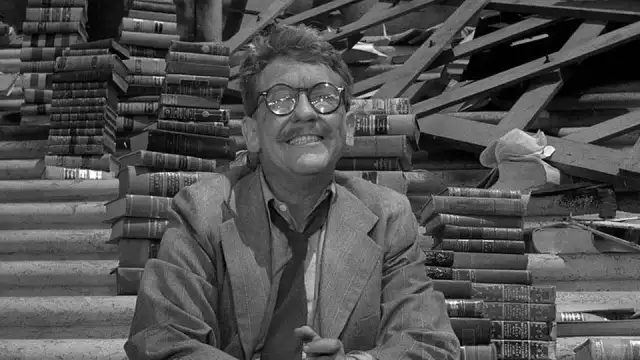
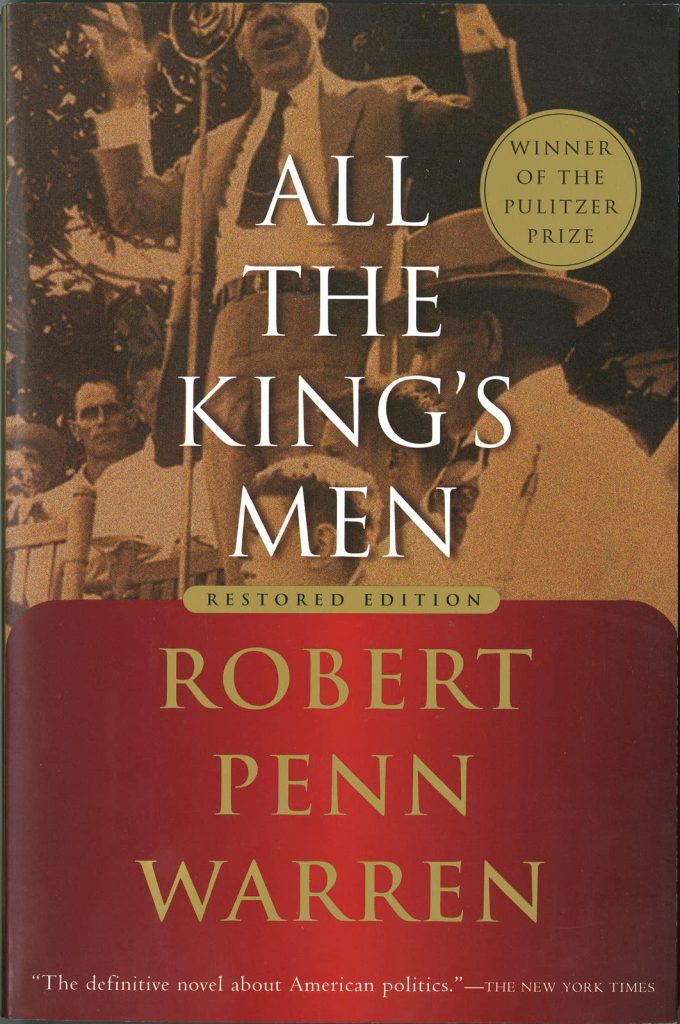
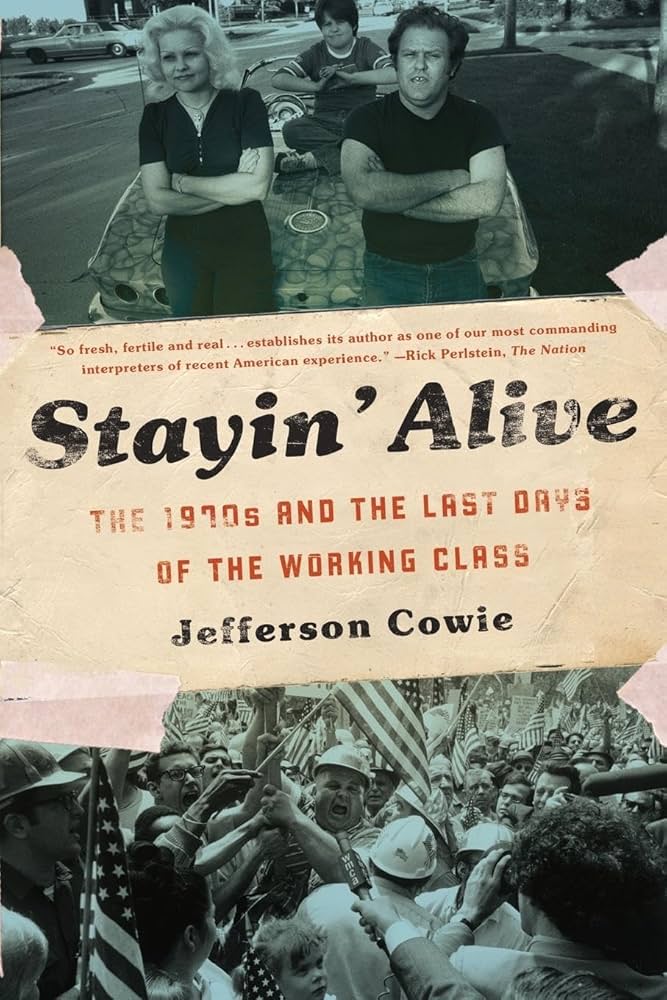
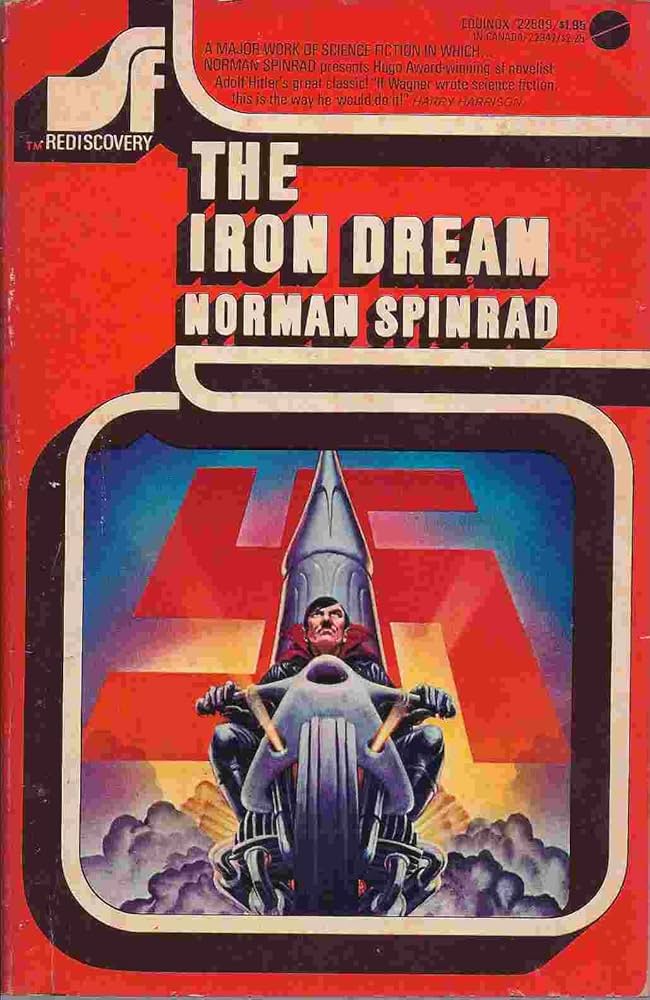


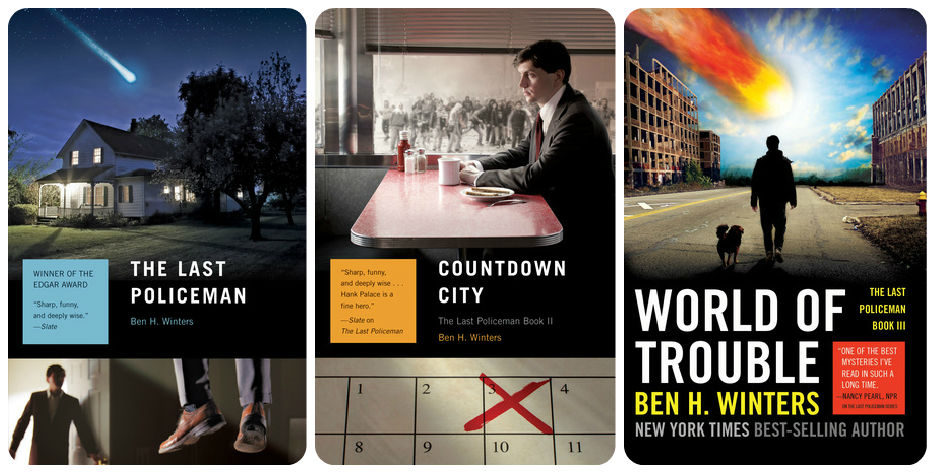


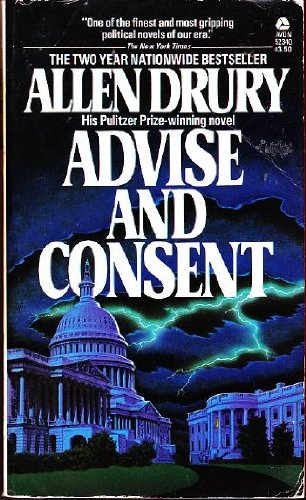
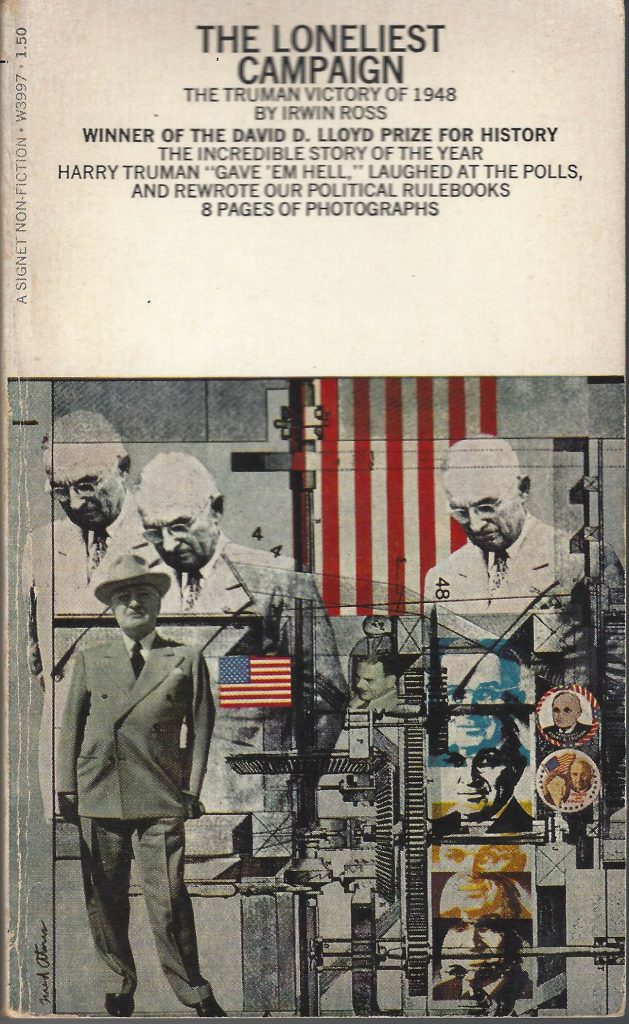



Recent comments